




Before you is the second issue of Eidos, the magazine of the European Identity and Democracy Party.
You will read an extensive interview with Geert Wilders, who needs no further introduction. I can, however, proudly announce that we can welcome Geert Wilders and the PVV as new members of our ID Party. According to the latest polls, the PVV might well become the largest party in the country (again) in the Netherlands.
Geert does not mince his words and has sacri ced a lot, not least in his private life. reats by Muslims mean that he has been living under strict police surveillance for decades. e recent assassination attempt on Salman Rushdie illustrates that this is not an unnecessary measure, but it remains a superhuman ordeal for someone who proclaims nothing more than an uncomfortable truth.
Geert is a long-standing ally, I remember particularly well when we were together in Milan and ‘discovered’ a young Matteo Salvini, then a rising star within the Lega. In the past the PVV was already active within ID Group in the European Parliament, but now PVV is also joining our European Party. In him, we also nd a supporter for a broad patriotic and EU-critical front.
Voor u ligt het tweede nummer van Eidos, het magazine van de Europese Partij Identiteit en Democratie.
U zal verderop een uitgebreid interview lezen met Geert Wilders, wie ik u niet moet voorstellen. Ik kan wel met gepaste trots aankondigen dat we Geert Wilders en de PVV mogen begroeten als nieuw lid van onze ID Partij. De PVV zou volgens de laatste peilingen in Nederland wel eens (opnieuw) de grootste partij van het land kunnen worden.
Geert is iemand die geen blad voor de mond neemt en die veel opgeo erd heeft, niet in het minst in zijn privé leven. Bedreigingen uit islamitische hoek maken dat hij al decennia onder strenge politiebewaking moet leven. De recente moordpoging op Salman Rushdie illustreert dat dit geen overbodige maatregel is, maar het blijft een bovenmenselijke beproeving voor iemand die niet meer dan een ongemakkelijke waarheid verkondigt.
Geert is een jarenlange bondgenoot, zo herinner ik me bijzonder goed dat we samen in Milaan een jonge Matteo Salvini ‘ontdekten’ als rijzende ster binnen de Lega. De PVV was in het verleden reeds binnen de fractie van ID in het Europees Parlement actief, maar nu wordt PVV ook lid van onze Europese partij. In hem vinden
In his highly acclaimed speech at our last meeting ‘Our Europe’ in Antwerp, Geert Wilders referred to his allies as “all brave ghters with guts and common sense” and as “winners with guts and authority who always put the interests of their own country and people rst”. Each in their own country engage in political struggle against everyone else, “because we are not like the other politically-correct politicians”, he added.
Judit Varga, Hungarian minister of Justice, whom we were privileged to welcome to Antwerp on behalf of her party Fidesz, may undoubtedly be counted as one such ghter with guts and common sense. Her address invited us to look at what unites us rather than what divides us. In the ‘Antwerp Declaration’, supported by our partners, I wanted to underline what unites us in our ght against the EU behemoth.
e ‘Antwerp Declaration’ ends with a call for intense cooperation between all patriotic and conservative forces in view of the European elections in 2024. I see it as my task and duty to continue working on this.
Gerolf Annemans Chairman Identity and Democracy Partywe ook een medestander voor een brede patriottische en EU-kritische frontvorming.
In zijn felgesmaakte toespraak op onze laatste meeting ‘Ons Europa’ in Antwerpen betitelde Geert Wilders zijn medestanders als “allemaal dappere strijders met lef en gezond verstand” en als “winnaars met lef en gezag die de belangen van hun eigen land en volk altijd op de eerste plaats zetten”. Elk in eigen land gaan de politieke strijd aan, tegen iedereen in, “want wij zijn niet als de andere politiek-correcte politici”, voegde hij er aan toe.
Zo’n strijder met lef en gezond verstand is ongetwijfeld ook de Hongaarse minister Judit Varga die we namens haar partij Fidesz mochten verwelkomen in Antwerpen. Zij gaf ons de boodschap om te kijken naar wat ons samenbrengt in plaats van wat ons verdeelt. In de ‘Verklaring van Antwerpen’ heb ik samen met de partners willen aangeven wat ons bindt in onze strijd tegen de EU-moloch.
De ‘Verklaring van Antwerpen’ eindigt met een oproep tot een intense samenwerking tussen alle patriottische en conservatieve krachten met het oog op de Europese verkiezingen van 2024. Ik zie het als mijn taak en plicht om daar verder aan te werken.
Gerolf Annemans Voorzitter Partij Identiteit en Democratie
28 Transnationale lijsten: burgers, maak u klaar om te stemmen op vertegenwoordigers die u niet kent!
Transnational lists: citizens, be prepared to vote for representatives you know nothing about!
30 Conferentie over de toekomst van Europa: de democratische ‘hold-up’ van de federalisten Conference on the Future of Europe: the federalists stage a democratic hold-up
38 DOSSIER: De grote Europese politieke omwenteling
Verkiezingen in Frankrijk: Rassemblement National, grootste oppositiepartij
Verkiezingen in Italië: een patriottische revolutie
Verkiezingen in Zweden: rechts, dé grote winnaar
SPECIAL REPORT: e great political upheaval in Europe
Elections in France: Rassemblement National, the leading opposition party
Elections in Italy: a patriotic revolution


Elections in Sweden: the right-wing prevails

48 De FPÖ, een partij die de tijd overstijgt
e FPÖ - a party standing the test of time


54 Een land in de schijnwerpers: Portugal
Portugal, a country in the spotlight
60 Antwerpen, Europese hoofdstad van patriottisme
Antwerp, the European capital of patriotism
102 Jeugd aan de macht: met de jeugd van de ID Partij is de opvolging verzekerd
Youth in power: the succession is assured thanks to young ID party members
113 Conferentie in Tallinn: met haar soft power is China van plan de wereld te domineren
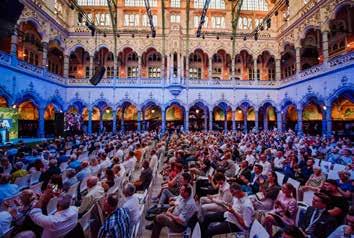
Conference in Tallinn: China aims to dominate the world through soft power
114 Bijeenkomst van de Franse delegatie in Montpellier: de Europese Unie, van federalisme naar imperialisme?

e French delegation returns to Parliament in Montpellier: the European Union, from federalism to imperialism?
122 Is de energiecrisis een Europees probleem?
e energy crisis - a European problem?
34 Geert Wilders
e big interview: Geert Wilders

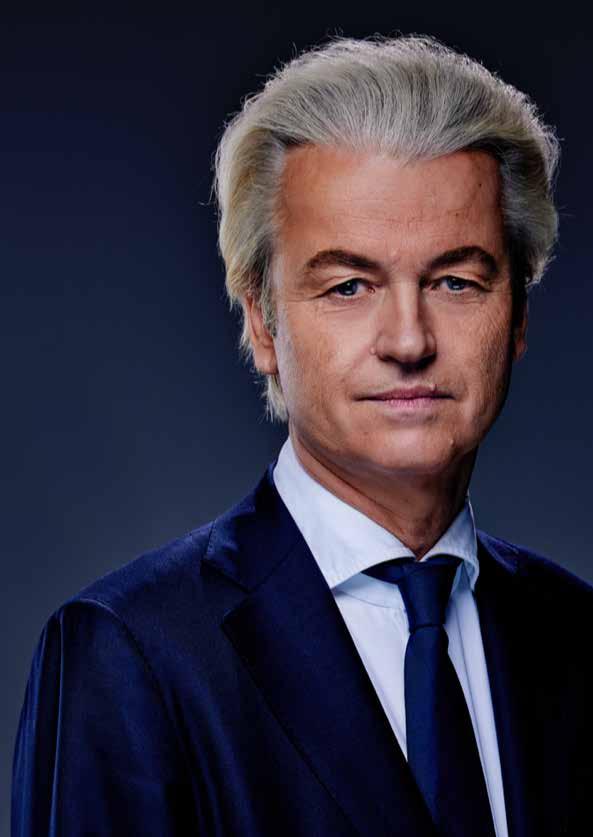

Geert Wilders, you are the worthy heir of a country with a rich history, especially during the Golden Age, when it was a trading power and shone with art and culture. What are the important things that the Netherlands has contributed to the world?
e Netherlands has a very rich history, a past to be proud of. In the Golden Age, we were one of the most powerful countries in the world; we sailed the seas of the world and traded with everyone. Our political and military power was immense, and we were also leaders in trade, art and science. To a large extent, the present
Eidos: Geert Wilders, U bent de waardige erfgenaam van een land met een rijke geschiedenis, vooral tijdens de Gouden Eeuw, toen het een handelsmacht was en schitterde door de kunst en cultuur. Wat zijn de belangrijke elementen die Nederland in de geschiedenis van de wereld heeft gebracht?
Nederland heeft een zeer rijke geschiedenis, een verleden om trots op te zijn. In de Gouden Eeuw waren we één van de machtigste landen ter wereld; we bevoeren de wereldzeeën en dreven met iedereen handel. Onze politieke en militaire macht was groot, en daarnaast waren we ook toonaan-
Geert Wilders: “A democracy needs a strong nation state, its own cultural identity and full national sovereignty”
day has its roots in this period; everyone knows a few famous Dutch masters and heroes who tamed the seas. e inventions of that time still in uence our daily lives. I am proud of our history and always will be. No matter how vehemently the opponents try to dishonour, sully and forget our history, it does not change anything. It is an unprecedented shame that the Dutch Prime Minister, Mr Rutte, recently apologised for the history of slavery when not a single perpetrator or victim is still alive, and that conveniently not a word was said about Africans and Muslims, who centuries ago were the greatest slavers of their time and of whom millions of white and Christian Europeans were victims.
e Netherlands has had the same Prime Minister since 2010: what is your opinion of Mark Rutte’s policy? And, in general, how would you describe the current situation in your country?
Prime Minister Rutte is a political charlatan. He is completely destroying the Netherlands. He is more concerned about Ukraine than his own country. He is implementing the destructive policies of Sigrid Kaag of D66, from open borders to tens of billions spent on climate and nitrogen policies. Our country is in a period of one slip-up after another. We are going from crisis to crisis. e crisis of purchasing power is felt more violently in our country than in most other European countries. In ation is at an all-time high and we are groaning under the misery caused by mass
gevend in de handel, de kunst en de wetenschap. De huidige tijd heeft voor een groot deel wortels in deze periode, iedereen kent wel enkele befaamde Hollandse meesters en zeehelden. Uitvindingen die destijds zijn gedaan beïnvloeden nog altijd ons dagelijks leven. Ik ben trots op onze geschiedenis en ik zal dat altijd blijven. Hoe fel tegenstanders ook proberen onze geschiedenis te onteren, te besmeuren en te doen vergeten doet daar helemaal niets aan af. Het is ongekende schande dat de Nederlandse woke-premier Rutte onlangs excuses aanbood voor het slavernijverleden terwijl geen dader of slachto er nog in leven is en er gemakshalve met geen woord gerept werd over Afrikanen en moslims die eeuwen geleden de grootste slavendrijvers van hun tijd waren en waar miljoenen blanke, christelijke Europeanen slachto er van zijn geweest.
Nederland heeft sinds 2010 dezelfde man als minister-president: wat is uw mening over het beleid van Mark Rutte? En, in het algemeen, hoe zou u de huidige situatie in uw land omschrijven?
Premier Rutte is een politieke charlatan. Hij maakt Nederland helemaal kapot. Hij is meer met Oekraïne dan met zijn eigen land bezig. Hij voert het vernietigende beleid van Sigrid Kaag van D66 uit van open grenzen tot tientallen miljarden voor klimaaten stikstofbeleid. Ons land glijdt in rap tempo af; we gaan van crisis naar crisis. De koopkrachtcrisis voelen we in ons land heftiger dan op de meeste plekken elders in Europa. De in a-
immigration and the asylum tsunami. e Netherlands is breaking immigration record after immigration record, and the cabinet led by Prime Minister Rutte is content to watch. He likes to be received with all the honours by heads of state in foreign capitals, his ego knows no bounds, but he has completely lost sight of the problems of the Dutch people on the street. He is totally detached from the reality of the average Dutch citizen. As a result, trust in the government is historically low, with only 19% of Dutch people still trusting Rutte and his cabinet. And this is understandable. Millions of Dutch people nd themselves in the situation where they have been able to buy less and less at the supermarket in recent months, have had to forego medical treatment because it is too expensive and do not know how to pay the energy bill. At the same time, asylum seekers in the Netherlands receive massive amounts of free health care, free allowances, free housing, free food, free heating, everything is free for them. is is a sick and deadly policy. With this government, it is not the Dutch rst, but the asylum seekers rst.
To what extent has mass immigration already changed the Netherlands? And do you think we can still reverse the course of migration or is it already too late?
Mass immigration has transformed the Netherlands beyond recognition in recent decades. Large parts of our cities look more like Ankara, Rabat or Riyadh than a Dutch city. In our three
tie is torenhoog en we zuchten onder alle ellende die de massa-immigratie en asieltsunami met zich meebrengt. Nederland breekt immigratierecord na immigratierecord, en het kabinet onder leiding van premier Rutte staat erbij en kijkt ernaar. Rutte loopt duidelijk op zijn laatste poilitieke benen. Hij laat zich graag met alle egards ontvangen door staatshoofden in buitenlandse hoofdsteden, zijn ego rijkt tot de planeet Pluto, maar hij heeft totaal geen oog meer voor de problemen van de gewone Nederlander. Hij is totaal losgezongen van de werkelijkheid van de gewone man en vrouw in Nederland. Het vertrouwen in de regering is dan ook historisch laag, slechts 19 procent van de Nederlanders vertrouwt Rutte en zijn kabinet nog maar. En dat is begrijpelijk. Miljoenen Nederlanders konden de afgelopen maanden steeds minder kon kopen in de supermarkt, moesten medische behandelingen overslaan omdat ze te duur zijn en hebben geen idee hoe ze de energierekening moeten ophoesten. Tegelijkertijd krijgen asielzoekers in Nederland massaal gratis zorg, gratis uitkeringen, gratis woningen, gratis eten, gratis verwarming, alles is gratis voor ze. Het is doodzieke politiek. Het is niet Nederlanders eerst maar asielzoekers eerst bij dit kabinet.
In hoeverre heeft massa-immigratie Nederland al veranderd? En denk je dat we de gang van zaken op het gebied van migratie nog kunnen omkeren of is het al te laat?
De massa-immigratie heeft Nederland de afgelopen decennia onherkenbaar veranderd. Grote delen van onze ste-
Geert
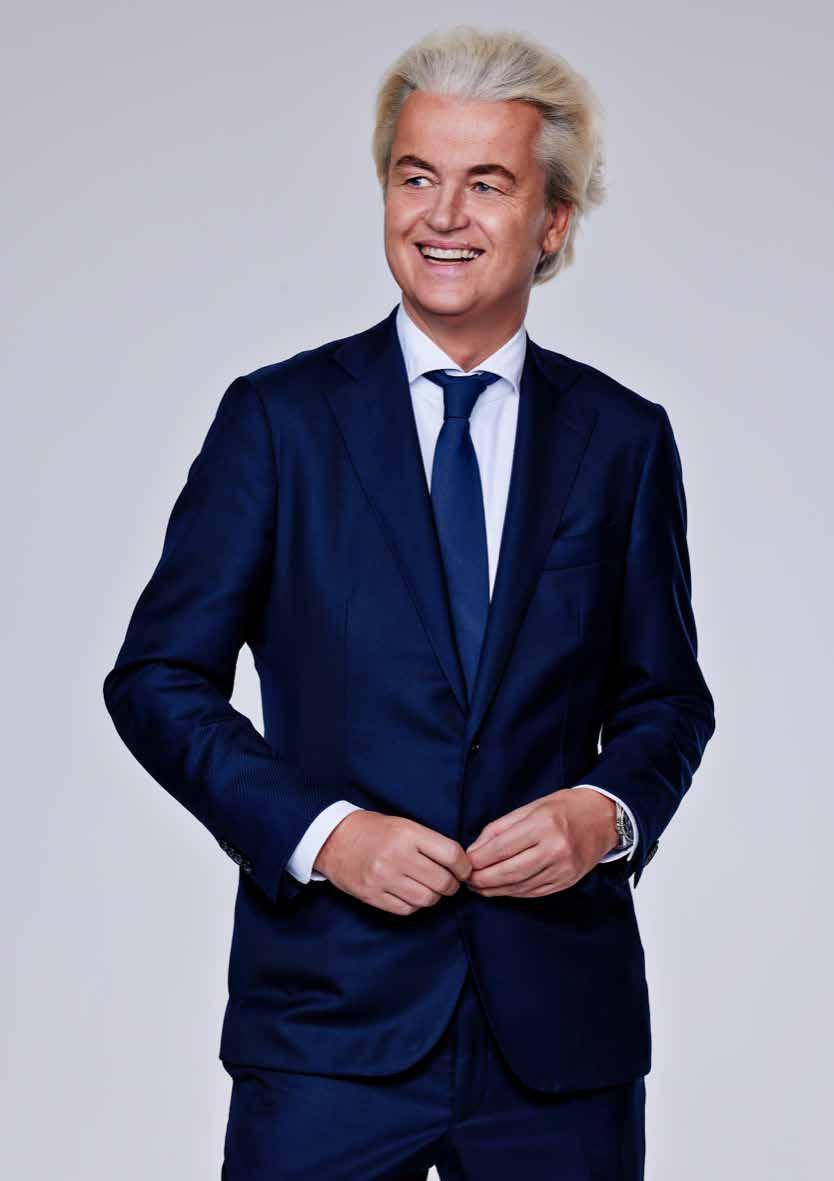
largest cities, Amsterdam, Rotterdam and e Hague, ethnic Dutch are already a minority. Many Dutch people already feel like outsiders in their own streets, neighbourhoods, villages and cities. I want us to be able to have our own immigration policy again, I want the Royal Military Police to be able to monitor our borders again and prevent asylum seekers from entering our country. After all, our two neighbours, Germany and Belgium, are safe countries and the people who come to the Netherlands from these countries are not asylum seekers but migrants. So get rid of them. As far as I’m concerned, they won’t come back. Our country is full, full to bursting, so close those borders! e time for patches is over.
We know you are ghting the spread of Islamism: do you think Islam is compatible with European values?
Islamism? My political ght is not against Islamism but against Islam. Islam is a violent totalitarian ideology, which seeks to control and dominate both society and people’s personal lives, not shying away from violence. It is determined to dominate the world and, as you know, leaving Islam is punishable by death. All this is pure totalitarianism. And don’t forget that the so-called prophet Mohammed, who is still held up as an example to over a billion Muslims around the world, slaughtered legions of people, including entire Jewish tribes, and also had sex with 9-year-old Aisha. What kind of criminal and perverted example is that?
den lijken meer op Ankara, Rabat of Riyad dan op een Nederlandse stad. In onze drie grootste steden Amsterdam, Rotterdam en Den Haag zijn autochtone Nederlanders inmiddels al in de minderheid. Veel Nederlanders voelen zich nu al vreemden in hun eigen straat, wijk, dorp en stad. Ik wil dat we weer een eigen immigratiebeleid kunnen voeren; dat we de Koninklijke Marechaussee (militaire politie) weer onze grenzen laten bewaken en asielzoekers uit ons land weren. Onze beide buurlanden Duitsland en België zijn immers allebei veilige landen en mensen die vanuit die landen naar Nederland komen zijn dus geen asielzoekers maar migranten. Wegwezen dus. Ze komen er wat mij betreft niet meer in. Ons land is vol, bomvol, dus dicht die grenzen! De tijd van pappen en nathouden is voorbij.
We weten dat u tegen de verspreiding van het islamisme strijdt: denkt u dat de islam compatibel is met de Europese waarden?
Islamisme? Mijn politieke strijd is niet tegen het islamisme maar tegen de islam.
De islam is een gewelddadige totalitaire ideologie, die zowel de maatschappij als het persoonlijke leven van mensen wil beheersen en controleren en daarbij geweld niet schuwt. Ze is uit is op werelddominantie en zoals u weet staat op het verlaten van de islam de doodstraf. Dat alles is zuiver totalitair. En vergeet niet dat de zogenaamde profeet Mohammed die nog steeds als hét goede voorbeeld geldt voor meer dan een miljard moslims wereldwijd,
And don’t forget that research shows that the Koran contains more anti-Semitism than Mein Kampf. So that’s what we’re dealing with, this ideology of hate, intolerance and violence. Islam and freedom are incompatible. e Islamic ideology does not belong to the Netherlands, nor to Europe, nor to the free West. We have struggled for centuries to build a European civilisation whose values are based on the three pillars of Judaism, Christianity and humanism. We choose reason and freedom, not violence and unfreedom. We choose the separation of church and state and freedom of expression. All this is in contradiction with the intolerance of Islam.
Various studies, such as the one by Professor Koopmans, for example, clearly show that a substantial majority of Muslims in Europe place the rules of Islam above the rules of the country itself. Also in the Netherlands. So a majority of Muslims in the Netherlands actually say that they consider Sharia law more important than our secular democratic laws. is is unacceptable. Islamic ideology and the Islamisation of our societies are an existential problem for the free West.
In 2002, Pim Fortuyn was murdered in the Netherlands. is event traumatised the whole country. You yourself receive threats. Is it dangerous to think freely in the Netherlands?
I have been under 24-hour surveillance since October 2004 and I can-
legio mensen waaronder hele joodse stammen heeft afgeslacht ook seks had met de 9-jarige Aisha. Wat voor crimineel, pervers voorbeeld is dat?
En vergeet niet, uit onderzoek blijkt dat in de Koran meer antisemitisme staat dan in Mein Kampf. Daar hebben we dus mee te maken, met die ideologie van haat, intolerantie en geweld. Islam en vrijheid zijn onverenigbaar. De islamitische ideologie hoort niet bij Nederland noch bij Europa of het vrije Westen. We hebben eeuwen gestreden om een Europese beschaving op te bouwen met waarden gebaseerd op de drie pijlers van het Jodendom, het christendom en het humanisme. Wij kiezen voor rede en vrijheid en niet voor geweld en onvrijheid. Wij kiezen voor een scheiding van kerk en staat en vrijheid van meningsuiting. Dat alles staat op gespannen voet met de intolerantie van de islam.
Uit verschillende onderzoeken, zoals bijvoorbeeld van professor Koopmans, komt duidelijk naar voren dat een forse meerderheid van de moslims in Europa de regels van de islam boven de regels van het land zelf plaatst. Ook in Nederland. Een meerderheid van de moslims in Nederland zegt dus eigenlijk dat ze de sharia belangrijker vindt dan onze seculiere democratische wetten. Dat is onaanvaardbaar. De islamitische ideologie en de islamisering van onze samenlevingen is een existentieel probleem voor het vrije Westen.
In 2002 werd Pim Fortuyn vermoord in Nederland. Deze gebeurtenis had het hele land getraumatiseerd. U
not take a step outside without personal security guards. I have been and still am on several hit lists, including those of al-Qaeda, ISIS and the Pakistani Taliban, and several fatwas have been issued against me in recent years. Even one in which a Pakistani mullah called on Dutch Muslims to kill me in my own home. Last year I complained a thousand times to the police about death threats. But the judiciary does so little with them that I plan to stop ling reports this year. When Prime Minister Rutte or Deputy Prime Minister Kaag are threatened, the Ministry of Justice - rightly - works to prosecute the perpetrators, but in my case it is passive and seems to put up with all these death threats.
ere is a lot of pressure on freedom of expression, and things do not seem to be moving in the right direction in this respect. I have been prosecuted several times in the Netherlands in the past for what I have said, but Iran, Jordan, Saudi Arabia and other Islamic countries have also threatened to prosecute me before, and the former president of Indonesia has declared me persona non grata for the rest of my life. It is a legal jihad against anyone who speaks critically of Islam or the false prophet Mohammed.
But they don’t just want to silence criticism of Islam. In our national parliament, opposition parliamentarians who say something that the powers that be don’t like are increasingly having the microphone cut o ey have appointed the Speaker of the House by a sleight of hand worthy of corrupt politicians, so that he
krijgt zelf bedreigingen. Is het gevaarlijk om vrij te denken in Nederland?
Ik word al sinds oktober 2004 rond de klok bewaakt en kan geen stap buiten de deur zetten zonder persoonsbeveiligers. Ik stond en sta op verschillende dodenlijsten, waaronder van Al-Qaeda, ISIS en de Pakistaanse Taliban en heb de afgelopen jaren verschillende fatwa’s over me afgeroepen gekregen. Zelfs een waarin een Pakistaanse mullah Nederlandse moslims oproept me te vermoorden in mijn huis. Ik heb vorig jaar zo’n duizend keer aangifte gedaan bij de politie wegens doodsbedreigingen. Maar justitie doet daar zo weinig mee dat ik dit jaar overweeg maar geen aangifte meer te doe.. Als premier Rutte of vice-premier Kaag bedreigd worden is Justitie – terechtzeer actief om de daders te vervolgen, maar bij mij zijn ze passief en lijken ze het wel goed te vinden al die doodsbedreigingen.
De vrijheid van meningsuiting staat zwaar onder druk, en het lijkt wat dat betreft niet de goede kant op te gaan. Ik ben in Nederland in het verleden al een aantal keren voor de rechter gedaagd om wat ik zei maar ook Iran, Jordanië, Saoedi-Arabië en andere islamitische landen hebben me eerder gedreigd te vervolgen en de voormalige Indonesische President heeft me voor mijn hele leven persona non grata verklaard. Het is een juridische jihad. Voor iedereen die zich krtitisch uitlaat over de islam of de nepprofeet Mohammed. Maar niet alleen islamcritici proberen ze de mond te snoeren. In ons nationale parlement wordt
dances to the tune of the coalition.
But I have news for all those who want to silence me in any way, governments, mullahs, terrorists and courts: I will never give up. I will never be silent, but I will continue to speak the truth and always defend our freedom and the interests of the Dutch people. is will only make me stronger.
So you can see that there is a problem with freedom of speech for patriotic politicians in the Netherlands and in Europe. But how are you treated by the press?

e press in the Netherlands - as in many Western countries - is ninety per cent left-wing. ey abhor parties like mine and love the current
steeds vaker de microfoon uitgezet bij parlementariërs van de oppositie die iets zeggen wat de zittende macht niet zint. Ze hebben onze Kamervoorzitter met corrupt politiek handjeklap benoemd, dus die danst wel naar de pijpen van de coalitie.
Maar ik heb nieuws voor allen die mij op welke manier dan ook het zwijgen willen opleggen, regeringen, mullahs, terroristen en rechtbanken: ik geef nooit op. Ik zal nooit zwijgen, maar de waarheid blijven spreken en altijd blijven opkomen voor onze vrijheid en voor de belangen van Nederlanders. Ik word er alleen maar sterker van.
In het algemeen is er een probleem van vrijheid van meningsuiting voor patriottische politici in Nederland
government. ey are weak, cowardly and totally unreliable. And then, as soon as a new public broadcaster like Ongehoord Nederland appears in the Dutch public system, it is unfairly torpedoed and sanctioned by the vassals of Sigrid Kaag and Mark Rutte. O cially, we have a free press in the Netherlands, but in practice it is a left-wing cabinet clapping machine. Useless and irritating. I haven’t watched Dutch television for almost two decades.
In the last two years, freedoms have been curtailed a bit more by the Covid crisis. What do you think ‘freedom’ should mean?
It is true what you say, Covid has indeed led to a sharp reduction in freedoms for all of us. It is shocking to see how easily governments, in the Netherlands but also in the rest of Europe, have decided to set aside the most basic fundamental rights of citizens. ink, for example, of the introduction of curfews, compulsory entry tickets and the closure of businesses such as the hotel industry during lockdowns.
Freedom is the most important thing there is. e ability to organise life as citizens wish is a birthright. Government should be viewed with inherent distrust, because power corrupts. e political party I founded many years ago carries the word ‘freedom’ for a reason.
It seems self-evident, but only when your own freedom is restricted do you discover what you are missing.
en in Europa? Hoe word U bijvoorbeeld door de pers behandeld?
De pers in Nederland is – zoals in vele Westerse landen - voor negentig procent links georiënteerd. Ze gruwen van partijen als de mijne en adoreren de zittende macht. Ze zijn zwak, laf en totaal onbetrouwbaar. En als er dan een keer een nieuwe publieke omroep komt zoals Ongehoord Nederland binnen het Nederlandse publieke bestel, dan worden die ten onrechte verketterd en gesanctioneerd door de vazallen van de door hen bewierookte Sigrid Kaag en Mark Rutte. Formeel hebben we een vrije pers in Nederland, maar materieel is het een linkse applausmachine van het kabinet. Nutteloos en irritant. Ik kijk al bijna twintig jaar niet meer naar de Nederlandse televisie.
De afgelopen twee jaar zijn de vrijheden door de Covid-crisis iets meer ingeperkt. Wat moet «vrijheid» betekenen volgens U?
Het klopt wat u zegt, covid heeft inderdaad geleid tot forse inperking van de vrijheden van ons allemaal. Het is schokkend hoe makkelijk regeringen, in Nederland maar ook in de rest van Europa, zo makkelijk besloten tot het buitenspel zetten van de meest basale grondrechten van de bevolking. Denk bijvoorbeeld aan het invoeren van een avondklok, verplichte toegangsbewijzen en het sluiten van bedrijven als de horeca in lockdowns.
Vrijheid is het allerbelangrijkste wat er is. De mogelijkheid om het leven in te richten zoals burgers dat zelf wen-
Unfortunately I know what I am talking about.
In recent weeks, Dutch farmers have expressed their dissatisfaction with a plan to reduce their livestock numbers. What was your reaction to this measure?
e farmers are 100% right! e cabinet’s plans are a serious threat to the survival of the Dutch agricultural sector. And for that matter also for our shermen! Because of a non-existent nitrogen problem, our rm is now cutting o the heads of our farmers. We have a world-renowned sector that is constantly innovating and is at the top of the world. Which provides our food supply. Not only is the gov-
sen is een geboorterecht. De overheid moet van nature gewantrouwd worden, want macht corrumpeert. De politieke partij die ik inmiddels al weer heel wat jaren geleden heb opgericht heeft niet voor niets het woord “Vrijheid” in zich.
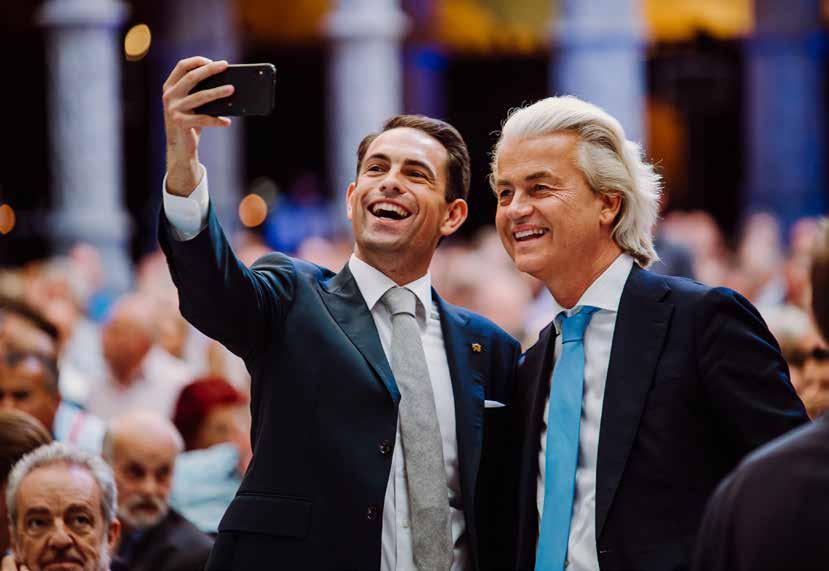
Het lijkt een vanzelfsprekendheid, maar zodra je eigen vrijheid wordt beknot kom je er pas echter achter wat je mist. Ik weet helaas waarover ik spreek.
Nederlandse boeren hebben de afgelopen weken hun ongenoegen geuit over een plan om hun veestapel te verkleinen. Wat was uw reactie op deze maatregel?
ernment taking away a thriving economic sector, it is also destroying the lives of tens of thousands of farmers and their families. Now they are going to buy out farmers voluntarily, but at the end of the day our agricultural stock has been reduced to a minimum and that is a historically bad policy. Together with other parties, I am trying to prevent this at all costs. Few things are more Dutch than our farmers. We must defend them. We have to be proud of them.
How should the patriotic parties, of which the PVV is a part, position themselves in the face of the consequences of climate change?
e Netherlands, perhaps even more than other European countries, spends surprisingly a lot on so-called climate measures. Tens of billions of euros will be spent on them in the coming years, even though man’s inuence on the climate is very small.
e Dutch CO2 emissions are therefore only a drop in the ocean of total global emissions. It is therefore totally absurd to spend so much money on something that we can hardly inuence and that will have virtually no e ect. If you want to do something, then raise the dykes and make sure our rivers have more space to safely drain away water during oods. at makes sense. But spending tens of billions on nonsensical climate measures that are una ordable for normal people and will make life even more expensive is mismanagement that stems from a liberal left-wing utopia.
e government is putting ideology before people. I say: rst make sure
De boeren hebben voor 100% gelijk! De plannen van het kabinet zorgen voor een ernstige bedreiging in het voortbestaan van de Nederlandse agrarische sector. En trouwens ook voor onze vissers! Vanwege een niet bestaand stikstofprobleem hakt ons kabinet onze boeren nu de kop eraf. We hebben een wereldberoemde sector, die voortdurend innoveert en tot de absolute top van de wereld behoort. Die voor onze voedselvoorziening zorgt. De regering zet niet alleen het mes in een goedlopende economische sector, maar maakt daarnaast de levens van tienduizenden boeren en hun gezinnen kapot. Nu gaan ze boeren vrijwillig uitkopen maar aan het einde van de dag is onze boerenstand geminimaliseerd en dat is historisch fout beleid. Ik probeer dit samen met andere partijen koste wat kost te voorkomen. Weinig is Hollandser dan onze boeren. We moeten pal voor ze gaan staan. Trots op ze zijn!
Hoe moeten de patriottische partijen, waarvan de PVV deel uitmaakt, zich positioneren tegenover de gevolgen van klimaatverandering?
Nederland geeft, misschien nog wel meer dan andere landen in Europa, bizar veel geld uit aan zogenaamde klimaatmaatregelen. Tientallen miljarden euro’s worden de komende jaren eraan uitgegeven, terwijl de invloed van de mens op het klimaat heel erg klein is. De Nederlandse uitstoot van CO2 is dan ook slechts een druppel op de plaat van de totale uitstoot in de wereld. Het is dus totale onzin om zoveel geld uit te geven aan iets waar we nauwelijks invloed op hebben en

our citizens can pay for their groceries and heat their homes without going broke. Spend your tax money on that! When my party has the upper hand, we will scrap the one hundred billion euros currently spent on climate policy and nitrogen policy and give that money back to the Dutch people in the form of lower taxes and investment in health care, for example.
Geert Wilders, are you still in favour of the Netherlands leaving the European Union?
I am convinced that a democracy needs a strong nation state, its own cultural identity and full national sovereignty. We must be masters of our own money, our own borders and our own laws. e EU makes all this impossible, it has turned the EU and the Eurozone into a transfer union where our money disappears into the weak and corrupt countries of Southern Europe. It limits our autonomy over our immigration and asylum policy and we are now bound by all the EU directives and rules that tell us what to do. And most of the laws come from the EU and not from our own country. EU leaders are also taking away more and more veto rights from member states. e EU started in the late 1950s as the EEC, an economic community. e Netherlands was a founding member of this EEC. Unfortunately, this economic union has now degenerated into a political union that has taken over the power of the member states. Don’t get me wrong, I am very much in favour of international cooperation, also with-
wat nauwelijks e ect zal hebben. Als je al wat wil doen dan verhoog de dijken en zorg dat onze rivieren meer ruimte krijgen om het water veilig af te voeren bij overstromingen. Dat is zinvol. Maar tientallen miljarden besteden aan onzinnige klimaatmaatregelen die voor normale mensen onbetaalbaar zijn en het leven nog duurder zullen maken is onzinnig utopisch links-liberaal wanbeleid. De regering zet ideologie boven mensen. Ik zeg: zorg er eerst maar eens voor dat onze burgers hun boodschappen kunnen betalen en hun huis kunnen verwarmen zonder failliet te gaan zou ik zeggen. Besteed daat het belastinggeld maar aan! Wanneer mijn partij het voor het zeggen krijgt, scha en we de honderd miljard euro die nu in de boeken staan voor klimaat- en stikstofbeleid af en geven dat geld terug aan de Nederlanders in de vorm van lagere belastingen en investeringen in bijvoorbeeld de zorg.
Geert Wilders, bent u er nog steeds voor dat Nederland uit de Europese Unie stapt?
Ik ben er heilig van overtuigd: een democratie heeft een sterke natiestaat nodig, een eigen culturele identiteit en volledige nationale soevereiniteit. We moeten de baas zijn over ons eigen geld, onze eigen grenzen en onze eigen wetten. De EU maakt dat allemaal onmogelijk, ze hebben van de EU en Eurozone een transferunie gemaakt waar ons geld naar zwakke en corrupte landen in Zuid-Europa verdwijnt. Ze beperken onze autonomie als het gaat om ons immigratie- en asielbeleid waar we inmiddels gebonden zijn aan allemaal Europese richtlijnen
in Europe, in areas where countries see an added value, but on a voluntary basis. You don’t need a political union and therefore no EU for that. What you need are strong, proud and sovereign nation states. And yes, of course, any reform of the EU is also a gain if it leads to less power for Brussels and more power for the member states. But a Europe without political union and without the EU remains the best solution.
en regels die zeggen wat we moeten doen. En de meeste wetten komen van de EU en niet meer uit ons eigen land. Daarnaast pakken ze de lidstaten steeds meer veto-rechten af. De EU begon eind vijftiger jaren van de vorige eeuw als EEG, een economische gemeenschap. Nederland was een van de oprichters van die EEG. Helaas is die economische unie inmiddels verworden tot een politieke unie die de macht van de lidstaten heeft overgenomen. Bergrijp me niet verkeerd, ik ben erg voor internationale samenwerking, ook binnen Europa, op terreinen waar landen er zelf meerwaarde in zien, maar dan wel op vrijwillige basis. Daar heb je geen politieke unie en dus ook geen EU voor nodig. Wat je nodig hebt is sterke, trotse, soevereine natiestaten, En ja, natuurlijk is iedere hervorming van de EU ook winst als dat leidt tot minder macht voor Brussel en meer macht voor de lidstaten. Maar een Europa zonder politieke unie en zonder EU blijft het allerbeste.
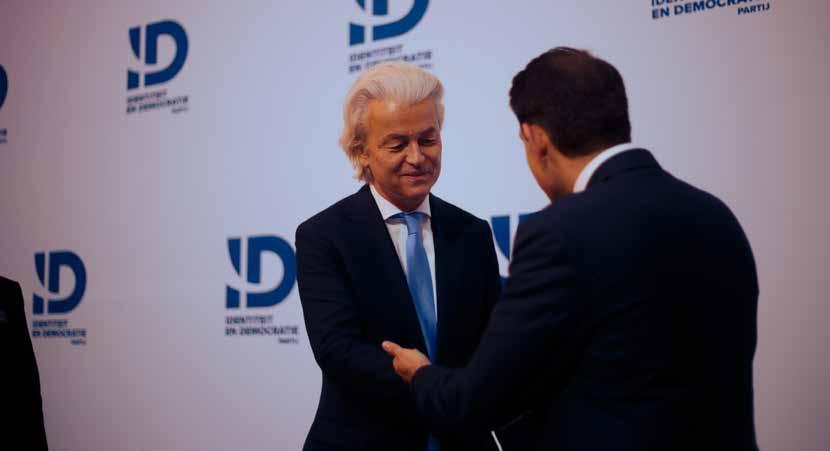
While the political groups determine the number of seats in the European hemicycle, the parties allow certain national formations that are not represented in the European Parliament to be members of a European political family.
Until now, the PVV was not part of the European party, but it is now!
e Partij voor de Vrijheid (PVV, Party for Freedom) was founded in 2006 by Geert Wilders, formerly an MEP for the Volkspartij voor Vrijheid en Democratie (VVD, Party for Freedom and Democracy). In 2004, he turned his back on his party because he disagreed with its policy, in terms of immigration in particular.
He subsequently created Groep Wilders, and later the PVV, a party that remains unique in that it has no members. It obtained 5.9% in his rst elections and 9 seats in the Second Chamber, making it the fth largest political force in the country. Its rise was spectacular and the PVV obtained 17% of the votes in the 2009 European elections, a healthy perfor-
In het Europees Parlement kunnen de Europese parlementsleden een fractie vormen op basis van politieke verwantschap. Daarnaast kunnen nationale politieke partijen in de EU - ook al zijn ze zelfs niet vertegenwoordigd in het Europees Parlement - ervoor kiezen lid te worden van een Europese politieke partij.
Tot nu toe was de PVV geen lid van de Europese partij ID: dat is vanaf nu wel het geval!
De Partij voor de Vrijheid (PVV) werd in 2006 opgericht door Geert Wilders, voorheen Tweede Kamerlid voor de Volkspartij voor Vrijheid en Democratie (VVD). In 2004 keerde hij die partij de rug toe, omdat hij het niet eens was met haar lijn, met name op het vlak van immigratie.
Onmiddellijk daarna creëert hij de Groep Wilders en later de PVV, een partij die geen ledenpartij is. Bij haar eerste verkiezingen behaalt ze meteen
5,9% en 9 zetels in de Tweede Kamer. Hiermee wordt de partij de vijfde politieke kracht van het land. De PVV schiet als een raket omhoog en be-

mance later con rmed in the 2010 legislative elections.
At that time, Queen Beatrix was seriously considering a right-wing coalition that included the PVV, before a VVD-CDA coalition was formed with outside support from the PVV. e party brought down the government, leading to early elections in 2012: votes dropped from 15 to 10%.
e party is now a key player in Dutch politics, gaining 13% of the vote in 2017 and 10.79% in 2021. According to the latest polls, the PVV has 20% of the vote, which puts it ahead of all parties.
e PVV’s political line is marked by the ght against immigration and Islamism, which is corrupting Dutch society (to the point of wanting to ban the Koran and the construction of new mosques in the Netherlands), and by erce criticism of the Dutch political class.
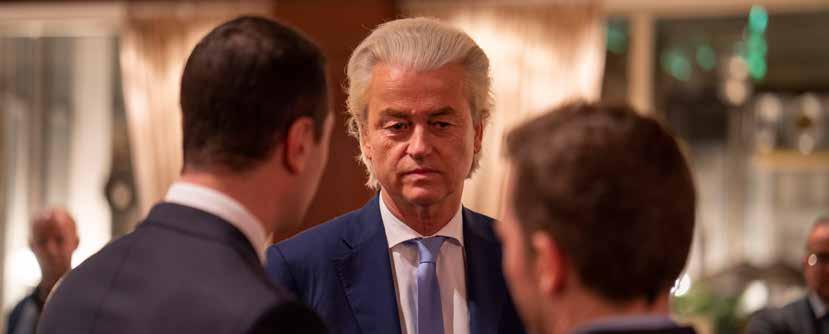
Economically, the party is liberal, wanting to increase pensions after years of stagnation. It has opposed the Paris Climate Agreement and is leaning towards climate sceptic positions.
haalt bij de Europese verkiezingen van 2009 17% van de stemmen, een knappe prestatie die bevestigd wordt bij de parlementsverkiezingen van 2010.
In die periode wordt ernstig een rechtse coalitie met onder meer de PVV overwogen voordat uiteindelijk een VVD-CDA-coalitie met gedoogsteun van de PVV gevormd wordt. De partij zal de regering ten val brengen, wat leidt tot vervroegde verkiezingen in 2012. Die worden echter een ontgoocheling want de formatie zakt van 15% naar 10% van de stemmen.
De partij kreeg nadien af te rekenen met concurrentie op rechts, maar is vandaag opnieuw een belangrijke speler in de Nederlandse politiek, met recente peilingen die doen vermoeden dat de PVV wel eens de regeringspartij VVD als grootste partij naar de kroon kan steken.
De politieke lijn van de PVV wordt gekenmerkt door een strijd tegen immigratie en islamisering, die de Nederlandse samenleving teisteren. De partij ijvert o.a. voor een verbod op de bouw van nieuwe moskeeën in Nederland en een verbod op de Koran. Zij uit ook felle kritiek op de Nederlandse politieke klasse.
e PVV’s position on the European Union places it among the Eurosceptic parties, having fervently supported the exit of the Netherlands from the European Union and the Eurozone, which it calls the Nexit.

Geert Wilders was born on 6 September 1963 and lived in a moshav in Israel for several years. He equates Islam with a fascist ideology, which has led to numerous death threats. In a documentary entitled Fitna, he established the links between Islam and terrorism, and did not hesitate to compare the Koran to Mein Kampf. He faced two lawsuits, one for his documentary and the other for asking his audience if they wanted “more or less Moroccans in their city”.
Op economisch vlak is de partij liberaal en wil ze de pensioenen na jaren van stilstand verhogen. Ze heeft zich verzet tegen het Klimaatakkoord van Parijs en tegen klimaat-hysterie.
De PVV behoort met haar standpunt over de Europese Unie tot de eurosceptische partijen en is een fervent voorstander van het vertrek van Nederland uit de Europese Unie en de eurozone, de zogenaamde ‘Nexit’.
Geert Wilders is geboren op 6 september 1963. Een bijzonderheid is dat hij een paar jaar in Israël in een ‘moshav’ woonde. Hij stelt de islam gelijk met een fascistische ideologie, wat hem tal van doodsbedreigingen heeft opgeleverd. In de documentaire Fitna legt hij verbanden tussen islam en terrorisme en aarzelt hij niet de Koran te vergelijken met ‘Mein Kampf’. Hij krijgt twee rechtszaken aan zijn broek, de ene voor zijn documentaire, de andere nadat hij zijn toehoorders vroeg of ze “meer of minder Marokkanen” in hun stad wilden. Als verdediger van de absolute meningsvrijheid weigert hij een blad voor de mond te nemen, wat hem veel sympathie oplevert bij de gewone Nederlander.
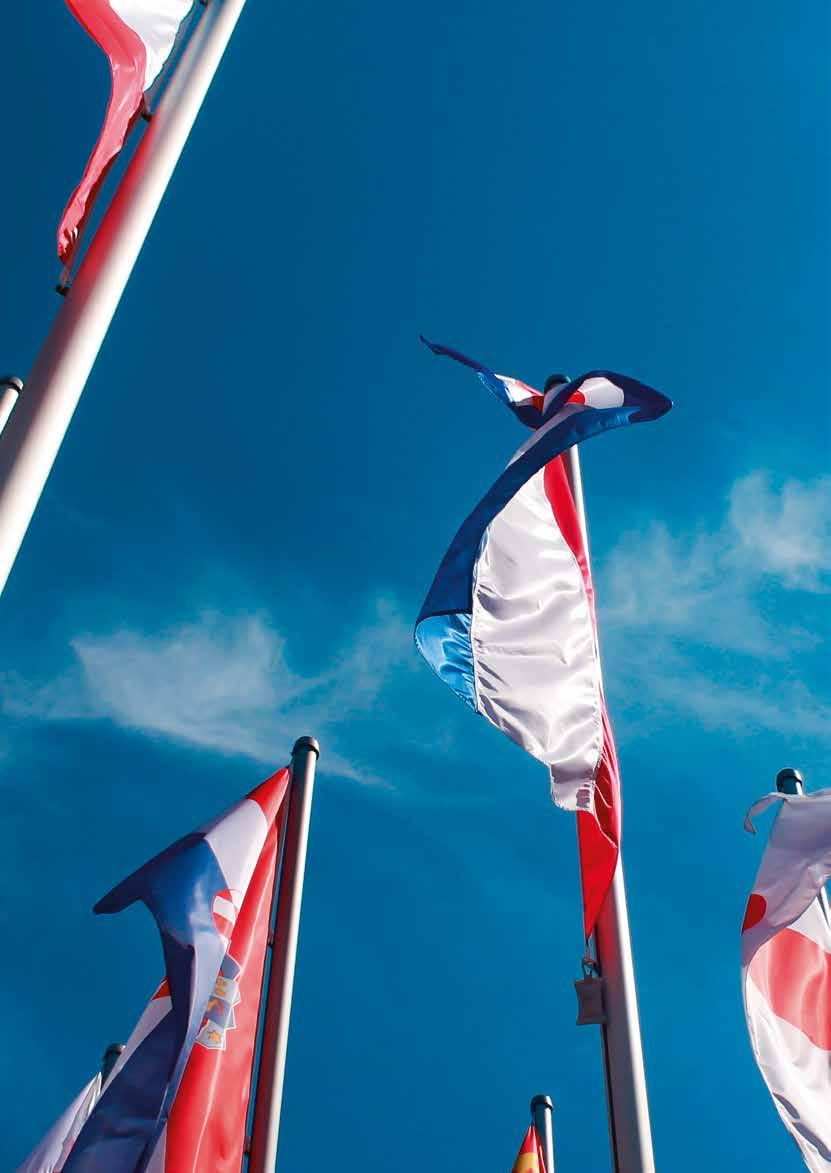
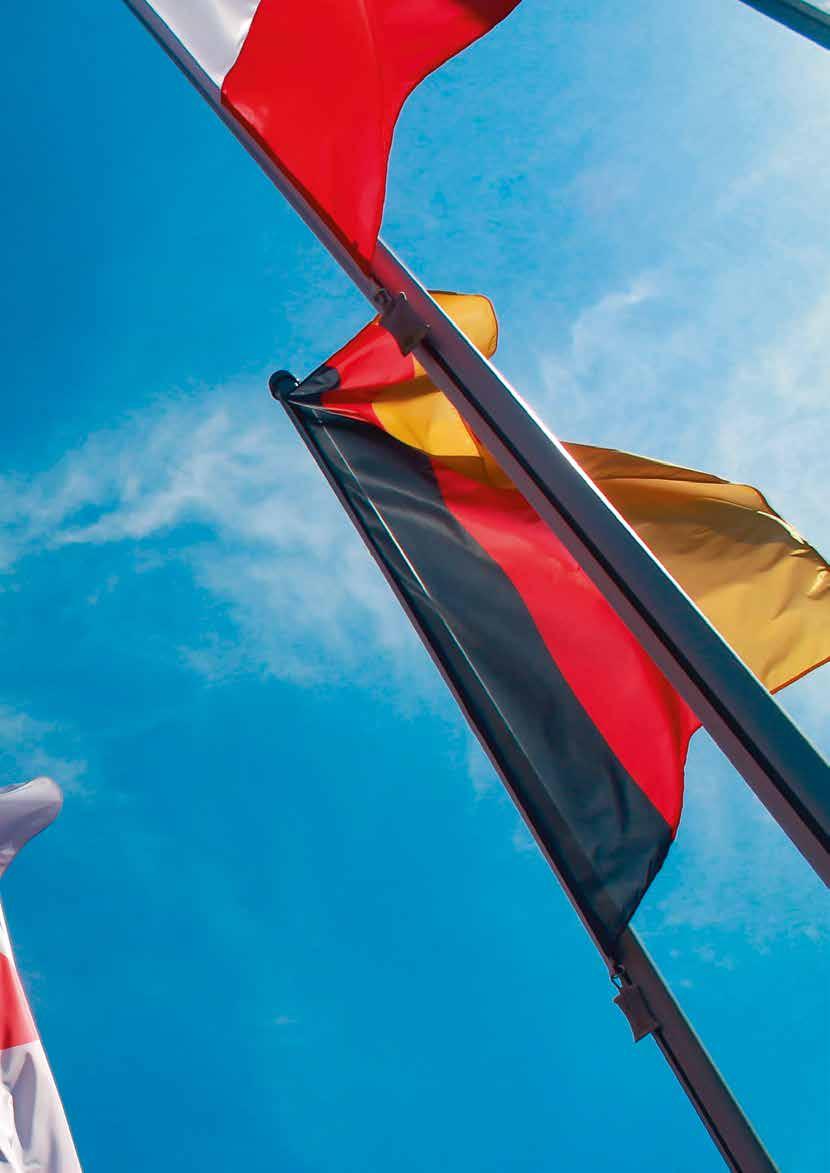
In their desire to pursue their federalist agenda, EU leaders intend to have a number of members of the European Parliament elected in a single constituency; that is on transnational lists that are common throughout Europe.
In concrete terms, this means a new step in the demise of nation states, and a new blow to national sovereignty. From now on, members of the European Parliament will no longer derive their legitimacy from their electors, but from the European Union.
An Estonian citizen from Sillamae or a Portuguese citizen from Madeira may well have to choose between a Dutch socialist, a Belgian liberal or a Maltese centrist, in other words for political personalities they know nothing about
In het kader van hun federalistische agenda willen de EU-leiders een aantal leden van het Europees Parlement in één enkel kiesdistrict laten kiezen, d.w.z. op transnationale en dus gemeenschappelijke lijsten in heel Europa.
Concreet betekent dit een nieuwe fase in het verdwijnen van natiestaten en een nieuwe klap voor de nationale soevereiniteit. Voortaan ontlenen de leden van het Europees Parlement hun legitimiteit niet meer aan hun kiezers, maar aan de Europese Unie.
Het zou dus zomaar kunnen dat een Est uit Sillamae of een Portugees uit Madeira straks moet kiezen tussen een Nederlandse socialist, een Belgische liberaal of een Maltese centrist, d.w.z. voor politieke persoonlijkheden die ze in de meeste gevallen niet kennen.
Transnational lists: citizens, be prepared to vote for representatives you know nothing about.
in most cases. For who, apart from their compatriots and those who are familiar with politics, has ever heard of Frans Timmermans, Guy Verhofstadt or Roberta Metsola?
ese transnational lists will be the result of arrangements and negotiations within the European parties, far from the approval of the citizens. is is the opposite of our vision of democracy, which is based on the representativity and legitimacy provided by the ballot box.
Want wie, behalve hun landgenoten en politico elen, heeft ooit gehoord van Frans Timmermans, Guy Verhofstadt of Roberta Metsola?
Deze transnationale lijsten zullen het resultaat zijn van afspraken en onderhandelingen tussen de Europese partijen, ver van de goedkeuring van de burgers. Dit staat volledig haaks op onze visie op democratie, gebaseerd op representativiteit en legitimiteit die verleend is door de stembus.

0.007% is the very low percentage of Europeans who took part in the Conference on the Future of Europe, a huge forum organised by the European Union for the purpose of showcasing its democratic qualities.
e result was an anticlimax, and the Conference can only be described as a huge failure which should have encouraged the Europeists to exercise restraint.
But that is not a true re ection of who they really are. ey celebrated the outcome of the debates with great pomp and circumstance, promising ever more European federalism at the expense of the nation states, thereby depriving them of their sovereignty.
Of course, we could simply stick to the emphatic words of leaders such as Ur-
0,007%: dat is het zeer lage percentage Europeanen dat heeft deelgenomen aan de Conferentie over de Toekomst van Europa, een breed forum dat door de cenakels van de Europese Unie is georganiseerd om te debatteren over welke richting de EU uit moet.
De berg heeft echter een muis gebaard en de Conferentie kan alleen maar gekwali ceerd worden als een enorme mislukking die de europeanisten had moeten aanzetten tot bescheidenheid.
Maar dan kent men hen niet goed... En dus werd de afsluiting van de debatten met veel pracht en praal gevierd, waarbij steeds meer Europees federalisme beloofd werd ten koste van de natiestaten, die van hun soevereiniteit ontdaan worden.
sula von der Leyen, president of the European Commission: “Democracy, peace, individual and economic freedom: this is what Europe is ghting for today while war rages on our continent. e EU must continue to meet the expectations of European citizens. Today, their message has been heard loud and clear. And now it is time to act.”
But we need to go into greater detail. Among the measures in the report is the desire to see the deployment of “joint armed forces” which, “outside European borders, could be deployed in exceptional circumstances, preferably under a legal mandate from the United Nations Security Council, and therefore in compliance with international law, without competing with NATO.” is is how the European Union furthers its project without really consulting the people!
It goes without saying that the Identity and Democracy Party, which aims to put sovereign nations and citizens at the centre of discussions, has, more than ever, a di erent vision of Europe to that of the Europeists.
Natuurlijk zouden we ons kunnen laten leiden door de nadrukkelijke woorden van ‘leiders’, zoals die van Ursula von der Leyen, voorzitster van de Europese Commissie: “Democratie, vrede, individuele en economische vrijheid: dat is waar Europa vandaag voor vecht terwijl er oorlog woedt op ons continent. De EU moet blijven beantwoorden aan de verwachtingen van de Europese burgers. Vandaag is hun boodschap luid en duidelijk gehoord. En nu is het tijd om te handelen.”
Maar laten we een en ander eens van naderbij bekijken. Eén van de maatregelen in het rapport is de wens om “gezamenlijke strijdkrachten” in te zetten die “buiten de Europese grenzen in uitzonderlijke omstandigheden ingezet kunnen worden, bij voorkeur met een wettelijk mandaat van de Veiligheidsraad van de Verenigde Naties en dus in overeenstemming met het internationaal recht, zonder te concurreren met de NAVO”. Zo duwt de Europese Unie haar project vooruit zonder de bevolking echt te raadplegen!
Het spreekt voor zich dat de Partij Identiteit en Democratie, die soevereine naties en burgers centraal in het debat wil stellen, meer dan ooit een andere visie heeft dan de EU-federalisten op wat een civiele Unie zou moeten zijn.
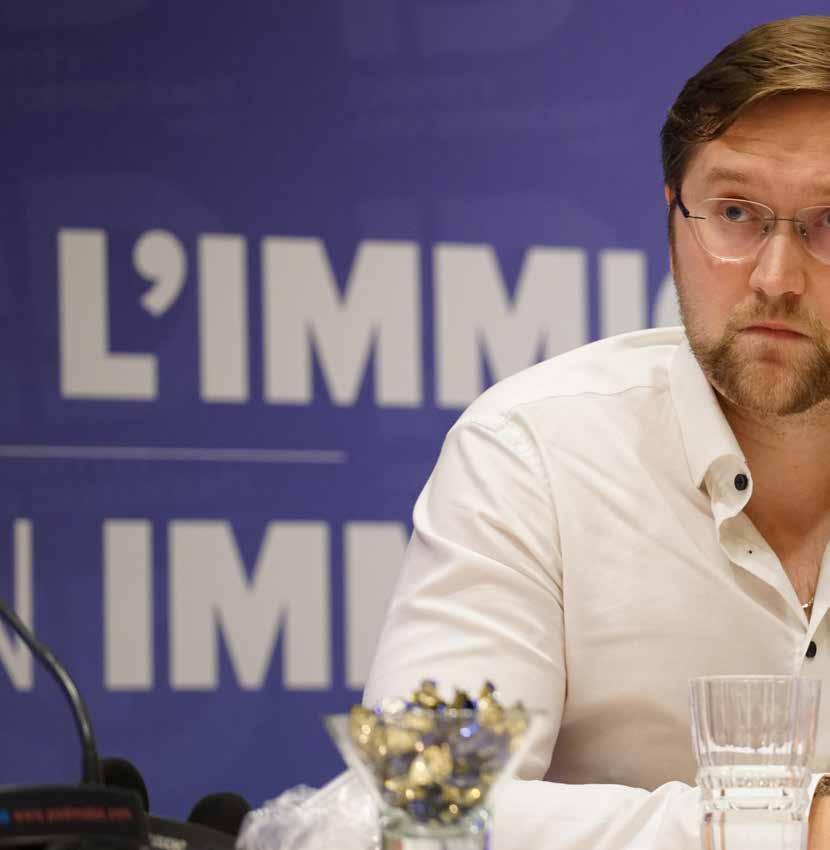
For some time now, we in the ID Party have been saying that the EU needs more democracy, and that the best way to achieve this is to give our citizens a voice and listen to what they have to say. We need more referendums, more transparency and more involvement from our citizens.
Binnen de ID Partij zeggen we al lang dat de EU meer democratie nodig heeft en dat de beste manier om dit te bereiken, is om te luisteren naar en het woord te geven aan onze burgers. We hebben meer referenda, meer transparantie en een grotere betrokkenheid van onze burgers nodig.
Unfortunately, the European Parliament and the Commission are not interested in democracy. eir bogus plan to involve EU citizens has been awed from the start. Hand-picked pro-EU upper class citizens are hardly representative of the majority of Europeans.
Jaak Madison, Ests lid van het Europees Parlement, lid van het bureau van de ID
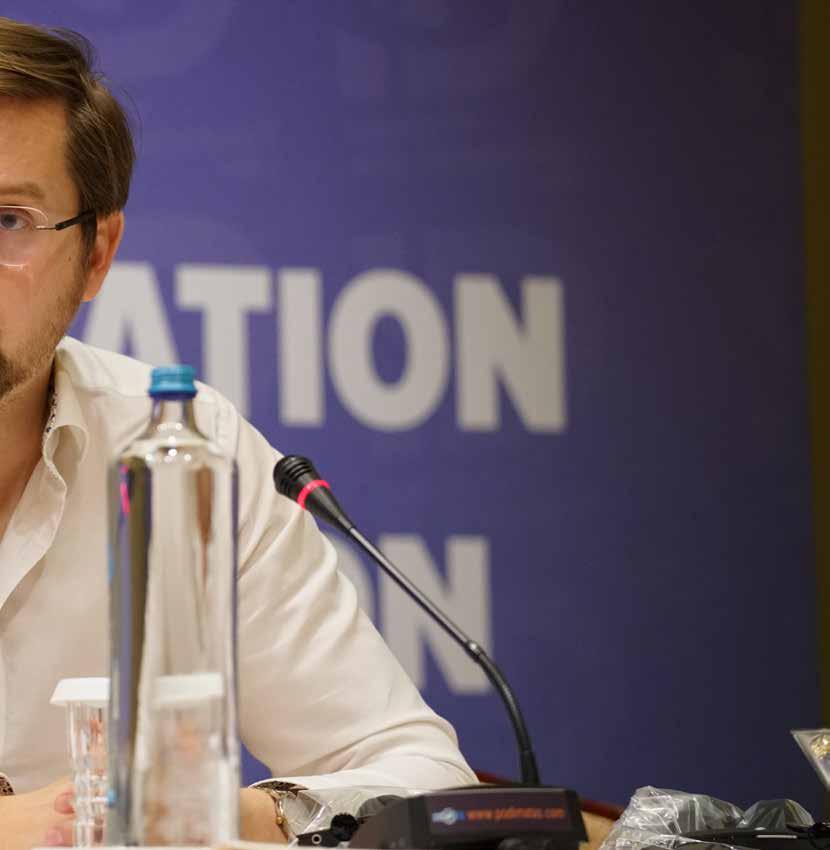
Helaas zijn het Europees Parlement en de Commissie niet geïnteresseerd in democratie. Hun valse project om de EU-burgers erbij te betrekken heeft vanaf het begin niet gedeugd. Uitgekozen pro-EU burgers uit de hogere klasse zijn niet representatief voor de meerderheid van de Europeanen.
e outcome of the conference on the Future of Europe was decided behind closed doors in Brussels a long time ago. e aim was to justify the European project, that is an increasingly federalist Europe. e mandate for these reforms came from 800 participants who, in a way, should represent the will of the people. Why hold referendums when the EU is already acquainted with the citizens’ opinions, wishes and needs? Referendums are dangerous after all, as people could make the wrong choices when they vote, as they did with the Brexit.
Fortunately, with the Future of Europe Conference, there were specialists, or so-called “experts” to guide young people towards the right conclusionsmost of them were, or still are, funded by the EU. ose who dared to speak out were ignored and silenced.
In the end, Eurofederalists like Guy Verhofstadt can proudly proclaim that the people have spoken, and that it is up to the Commission and Parliament to implement the will of the people. In their fairytale world, the EU needs a common constitution, a common scal union, its own army, transnational electoral lists and more migrants from outside countries for the EU to truly thrive.
We must expose this fraud. Brussels’ Eurofederalists cannot believe for one moment that they have the moral authority and support of the people to transform Europe. If they had the will of the people on their side, they would not need to resort to unethical
Over de uitkomst van de Conferentie over de Toekomst van Europa was al lang geleden achter gesloten deuren in Brussel beslist. Het doel was het Europese project te rechtvaardigen, d.w.z. een steeds federalistischer Europa. Het ‘mandaat’ voor deze hervormingen komt van 800 deelnemers die zogezegd de wil van het volk zouden moeten vertegenwoordigen. Waarom referenda houden als de EU de mening van de burgers en zijn wensen en behoeften toch al kent? Referenda zijn immers gevaarlijk, mensen zouden verkeerd kunnen stemmen, zoals gebeurd is met de Brexit, is de gedachtengang.
‘Gelukkig’ waren er met de Conferentie specialisten, of zogenaamde ‘deskundigen’ om de deelnemers naar de ‘juiste’ conclusies te leiden - de meesten van hen werden of worden nog altijd ge nancierd door de EU. Zij die het waagden zich kritisch op te stellen, werden genegeerd en tot zwijgen gebracht.
Uiteindelijk konden eurofederalisten als Guy Verhofstadt trots verkondigen dat ‘het volk’ heeft gesproken en dat het aan de Commissie en het Parlement is om ‘de wil van het volk’ uit te voeren. In hun sprookjeswereld heeft de EU een gemeenschappelijke grondwet, een gemeenschappelijke scale unie, een eigen leger, transnationale kieslijsten en meer migranten uit derde landen nodig om echt te kunnen bloeien.
We moeten dit bedrog onder de aandacht brengen. De Brusselse eurofederalisten mogen geen moment ge-
practices and to put on a show just to convince themselves that their crusade is a fair one. If we really want to hear the people’s opinion, let’s hold referendums. Of course, the bureaucrats in Brussels would have a hard time accepting the results of such votes, seeing as democracy is hardly popular with Eurofederalists, as we well know.
loven dat ze het morele gezag en de steun van de bevolking hebben om Europa te transformeren. Ze hebben de wil van het volk niet aan hun kant, anders zouden ze hun toevlucht niet hoeven te nemen tot onethische praktijken en het opvoeren van een show om zichzelf ervan te overtuigen dat hun kruistocht gerechtvaardigd is. Als we echt de mening van het volk willen horen, laten we dan referenda houden. Natuurlijk zouden de bureaucraten in Brussel het er moeilijk mee hebben om de resultaten van zulke stemmingen te aanvaarden, want we weten dat democratie niet populair is bij deze eurofederalisten.
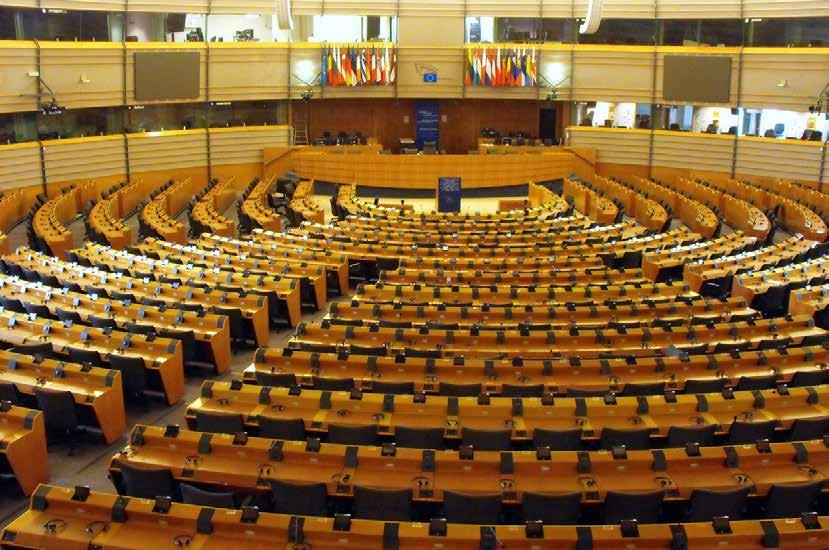
OUNTRIES AND PARTIES LANDEN
COUNTRIES AND PARTIES LANDEN

PARTIES
LANDEN EN PARTIJEN
LANDEN EN PARTIJEN COUNTRIES
LANDEN EN PARTIJEN COUNTRIES
LANDEN EN PARTIJEN COUNTRIES
LANDEN EN PARTIJEN COUNTRIES
PARTIJEN COUNTRIES AND PARTIES
EN PARTIJEN COUNTRIES AND
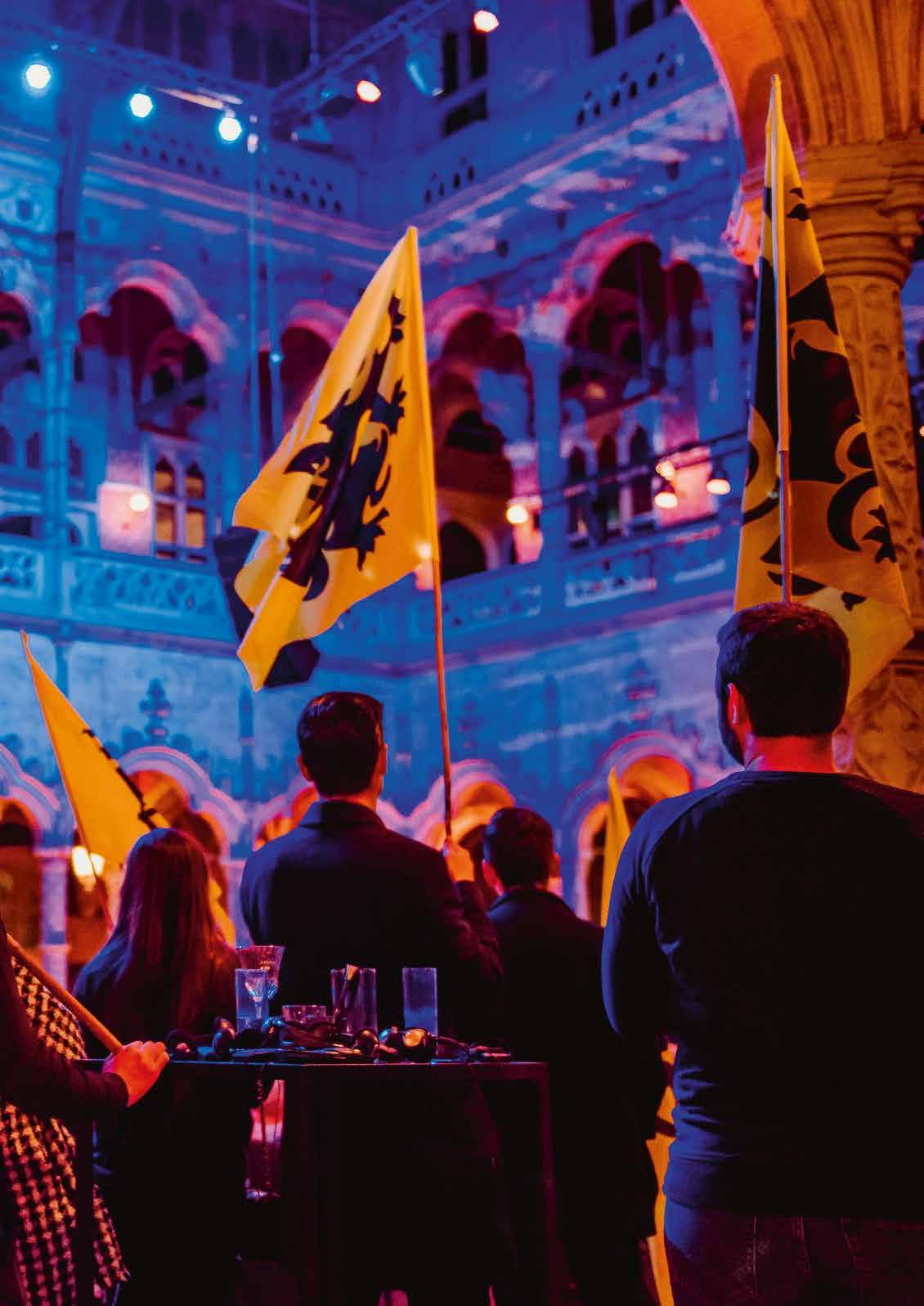
In a sensitive international context marked by the war in Ukraine and the rise in energy prices, the vigour of patriotic parties across Europe is a glimmer of light in the darkness.
Having won 42% of the vote in the French presidential election, Marine Le Pen has succeeded in becoming the main opposition force in the National Assembly: the RN now has 89 MEPs, whose diligence is now fully acknowledged, even among political opponents.
Seeing as good news always comes in pairs, Sweden now has a rightwing government that includes the Sverigedemokraterna (Sweden Democrats). Better still, the party led by Jimmy Akeson is the largest in the coalition in terms of seats. In Italy, the ‘centre-right’ government led by Giorgia Meloni, which includes the Lega, has broken away from years of patchwork coalitions.
Elsewhere, the polls show a steady rise in patriotic parties: in Estonia, Eesti Konservatiivne Rahvaerakond (EKRE) boasts 28% of intended votes and it is quite possible that Martin Helme will become the country’s next
In een moeilijke internationale context, gekenmerkt door de oorlog in Oekraïne en de stijging van de energieprijzen, zijn de goede prestaties van patriottische partijen in heel Europa een lichtpunt in het donker.
In Frankrijk is Marine Le Pen, na 42% van de stemmen te hebben behaald bij de presidentsverkiezingen, erin geslaagd de belangrijkste oppositiemacht te worden in het Franse parlement: Rassemblement National telt nu 89 parlementsleden, van wie het ernstige parlementaire oppositiewerk nu zelfs door politieke tegenstanders erkend wordt.
Goed nieuws komt nooit alleen: Zweden wordt voortaan geleid door een rechtse regering met de Sverigedemokraterna (‘Zweden Democraten’) aan boord. Sterker nog, de partij onder leiding van Jimmy Akeson is wat het aantal zetels betreft de grootste in de coalitie. In Italië breekt de centrumrechtse regering onder leiding van Giorgia Meloni, waarvan ook de Lega deel uitmaakt, met de jaren van wisselende coalities.
Elders laten peilingen een gestage
e great political upheaval in Europe
Prime Minister. In Portugal, Chega! is making steady progress: in three years of existence, the party increased to 12 MEPs during the last elections. In Flanders, Vlaams Belang often leads in terms of voting intentions. Finally, in Austria, the Freiheitliche Partei Österreichs is back in the race after a few complicated years, and is even the leading party according to the latest polls.
Europe is thus witnessing a great political upheaval that is putting patriots at the heart of the political game. e latter are naturally strengthening the ties that bind them in order to carry more clout at European level in a context of frequent attacks: this is the case, rst and foremost, of Hungary and Poland, both of which are targeted by the European Union.
vooruitgang van patriottische partijen zien: in Estland staat Eesti Konservatiivne Rahvaerakond (EKRE) op 28% van de stemintenties en het is niet uitgesloten dat Martin Helme de volgende premier van het land wordt. In Portugal blijft Chega! vooruitgang boeken: in de drie jaar van haar bestaan is de partij gegroeid tot 12 parlementsleden bij de laatste verkiezingen. In Vlaanderen is het Vlaams Belang koploper bij de stemintenties. Tot slot is in Oostenrijk de Freiheitliche Partei Österreichs (FPÖ) na een paar ingewikkelde jaren weer in de race en volgens de laatste peilingen zelfs de grootste partij.
Europa is dus getuige van een grote politieke omwenteling, die patriotten in het centrum van het politieke spel plaatst. Deze laten niet na om de banden die hen verenigen te versterken om op Europees niveau invloed uit te oefenen in een context waarin zij vaak worden aangevallen: dit is in de eerste plaats het geval voor Hongarije en Polen, die in het vizier van de Europese Unie staan.
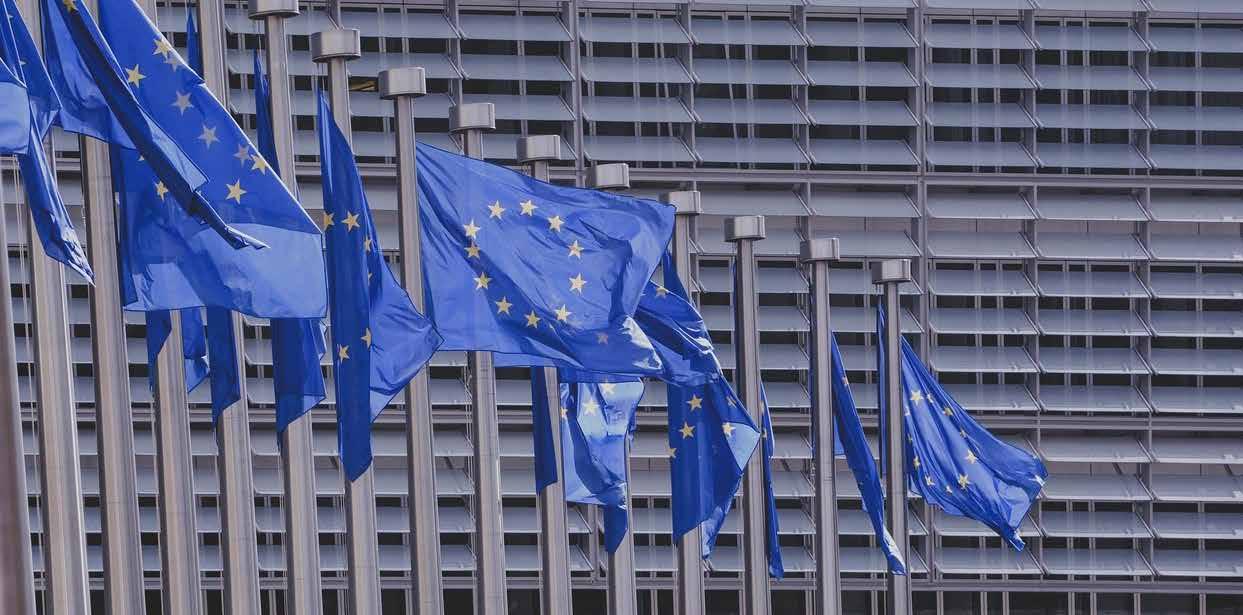
e result has exceeded expectations: at the end of the second round of the legislative elections, the Rassemblement National has become the leading opposition party in France, with 89 MEPs, well beyond the polls’ predictions.
e country is now divided into three parts of roughly equal weight: the rst is internationalist and liberal, and embodied by Emmanuel Macron; the second is far-left and embraces all the causes aimed at bringing an end to our civilisation; the third is patriotic.
Having failed to win an absolute majority, Emmanuel Macron will have to contend with the other political forces in the assembly, which will make the country di cult to govern in a context of strong criticism of the president. His previous mandate was
Het resultaat overtrof alle verwachtingen: aan het eind van de tweede ronde van de parlementsverkiezingen werd Rassemblement National de grootste oppositiepartij in Frankrijk, met 89 afgevaardigden, veel meer dan de peilingen hadden voorspeld.
Het land is nu verdeeld in drie blokken van min of meer gelijk gewicht: het eerste is internationalistisch en liberaal, belichaamd door Emmanuel Macron; het tweede is extreem-links en omarmt alle zaken die tot doel hebben een einde te maken aan onze beschaving; het derde is patriottisch.
Aangezien Emmanuel Macron geen absolute meerderheid heeft behaald, zal hij moeten samenwerken met de andere politieke krachten in het Franse parlement. Hierdoor zal het land moeilijk te besturen zijn
marked by the popular revolt of the ‘gilets jaunes’; we strongly doubt that this one will go smoothly.
Marine Le Pen, who has chosen to hand over the reins of her party to Jordan Bardella, now leads the new group in the National Assembly. She set the tone from the very beginning: in opposition to the scru y and tribunelike style of the left, she intends to embody a serious and hard-working opposition.

e legislative election came a few weeks after the presidential election that strengthened the position of Marine Le Pen. Despite the disappointment of not having made it to the presidency following a duel that opposed the candidate of European federalism and unbridled globalisation to a patriotic candidate, a growing number of French people now see Le Pen as a stateswoman capable of seizing power in the next elections.
in een context waarin de president zwaar bekritiseerd wordt. Zijn vorige termijn werd gekenmerkt door de volksopstand van de gele hesjes; wij betwijfelen ten zeerste of deze termijn soepel zal verlopen.
Marine Le Pen, die heeft besloten de teugels van haar partij over te dragen aan Jordan Bardella, leidt nu de nieuwe fractie in het parlement. Zij heeft vanaf het begin de toon gezet: in tegenstelling tot de smerige, tribuneachtige stijl van links wil zij een serieuze en hardwerkende oppositie belichamen.
De parlementsverkiezingen volgden enkele weken op de presidentsverkiezingen, waar Marine Le Pen nog sterker is uitgekomen. Ondanks de teleurstelling dat ze het presidentschap niet in de wacht heeft gesleept in een duel waarin de kandidaat van het EU-federalisme en de ongebreidelde globalisering tegenover een patriottische kandidaat stond, wordt ze nu door een groeiend aantal Fransen gezien als een staatsvrouw die klaar is om bij de volgende verkiezingen aan de macht te komen.
Following the early resignation of the Draghi government, whose various parties (Lega, Cinque Stelle, Partito Democratico, Forza Italia, Insieme per il futuro, Italia Viva, Centro democratico, Articolo Uno, Noi con l’Italia) had failed to reach an agreement, Italians sent a clear message on 25 September.
e polls, which predicted the victory of the right-wing coalition (Fratelli d’Italia, Lega, Forza Italia) were con rmed in the votes, since it obtained around 43% (broken down as follows: 25% FdI - 10% Lega - 8% FI), ahead of the left-wing bloc (25%) and the Movimento 5 Stelle (15%).
e government was introduced on 23 October. Consisting of 24 members, including 6 women, the new team meets a twofold requirement: on the one hand, it reassures European partners while the post-Covid recovery plan has yet to be implemented, and on the other hand, it asserts a rightwing identity!
45-year-old Giorgia Meloni is the
Na het vroegtijdig aftreden van de regering Draghi, waarvan de verschillende partijen (Lega, Cinque Stelle, Partito Democratico, Forza Italia, Insieme per il futuro, Italia Viva, Centro democratico, Articolo Uno, Noi con l’Italia) het niet meer eens konden worden, hebben de Italianen op 25 september ll. een duidelijke boodschap afgegeven.
De peilingen, die de overwinning van de rechtse coalitie van Fratelli d’Italia, Lega en Forza Italia voorspelden, werden bevestigd in de stemmingen, aangezien ze ongeveer 43% van de stemmen behaalde, ten opzichte van het linkse blok (25%) en de Movimento Cinque Stelle (15%).
De regering werd op 23 oktober voorgesteld. De nieuwe ploeg, die bestaat uit 24 leden, waaronder 6 vrouwen, beantwoordt aan een dubbele eis: enerzijds de Europese instellingen geruststellen om het postcovid-herstelplan uit te voeren, en anderzijds een rechtse identiteit doen gelden!
rst woman to lead Italy. Founder of Fratelli d’Italia in 2014, the former youth minister in Berlusconi’s fourth government took advantage of her party’s presence in the opposition under Mario Draghi to secure the lead in the polls then the ballot box. She has never shied away from asserting her identity as an Italian woman, a Christian and a mother.
Matteo Salvini, a member of the ID Party, was appointed Deputy Prime Minister in charge of infrastructures, which includes ports - and is known for having blocked migrant boats in the Mediterranean.
La Lega will also be in charge of the Economy, a key portfolio in the present context, with Giancarlo
Giorgia Meloni, 45, is de eerste vrouw die Italië leidt. De voormalige minister van Jeugdzaken in de vierde regering van Berlusconi, die in 2014 Fratelli d’Italia oprichtte, pro teerde van de aanwezigheid van haar partij in de oppositie onder Mario Draghi om de eerste plaats in de peilingen en vervolgens aan de stembus te bemachtigen. Ze heeft nooit geaarzeld haar identiteit als Italiaanse vrouw, christen en moeder te bevestigen.
Matteo Salvini, lid van de ID Partij, werd benoemd tot vicepremier en is belast met Infrastructuur, wat ook de havens omvat – herinner u dat hij het was die migrantenboten op de Middellandse Zee tegengehouden heeft.

Giorgetti, whose moderate pro le is compatible with an open outlook on Europe. e other ministerial posts to be held by Lega members are Education and Merit (Giuseppe Valditara), Regional A airs (Roberto Calderoli) and Disability (Alessandra Locatelli).
Among the prominent gures in the new government, Antonio Tajani, former president of the European Parliament and member of Forza Italia, was appointed Deputy Prime Minister for Foreign A airs. Ra aele Fitto MEP, who co-chairs the European Conservatives and Reformists Group, has been appointed to Foreign A airs. Carlo Nordio (FdI) will take up the post of Minister of Justice, and Guido Crosetto, described as close to Giorgia Meloni, has been appointed to Defence.
e left-wing parties su ered a setback when their bloc obtained only a quarter of the votes: the Partito Democratico, led by Enrico Letta, which had been expected to be neck and neck with FdI for a while, obtained around 20% of the votes. Although it nally obtained more than predicted by the polls, Giuseppe Conte’s Movimento 5 Stelle was far from the historic score it had obtained in 2018 (32%). e party was also a ected by internal rifts after former leader Luigi di Maio jumped ship and joined the centre-left coalition.
While the coalition partners deny any anti-European sentiment, despite the caricature in the media, European Commission President Ursula von
De Lega heeft ook de leiding over Economie, een belangrijke portefeuille in de huidige context, met Giancarlo Giorgetti. De andere ministerposten die door Lega-leden bekleed worden, zijn Onderwijs (Giuseppe Valditara), Regionale Zaken (Roberto Calderoli) en Alessandra Locatelli staat in voor Participatie en personen met een handicap.
Andere prominenten in de nieuwe regering zijn Antonio Tajani, voormalig voorzitter van het Europees Parlement en lid van Forza Italia, die naast Salvini benoemd werd tot vicepremier. Hij kreeg de portefeuille Buitenlandse zaken. Het Europese parlementslid Raffaele Fitto, die medevoorzitter was van de fractie van de Europese Conservatieven en Hervormers (ECR), heeft Europese Zaken onder zijn bevoegdheid. Carlo Nordio (FdI) werd minister van Justitie en Guido Crosetto, die omschreven wordt als een naaste medewerker van Giorgia Meloni, is minister van Defensie.
De linkse partijen kregen een tegenslag te verwerken, omdat hun blok slechts een kwart van de stemmen behaalde: de Partito Democratico onder leiding van Enrico Letta, waarvan een tijdlang werd aangekondigd dat ze nek aan nek lag met de FdI, behaalde ongeveer 20% van de stemmen. Hoewel de Movimento Cinque Stelle van Giuseppe Conte uiteindelijk meer behaalde dan de peilingen voorspelden, bleef de partij ver verwijderd van de historische score die ze in 2018 had behaald (32%). De partij werd ook getro en door interne verdeeldheid nadat voormalig leider Luigi di Maio het
der Leyen has threatened Italy with sanctions, meaning the use of the Conditionality Regulation.
schip verliet en zich aansloot bij de centrumlinkse coalitie.
Bij aanvang van de regering Meloni heeft de voorzitter van de Europese Commissie, Ursula von der Leyen, Italië bedreigd met sancties, door een mogelijk gebruik van het zgn. conditionaliteitsmechanisme. De soep wordt momenteel echter niet zo heet gegeten. Ondanks de karikatuur die er in de media van werd gemaakt, ontkennen de coalitiepartners elk anti-Europees sentiment.
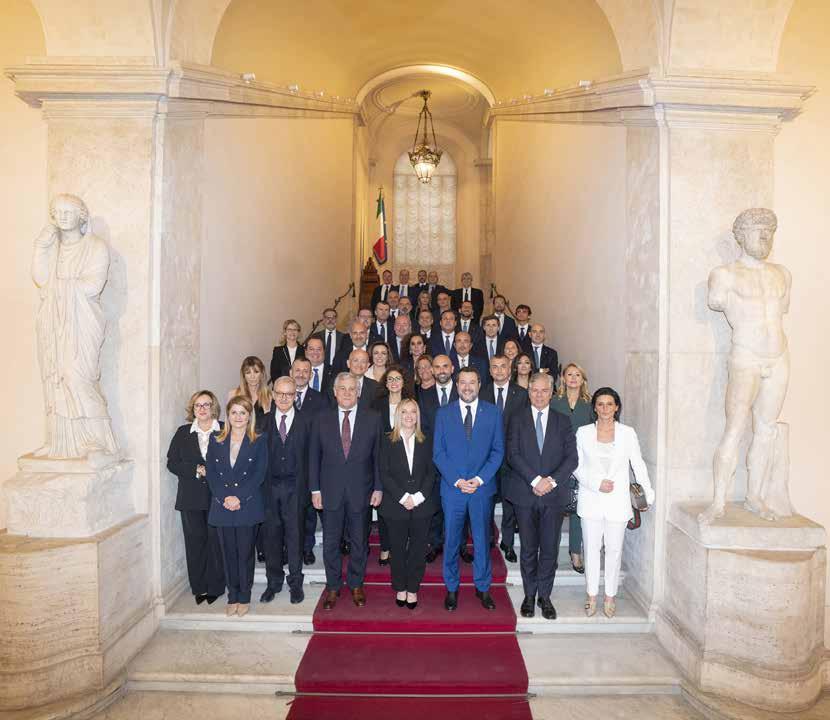
e right-wing prevailed in the Swedish parliamentary elections held on 11 September 2022, with the Sverigedemokraterna (Sweden Democrats) becoming the country’s second largest party with 20.5% of the votes.
Although the Social Democrats remain the leading political force with a score of over 30%, the right-wing bloc (SD, Moderates, Christian Democrats and Liberals) obtained almost 50% of the vote, ahead of the left-wing bloc (Social Democrats, left-wing Party, Green Party and Centre Party).
In the words of Jimmie Akesson, president of the SD: “ is result says a lot about how far we have come. We have gone from being a small party that nobody cared about to being the second largest party in Sweden.”
Sverigedemokraterna’s success can be explained by the growing signi cance of immigration in the lives of the Swedes. is problem has exploded in recent years in a country that was previously relatively untouched by immigration, as well as by growing insecurity (retaliatory gang ghting
Rechts was dé grote winnaar bij de Zweedse parlementsverkiezingen van 11 september 2022: Sverigedemokraterna (‘Zweden Democraten’, SD) werd met 20,5% van de stemmen de tweede grootste partij van het land.
Hoewel de sociaaldemocraten voorlopig de grootste partij blijven, behaalde het rechtse blok van SD, gematigden, christendemocraten en liberalen bijna 50% van de stemmen, meer dus dan het linkse blok (sociaaldemocraten, Linkse Partij, Groenen en Centrumpartij).
Voor Jimmie Akesson, voorzitter van de SD zegt de uitslag veel “over de weg die is afgelegd, over de kleine partij waar iedereen vroeger de spot mee dreef en die nu de tweede grootste partij in Zweden is.”
Het succes van de Sverigedemokraterna valt grotendeels te verklaren door het feit dat de Zweden zich steeds meer zorgen maken om immigratie, een probleem dat de laatste jaren explosief is toegenomen in een land dat tot dan relatief gespaard was gebleven, en door de toenemende onveiligheid (verkrachtingen, afrekeningen tussen
in particular). Moreover, rising prices have not failed to fuel concerns in recent weeks, as elsewhere in Europe.
Although the party was founded in 1988, it was not until it was “cleaned up” and especially the rise of Jimmie Akesson, who became president in 2005, that the party really gained momentum. It entered parliament in 2010 with 5.7% of the votes, and has continued to grow ever since: 13% in 2014, 17.5% in 2018, followed by its consecration in 2022.
e Conservative Ulf Kristersson is the new Prime Minister, a position that is made all the more important by the fact that Sweden is scheduled to take over the rotating presidency of the Council of the European Union in January 2023 following the Czech Presidency. NATO membership will also be a priority in coming months.

bendes, ...). Bovendien hebben de stijgende prijzen de laatste maanden de bezorgdheid fors aangewakkerd, net als elders in Europa.
Hoewel de partij reeds in 1988 werd opgericht, kwam de partij pas van de grond na een interne opkuis en vooral door de opkomst van Jimmie Akesson, die in 2005 voorzitter werd. De partij kwam in 2010 in het parlement met 5,7% van de stemmen. Daarna zou ze blijven groeien: 13% in 2014, 17,5% in 2018 en de bekroning in 2022.
De conservatief Ulf Kristersson is de nieuwe premier, een post die des te belangrijker is omdat Zweden vanaf januari 2023 het roulerende voorzitterschap van de Raad van de Europese Unie overnam van Tsjechië. Ook de toetreding tot de NAVO zal de komende maanden een prioriteit zijn.
e FPÖ is one of the oldest and most established parties in our political family. Its political and ideological vision follows that of the 1848 democratic revolution in the spirit of the so-called “ ird Lager”. Despite its long tradition, the FPÖ, as it is known today, was founded in 1956.
Having experienced ups and downs in the course of its history marked by participation in power, but also more complicated times, it is once again at the heart of the political game where its roots have always allowed it to get by.
Having experienced ups and downs in the course of its history marked by participation in power, as well as more complicated times, it is once again at the heart of the political game where its roots have always allowed it to get by.
While post-war political Austria was primarily structured around the social democrats (Sozialdemokratische Partei Österreichs, SPÖ) and the Conservatives (Österreichische Volkspartei, ÖVP), each with a loyal electorate based on socio-economic and
De Freiheitliche Partei Österreichs (FPÖ) is een van de oudste en meest gevestigde partijen van onze politieke familie. Ze volgt in haar ideologische en politieke visie de democratische revolutie van 1848 in de lijn van de wat men het ‘Drittes Lager’ noemt. Ondanks haar lange traditie werd de FPÖ, zoals ze nu heet, in 1956 opgericht.
Na perioden van ups en downs in haar geschiedenis, die gekenmerkt werden door deelname aan verschillende regeringen, staat de partij nu weer in het centrum van het politieke spel en dankzij haar stevige wortels in Oostenrijk heeft ze zich altijd kunnen redden.
Terwijl het naoorlogse Oostenrijk voornamelijk was opgebouwd rond de sociaaldemocraten (Sozialdemokratische Partei Österreichs, SPÖ) en de conservatieven (Österreichische Volkspartei, ÖVP), elk met een trouw electoraat op basis van sociaaleconomische en sociaal-culturele kenmerken, werd de FPÖ opgericht als toevluchtsoord voor nationaal-liberale onafhankelijken die niet tot de klerikale strekking van de ÖVP behoorden
e FPÖ - a party standing the test of time
socio-cultural groups, the FPÖ was founded as a safe haven for national-liberal independents who belonged neither to the clerical tendency of the ÖVP nor identi ed with the class struggle of the SPÖ.
As the traditional parties eroded, the FPÖ became an increasingly important player on the political scene, its underlying attitude towards the European Community remaining positive until Maastricht. It entered a government with the SPÖ in 1983 when its pro-European wing was dominant before the ideological shift and the advent of a new gurehead.
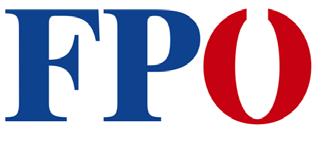
Jorg Haider became the party’s new strongman in 1986 and was to remain its leading gure until the early 2000s. His patriotic line, which strayed from national-liberalism to the point of abandoning its centrist political position, triumphed in the 1996 European elections, which was to serve as a springboard to put him in power with the intention of becoming Chancellor.
e 1999 parliamentary elections marked a turning point, heralding an upheaval that was widely commented on in Europe. Despite unsuccessful external interference (several EU member states threatened to impose sanctions on Austria if the FPÖ became the ruling party), the Austrians voted overwhelmingly for the FPÖ, putting it in second position. In reaction to the Austrian election results and the rst con ict between the Aus-
en zich ook niet identi ceerden met de klassenstrijd van de SPÖ.
Met de erosie van de traditionele partijen heeft de FPÖ zich op het politieke toneel gemanifesteerd als een steeds belangrijkere speler. Bovendien was de fundamentele houding van de FPÖ tegenover de Europese Gemeenschap altijd positief tot aan Maastricht. Terwijl haar proEuropese vleugel dominant was, stapte ze in 1983 in een regering met de SPÖ voordat er een ideologische verschuiving plaatsvond en een nieuw boegbeeld opstond.
In 1986 werd Jörg Haider de nieuwe sterke man van de partij. Hij bleef de belangrijkste guur tot het begin van de jaren 2000. Zijn patriottische lijn, waarbij hij de centristische politieke oriëntatie liet varen en meer naar rechts opschoof, zegevierde in de Europese verkiezingen van 1996. Dit kwam hem goed van pas om aan de macht te komen met de bedoeling kanselier te worden.
De parlementsverkiezingen van 1999 waren een keerpunt en zorgden voor een aardverschuiving die in heel Europa ink wat stof deed opwaaien. Ondanks mislukte inmenging van buitenaf (verschillende EU-lidstaten dreigden met sancties tegen Oostenrijk als de FPÖ de regeringspartij zou worden), stemden de Oostenrijkers massaal voor de FPÖ, waardoor deze op de tweede plaats kwam. In reactie op de Oostenrijkse verkiezingsuitslag en het eerste con ict tussen de
trian People’s Party (ÖVP) and the Freedom Party (FPÖ), Austria was placed under EU surveillance, namely by socialist government leaders. e Belgian Minister of the Interior, father of the actual President of the European Council, even urged his compatriots to stop going skiing in Austria. Yet none of this worked: the adversity of the Europeists merely strengthened the support of the Austrians for the FPÖ.
Jorg Haider agreed not to join the government and devoted his time to his efdom in Carinthia, which did not fail to generate tension because of his regular criticism of the government of Vienna. While the ÖVP emerged stronger from the following elections, the FPÖ went through a period of decline marked by the departure of its former strongman, and party division.
Like a phoenix rising from its ashes, the FPÖ managed to raise its head under the leadership of HeinzChristian Strache, giving the party a more patriotic, social and EUsceptical orientation, and placing strong emphasis on Austrian sovereignty. Although the party made progress from one election to the next, it made its mark again in 2016, when its presidential candidate Norbert Höfer made it to the second round. Irregularities in voting led to new elections which, paradoxically strengthened the green left candidate Alexander van der Bellen with the help of the ÖVP. Hofer ‘lost’ with 49.7% to van der Bellen, the ÖVP/SPO/Green/ Liberal candidate with 50.3%.
Oostenrijkse Volkspartij (ÖVP) en de Vrijheidspartij (FPÖ) werd Oostenrijk door de EU onder toezicht geplaatst, met name door socialistische regeringsleiders. De Belgische minister van Binnenlandse Zaken, Louis Michel, vader van de huidige voorzitter van de Europese Raad, beval zijn landgenoten om niet meer te gaan skiën in Oostenrijk. Niets hielp: de tegenstand in de EU versterkte de steun van de Oostenrijkers voor de FPÖ.
Jörg Haider besloot niet toe te treden tot de regering en concentreerde zich op zijn taken als hoofd van de deelstaatregering van Karinthië, wat voor veel spanningen zorgde, aangezien hij regelmatig kritiek uitte op de regering in Wenen. Terwijl de ÖVP sterker uit de volgende verkiezingen kwam, maakte de FPÖ een periode van verval door die werd gekenmerkt door het vertrek van haar vroegere sterke man en een splitsing van de partij.
Als een feniks die uit zijn as herrijst, wist de FPÖ onder leiding van Heinz-Christian Strache een ommekeer te bewerkstelligen door de partij een meer patriottische, EU-sceptische en sociale oriëntatie te geven. Bovenal benadrukt de FPÖ nu het belang van de nationale soevereiniteit van Oostenrijk. Terwijl de partij van verkiezing tot verkiezing vooruitgang boekte, stond ze in 2016 opnieuw in het middelpunt van de belangstelling toen haar presidentskandidaat, Norbert Hofer, de tweede ronde bereikte. Onregelmatigheden bij de stemming leidden tot nieuwe verkiezingen die, paradoxaal genoeg, de groenlinkse kandidaat Alexander van der Bellen
e party returned to government in 2017, in alliance with the ÖVP, before a scandal hit Heinz-Christian Strache, forcing the party to agree to early elections in 2019. Yet this did not spell the end of the FPÖ, which once again returned to the forefront. In the midst of the Covid crisis, it was the only Austrian party brandishing the banner of violated freedoms.
e legal handling of this alleged FPÖ scandal in 2017 has so far resulted in several acquittals and dismissals of preliminary proceedings against the FPÖ. But at the same time, the investigations around “Ibiza” have exposed an abhorrent picture of moral decadence and alleged corruption within the ÖVP. Meanwhile, an ÖVP minister is in custody and a senior ÖVP o cial is testifying as a key witness against former Chancellor Kurz and other ÖVP party members. In the meantime, the parliamentary commission of enquiry into ÖVP corruption continues, causing the ÖVP to plummet in the polls week by week, while the FPÖ is currently polling at 25%, on a par with the social democrats.
Austria’s need for new elections is obvious, the only question is how long the ÖVP’s Green coalition partner can continue to idly stand by.
met de hulp van de ÖVP versterkten. Hofer ‘verloor’ met 49,7% van Van der Bellen, de kandidaat van de ÖVP, SPÖ, groenen en liberalen die 50,3% behaalde.
De partij keerde in 2017 terug in de regering, in een alliantie met de ÖVP, voordat een schandaal Strache trof en de partij gedwongen werd vervroegde verkiezingen in 2019 toe te staan. Dit is echter niet het einde van de FPÖ, die nog een keer op de voorgrond treedt. In volle covid-crisis is zij de enige partij in Oostenrijk die de vlag van de geschonden vrijheden hoog houdt.
De juridische behandeling van het vermeende FPÖ-schandaal uit 2017 heeft tot dusver geleid tot verschillende vrijspraken en de verwerping van vooronderzoeken tegen de FPÖ. Maar tegelijkertijd hebben de onderzoeken rond ‘Ibiza’ een afschuwelijk beeld van morele decadentie en vermoedelijke corrupte toestanden binnen de christendemocratische ÖVP aan het licht gebracht. Ondertussen zit een ÖVP-minister in hechtenis en getuigt een hoge ÖVP-functionaris als kroongetuige tegen voormalig kanselier Kurz en andere ÖVP-partijleden. De parlementaire onderzoekscommissie naar de corruptie bij de ÖVP gaat ondertussen door, waardoor de partij week na week daalt in de peilingen. De FPÖ staat momenteel op 25%, gelijk met de sociaaldemocraten.
De noodzaak van nieuwe verkiezingen is evident voor Oostenrijk. De vraag is hoe lang de groene coalitiepartner van de ÖVP vanaf de zijlijn kan blijven toekijken.
In the Cid by major French author Pierre Corneille, one of the characters was made to say that “valor does not depend on age”. Nearly four centuries later, the formula could be applied to Jordan Bardella, who was elected president of the Rassemblement National on 5 November at the age of 27.
Opposed to Louis Aliot, a historical gure of the party and mayor of Perpignan in a fair yet frank election, Bardella, who was born in Drancy in Seine-Saint-Denis, obtained 85% of the votes. He intends to follow in the footsteps of Marine Le Pen, who brought the party to power. e objective is now to further professionalise the Rassemblement National in order to be ready for the next presidential election.
While the Rassemblement National, initially known as the Front National, has just celebrated its fty years of existence, it has chosen a third president, after Jean-Marie Le Pen (1972-2012) and Marine Le Pen (2012-2022). e latter remains fully
In el Cid laat Corneille, een belangrijk auteur uit de Franse literatuur, een van zijn personages zeggen dat “waarde niet wacht op het aantal jaren”. Bijna vier eeuwen later zou de formule toegepast kunnen worden op Jordan Bardella, die op 5 november op 27-jarige leeftijd verkozen werd tot voorzitter van Rassemblement National (RN).
Tegenover Louis Aliot, historische guur van de partij en burgemeester van Perpignan, behaalde Jordan Bardella 85% van de stemmen in een eerlijke en vriendschappelijke voorzittersverkiezing. De man wil in de voetsporen treden van Marine Le Pen, die de partij tot aan de deuren van de macht heeft gebracht. Het doel is nu om het Rassemblement National verder te professionaliseren en voor te bereiden op de volgende presidentsverkiezingen.
Terwijl Rassemblement National net zijn vijftigjarig bestaan heeft gevierd, eerst onder de naam Front National, heeft het dus een derde voorzitter gekozen, na Jean-Marie Le Pen (19722012) en Marine Le Pen (2012-2022).
committed to the political struggle as she is now president of the RN group in the National Assembly, which boasts 89 members.
As soon as he was elected, Jordan Bardella directly expressed his deep “gratitude” and “pride to be working with” Marine Le Pen, “but above all, for being given the opportunity to work for her and at her side”. With such a complementary pair sharing the same political line, the Rassemblement National can look to the future with con dence.
e RN’s new president has his origins in Italy. Growing up in SeineSaint-Denis, a working-class suburb of Paris, he forged his character and nurtured his own commitment in the face of the di culties that exist in the department. In 2016, he founded “Banlieues patriotes”, which aimed to break with the city’s successive government’s policies.
He went on to rise through the ranks of the party and gain recognition by leading the list for the 2019 European elections: with more than 23% of the votes, the Rassemblement National is now the leading French party in the European Parliament.

Deze laatste blijft zich volledig inzetten voor de politieke strijd aangezien ze nu voorzitter is van de RN-fractie in het Franse parlement, die 89 leden telt.
Onmiddellijk na zijn verkiezing heeft Jordan Bardella trouwens volop zijn erkenning uitgesproken, evenals zijn trots op de samenwerking met Marine Le Pen, “maar vooral voor haar en aan haar zijde”. Met een dergelijk duo, dat elkaar aanvult en dezelfde politieke lijn deelt, kan Rassemblement National de toekomst met vertrouwen tegemoet zien.
De nieuwe voorzitter van RN is van Italiaanse afkomst en groeide op in Seine-Saint-Denis, een volksbuitenwijk van Parijs, waar hij geconfronteerd werd met de moeilijkheden van het departement; immigratie en onveiligheid om ze niet te noemen. Daar werd zijn karakter gevormd en zijn eigen engagement gevoed. In 2016 is hij de initiatiefnemer van «Banlieues patriotes», een organisatie die wil breken met het stadsbeleid van de opeenvolgende regeringen.
Opklimmend in de gelederen van de partij verdiende hij zijn adelbrieven door de lijst voor de Europese verkiezingen van 2019 aan te voeren: met meer dan 23% van de stemmen werd het Rassemblement National de grootste Franse partij in het Europees Parlement.

Portugal’s history, from the settlement of the Iberians in the 6th century B.C., in the midst of the Neolithic period, to its integration into the European Union in 1986, is steeped in achievements.
e region was in contact with many di erent peoples: Greeks, Phoenicians, Carthaginians... before the Roman invasion, to which the Celtic populations opposed erce resistance. Yet Lusitania was to remain part of the Roman Empire for more than ve centuries.
e country was conquered by the
Vanaf de vestiging van de Iberiërs in de 6de eeuw voor Christus, in het midden van het neolithicum, tot de integratie in de Europese Unie in 1986, is de geschiedenis van Portugal rijk aan veroveringen.
De regio had talrijke contacten met verschillende volkeren: Grieken, Feniciërs, Carthagers... vóór de invasie van de Romeinen, tegen wie de Keltische bevolking zich hevig verzette. Toch bleef Lusitania meer dan vijf eeuwen lang deel uitmaken van het Romeinse Rijk.
Het land werd in 712 veroverd door de
Arabs in 712 who were later driven out by the Christian kings. e country became independent between 1139 and 1143, following the battles against the Moors, and as such it has some of the oldest borders in Europe.
Above all, Portugal was a nation of conquerors: Bartolomeu Diaz discovered the Cape of Good Hope where he perished at sea, and this cleared the way for Vasco da Gama to cross in 1497. Cabral discovered Brazil three years later. Above all, Portugal created a vast empire: Angola, Mozambique, Cape Verde, etc. In 1494, the Treaty of Tordesillas established the areas of in-
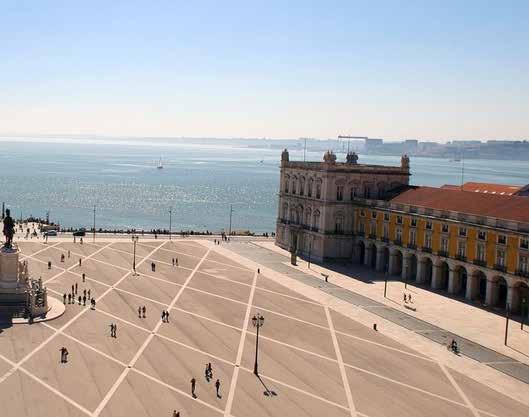
Arabieren, die nadien verdreven werden door de christelijke koningen. Het land werd onafhankelijk tussen 1139 en 1143, na de veldslagen tegen de Moren, en heeft in dat opzicht zowat de oudste grenzen van Europa.
Portugal was vooral een natie van veroveraars: Bartolomeu Diaz ontdekte Kaap de Goede Hoop, waar hij overigens omkwam. Hij baande de weg voor Vasco da Gama, die deze in 1497 overstak. Drie jaar later ontdekte Cabral Brazilië. Portugal vormde een zeer uitgestrekt rijk: Angola, Mozambique, Kaapverdië enz. In 1494 werden in het Verdrag van Tordesillas de
uence of Spain and Portugal.
e country then gradually lost its power and even came under Spanish rule for a time before its domination was overturned with the accession to the throne of John IV in 1640.
In 1755, on All Saints’ Day, Lisbon was hit by an earthquake that caused a tidal wave of up to 15 metres. is tragic event was related by Voltaire.
Portugal has lived through the upheavals of global geopolitics, particularly during the Napoleonic era. After being conquered, the Portuguese, aided by the English, revolted and ousted the emperor in 1808. Yet the country failed to regain its glory and Brazil, its agship, became independent in 1825.
e parliamentary monarchy became unstable and eventually faltered in the quarrels between conservatives and liberals. A republic was established in 1910, later plagued by royalist and military coups.
Early in the 1930s, after years of instability, Salazar took power and established an autocratic regime that ended after four decades in 1974, the year of the Carnation Revolution.
invloedssferen van Spanje en Portugal vastgelegd.
Het land verloor geleidelijk zijn macht en kwam zelfs enige tijd onder Spaans bewind. Uiteindelijk kwam aan de overheersing een einde met de troonsbestijging van Jan, hertog van Braganza, in 1640.
Op Allerheiligen van het jaar 1755 werd Lissabon getro en door een aardbeving die een vloedgolf veroorzaakte met golven tot 15 meter. In een gedicht bracht Voltaire een loso sch relaas over deze tragische gebeurtenis.
Portugal heeft de ups en downs van de wereldgeopolitiek meegemaakt, vooral tijdens het Napoleontische tijdperk. Na de verovering kwamen de Portugezen, geholpen door de Engelsen, in opstand en kregen ze de keizer in 1808 zover dat hij vertrok. Het land kreeg zijn oude glorie echter niet terug en het vlaggenschip Brazilië werd in 1825 onafhankelijk.
De parlementaire monarchie werd breekbaar en wankelde uiteindelijk te midden van ruzies tussen conservatieven en liberalen. In 1910 werd een republiek opgericht, maar die kreeg klappen van de royalisten en het leger.
Begin jaren dertig nam Salazar, na jaren van instabiliteit, de macht over en vestigde een autocratisch regime dat na vier decennia zou eindigen, meer bepaald in 1974, het jaar van de Anjerrevolutie.
Portugal is now a constitutional parliamentary republic with a semi-presidential system that elects its president for a ve-year term.
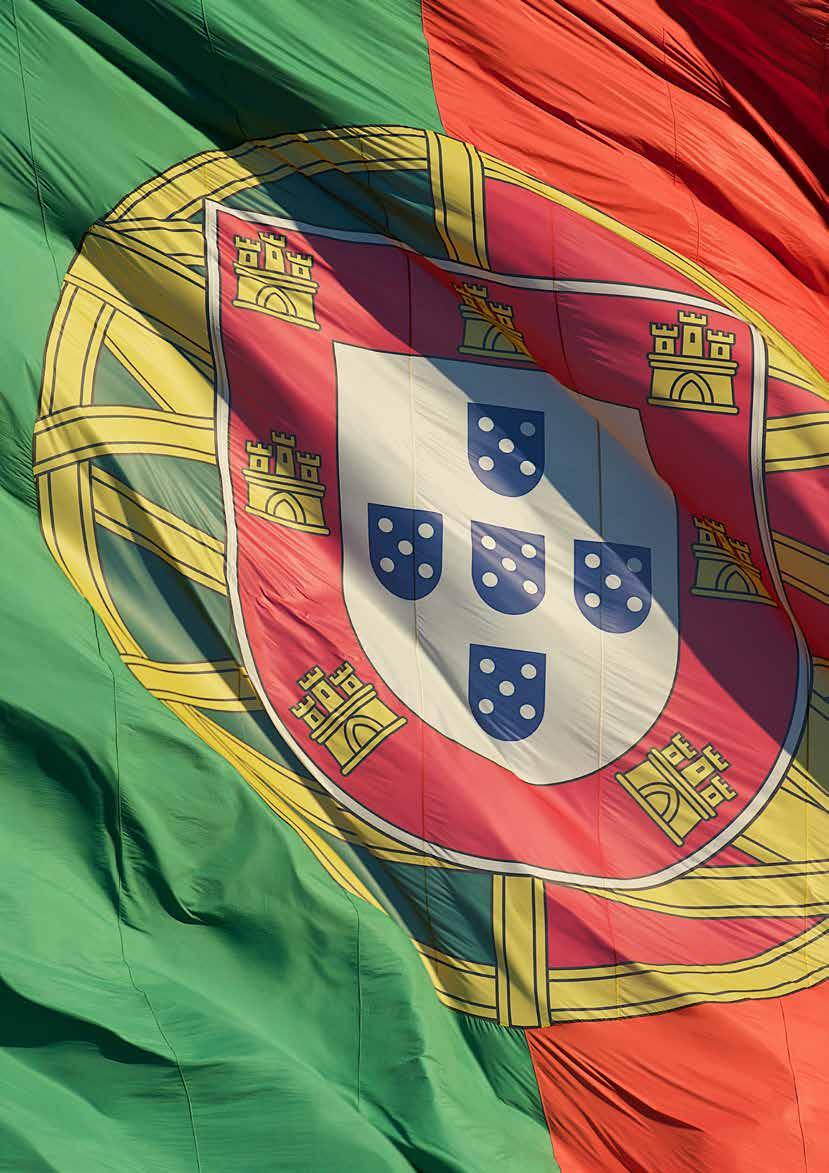
Marcelo Rebelo de Sousa has been President of the Republic since 2016 and was re-elected in the presidential elections held in January 2021. e Chega! candidate André Ventura did well, coming third with 11.93% of the votes, just behind the socialist candidate.
e legislative elections in January 2022 con rmed Chega!’s presence in Portugal’s political landscape, with 12 MEPs compared to only one previously.
e socialist Prime Minister Antonio Costa’s party came rst with 41% of the vote, ahead of Rui Rio’s Social Democratic Party (27 %).
Chega! is now the third party (7%), ahead of Liberal Initiative and the left-wing bloc, both of which received 4% of the vote.
Portugal is tegenwoordig een parlementaire constitutionele republiek met een semi-presidentieel stelsel waarin de president voor vijf jaar wordt gekozen.
Marcelo Rebelo de Sousa is sinds 2016 president van de republiek en werd bij de presidentsverkiezingen van januari 2021 herkozen. André Ventura, de kandidaat van Chega!, deed het goed en werd derde met 11,93% van de stemmen, net achter de socialistische kandidaat.
De parlementsverkiezingen van januari 2022 bevestigden de aanwezigheid van Chega! in het Portugese politieke landschap, met de verkiezing van 12 afgevaardigden, tegenover slechts één voordien.
De partij van de socialistische premier Antonio Costa behaalde de eerste plaats met 41% van de stemmen, vóór de sociaaldemocratische partij van Rui Rio (27%).
Chega! is nu de derde partij, vóór het Liberaal Initiatief en het Linkse Blok, elk met 4% van de stemmen.
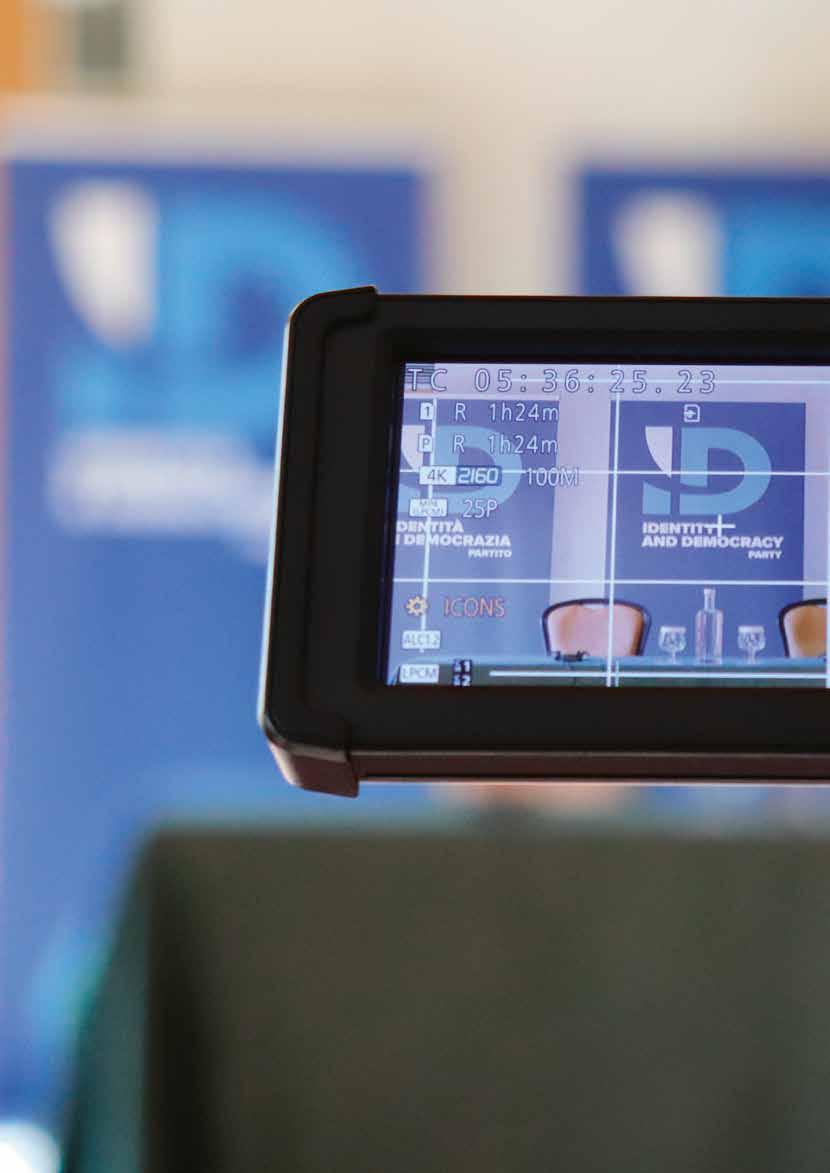

In front of a thousand supporters, the leaders of Identity and Democracy member parties were given the opportunity to enjoy the public’s enthusiasm at the Bourse of Antwerp, one of the nest buildings in Europe, built in 1531 and which quickly became a model for all commodity exchange buildings worldwide.
In addition to being a historic city with an impressive architectural pro le of Art Nouveau buildings, modern buildings, gabled houses and one of the most beautiful railway stations in the world, Antwerp is also a politically patriotic city, where the Vlaams Belang, a member of the ID Party, has always achieved some of its best electoral results.
It was therefore only natural that our European political party should
De leiders van de partijen die lid zijn van Identiteit en Democratie konden in het bijzijn van een duizendtal supporters met volle teugen genieten van het enthousiasme van het publiek in de Handelsbeurs, een van de mooiste gebouwen van Europa dat gebouwd werd in 1531 en al snel model stond voor alle beurzen in de wereld.

Antwerpen is niet alleen een historische stad, met een indrukwekkend architecturaal pro el van art-nouveaugebouwen, moderne panden, puntgevels en een van de mooiste treinstations ter wereld, maar ook een politiek patriottische stad, waar het Vlaams Belang, lid van de ID Partij, altijd een van zijn beste verkiezingsresultaten heeft behaald.
Het was dan ook niet meer dan normaal dat onze Europese politieke par-
gather its leaders there for a major public meeting two years after having welcomed Matteo Salvini. ey were welcomed by Gerolf Annemans, who hails from the city himself.
A distinguished guest, Judit Varga, the Minister of Justice in Hungary, a country that is in the eye of the storm of the European Union authorities for not complying with their injunctions, rightly reminded us of the importance of having a common set of values in order to look to the future with greater optimism.
Marco Campomenosi, representative of the Lega, Martin Helme (Estonia), André Ventura (Portugal), Geert Wilders ( e Netherlands) and Tom Van Grieken (Flanders) then took the oor.

tij haar leiders daar verzamelde voor een grote meeting onder de titel ‘Ons Europa’, twee jaar nadat ze Matteo Salvini al had verwelkomd. Ze werden verwelkomd door Gerolf Annemans, zelf een inwoner van de stad.
Speciale gaste was Judit Varga, minister van Justitie van Hongarije, een land dat de EU-instanties een doorn in het oog is omdat het zich niet plooit naar de bevelen van de Europese Unie. Zij herinnerde ons terecht aan het belang van een gemeenschappelijke reeks waarden om de toekomst optimistischer tegemoet te zien.
Daarna kwam Marco Campomenosi, die de Lega vertegenwoordigde, aan het woord, gevolgd door Martin Helme (Estland), André Ventura (Portugal), Geert Wilders (Nederland) en Tom Van Grieken (Vlaanderen).


e Antwerp Declaration adopted on 23 June 2022
e European continent is undoubtedly at a historical crossroads. With the “Antwerp Declaration”, the European political party Identity and Democracy intends to underline the added value and superiority of the concept of national sovereignty.
Since Brexit, the cooperation of European member states within the European Union has been mainly and paradoxically characterised by the further acceleration of centralisation and by the installation of a unitary state that is substituting for member states. e EU seizes the opportunity provided by every crisis to reinforce and accelerate this development. Such was the case with the Coronavirus crisis, and also appears to be the case with the war in Ukraine.
e conference on the future of Europe was a theatrical performance of selfglori cation, as the ID party had feared from the start. Originally intended to compensate for the democratic de cit caused by the composition of the European Commission in 2019, the conference turned out to be a
Het Europese continent staat ongetwijfeld op een historisch kruispunt. Met de «Verklaring van Antwerpen» wil de Europese politieke partij Identiteit en Democratie de meerwaarde en superioriteit van het concept van nationale soevereiniteit onderstrepen.
Sinds de Brexit wordt de samenwerking van de Europese lidstaten binnen de Europese Unie vooral en paradoxaal genoeg gekenmerkt door een verdere versnelling van centralisatie en de installatie van een eenheidsstaat die in de plaats komt van de lidstaten. De EU grijpt elke crisis aan om deze ontwikkeling te versterken en te versnellen. Dit was het geval met de crisis naar aanleiding van het coronavirus en dit lijkt ook zo te zijn met de oorlog in Oekraïne.
De Conferentie over de Toekomst van Europa was een theatervoorstelling van zelfverheerlijking, zoals de ID Partij vanaf het begin vreesde. Oorspronkelijk bedoeld om het democratisch tekort als gevolg van de samenstelling van de Europese Commissie in 2019 te compenseren, bleek de conferen-
huge failure. A few hundred citizens were selected to participate, and their meetings were manipulated and directed to produce a list of proposals that is basically a copy of the most advanced unitary state projects of the EU. For example, the fact that the migration proposals emanating from the conference essentially mirror, and sometimes literally reproduce, those presented in the Commission’s 2021 Migration Pact, constitutes one

tie een enorme mislukking. Een paar honderd burgers werden geselecteerd voor deelname en hun bijeenkomsten werden gemanipuleerd en gestuurd om een lijst met voorstellen op te stellen die praktisch een kopie is van de meest verregaande eenwordingsprojecten van de EU-eenheidsstaat. Zo is het feit dat de migratievoorstellen van de conferentie in wezen een afspiegeling – en soms een letterlijke weergave – zijn van de voorstellen in het mi-

of the best examples to prove that the outcome of the conference was scripted and determined in advance.
is conference then gave the leftwing and green majority in the European Parliament the opportunity to call these proposals a unique and irreversible path for cooperation on the European continent. ese proposals therefore herald - along with many other things - transnational lists, a European army and the abolition of freedom for all member states. e ID party rejects these socalled conference outcomes, and remains focused solely on European cooperation in which all member states and peoples retain their rights.
e focus should be on restoring power to those states.
e European Union has de nitely embarked on the path of open warfare against its own member states under the guise of the ‘rule of law’ and the ‘conditionality regulation’, which deprives member states that deviate from the aforementioned unitary state strategy of EU funding. Democracy in European cooperation can only be based on the clear and unequivocal consent of free peoples. e latter must be at the centre of this European cooperation, and not a secondary issue in a particular interpretation of abstract and mainly legal principles.
e ID Party also notes that the European Union is keeping the continent’s borders open to an extreme degree. e European Commission’s recently proposed ‘Partnerships for Talent’ programme with North
gratiepact van de Commissie uit 2021, een van de beste voorbeelden dat de uitkomst van de conferentie van tevoren was voorbereid en vastgesteld.
Deze conferentie gaf de linkse en groene meerderheid in het Europees Parlement vervolgens de gelegenheid om deze voorstellen een unieke en onomkeerbare weg naar samenwerking op het Europese continent te noemen. Deze voorstellen beogen dus - naast vele andere zaken - transnationale lijsten, een Europees leger en de afscha ng van de vrijheid van alle lidstaten. De ID Partij verwerpt deze zogenaamde conferentie-uitkomsten en blijft uitsluitend gericht op Europese samenwerking waarin alle lidstaten en volkeren hun rechten behouden. De nadruk moet liggen op het teruggeven van de macht aan de lidstaten.
De Europese Unie is de nitief de weg ingeslagen van een open oorlog tegen haar eigen lidstaten onder het mom van de ‘rechtsstaat’ en het ‘conditionaliteitsmechanisme’, dat lidstaten die afwijken van de eerder genoemde eenheidsstaatstrategie de EU-middelen ontneemt. Democratie in de Europese samenwerking kan alleen gebaseerd zijn op de duidelijke en ondubbelzinnige instemming van vrije volkeren. Deze volkeren moeten centraal staan in deze Europese samenwerking en mogen niet ondergeschikt zijn aan een bepaalde interpretatie van abstracte - voornamelijk juridische - beginselen.
De ID Partij stelt ook vast dat de Europese Unie de open grenzen van het continent steeds extremistischer
African countries, but also with countries further a eld, rea rms the EU’s obsession with anything that can promote mass immigration. Not only does this run counter to the wishes of the majority of the population, it is also in total contradiction with the principle of subsidiarity. e ID party rejects any proposal aimed at weakening a migration policy based on the strict control of external borders and denounces the presence of illegal migrants, who threaten working conditions and promote social con ict. It strongly opposes the migration propaganda narrative that seeks to convince the public of the economic bene ts of mass immigration without considering the social and security costs associated with it.
handhaaft. Het onlangs door de Europese Commissie voorgestelde programma ‘Partnerschappen voor Talent’ met Noord-Afrikaanse landen, maar ook met landen verder weg, bevestigt de obsessie van de EU voor alles wat massa-immigratie bevordert. Dit druist niet alleen in tegen de wensen van de meerderheid van de bevolking, maar is ook volledig in strijd met het subsidiariteitsbeginsel. De ID Partij verwerpt elk voorstel tot afzwakking van een migratiebeleid dat gebaseerd is op een strikte controle van de buitengrenzen en hekelt de aanwezigheid van illegale migranten – allemaal zaken die de arbeidsomstandigheden bedreigen en sociale con icten in de hand werken. Ze is sterk gekant tegen het propagandaverhaal over migratie dat erop gericht is het publiek te overtuigen van de economische voordelen

Gerolf Annemans, voorzitter van de ID Partij, en Jean-François Jalkh, penningmeester van de ID Partij.
e ID Party regrets the war on the European continent that was unleashed after the Russian Federation invaded Ukraine, a country that is fully entitled to its own sovereignty and territorial integrity. Yet the ID Party fears that the European Union will use this crisis to expand its power, namely by reinforcing its existing ideas of a European army within the framework of a centralising European Union. e EU is also shamelessly blaming this war for the consequences of its own failures, such as the in ation caused by the debt economy in the Eurozone.
e ID Party reasserts a clear distinc-
van massa-immigratie zonder rekening te houden met de daarmee gepaard gaande sociale en veiligheidskosten.
De ID Partij betreurt de oorlog die op het Europese continent is ontketend na de inval van de Russische Federatie in Oekraïne, een land dat volledig recht heeft op zijn eigen soevereiniteit en territoriale integriteit. De ID Partij vreest echter dat de Europese Unie deze crisis zal misbruiken om haar macht uit te breiden, met name door haar bestaande ideeën van een Europees leger in het kader van een centraliserende Europese Unie te versterken.
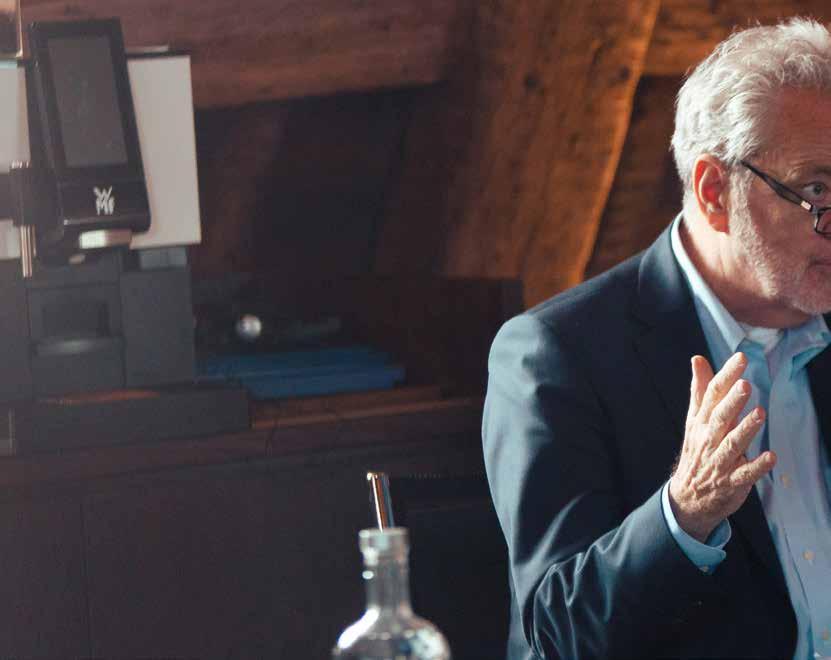
tion between Europe and the European Union. Increasingly, the EU and its current strategy are the antithesis of Europe as a continent, and as a historical unit of civilisation that complements the national identities of its di erent peoples.
For these reasons, the current ID Party members embraced the following 8 principles on 23 June 2022.
De EU geeft deze oorlog ook schaamteloos de schuld van de gevolgen van haar eigen falen, zoals de in atie door de schuldeneconomie in de eurozone.
De ID Partij ziet een duidelijk onderscheid tussen Europa en de Europese Unie. De Europese Unie en haar huidige strategie zijn steeds meer de antithese van Europa als continent en als historische beschavingseenheid die de nationale identiteit van de afzonderlijke volkeren aanvult.
Om deze redenen nemen de huidige leden van de ID Partij op 23 juni 2022 de volgende 8 principes ter harte.
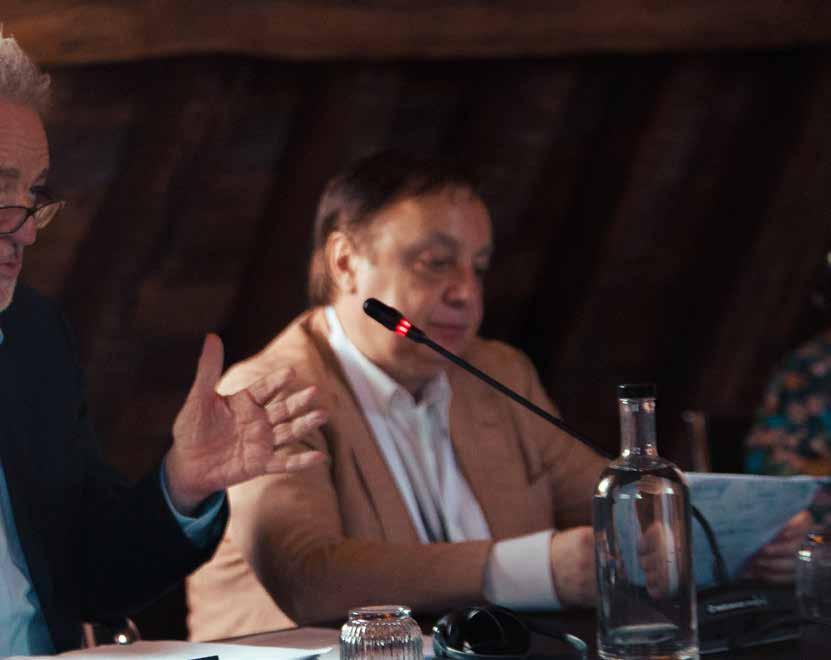
1. Does not consider itself bound in any way by the outcome of the Future of Europe conference and the resulting centralising political agenda.
2. Rejects the introduction of transnational lists and the standardisation of electoral laws.
3. Rea rms that European cooperation must be pursued on a free and voluntary basis and cannot be replaced by a so-called quali ed majority.
4. Rejects the ‘conditionality regulation’ that seeks to force member states to unconditionally comply with the centralised EU line.
5. Is opposed to the creation of a European army.
1. Acht zich geenszins gebonden door het resultaat van de Conferentie over de toekomst van Europa en de daaruit voortvloeiende centraliserende politieke agenda.
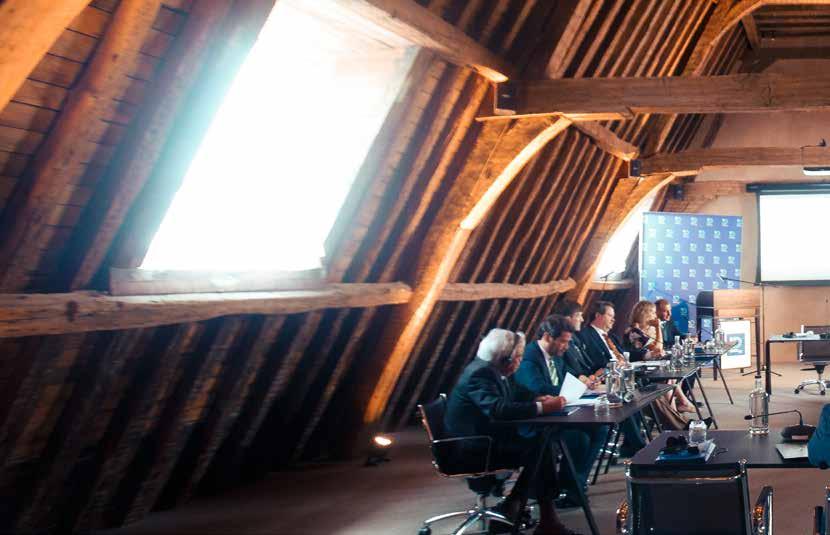
2. Verwerpt de invoering van transnationale lijsten en de standaardisering van de kieswetten.
3. Bevestigt dat de Europese samenwerking op vrije en vrijwillige basis voortgezet moet worden en niet vervangen kan worden door een zogenaamde gekwali ceerde meerderheid.
4. Verwerpt het ‘conditionaliteitsmechanisme’ dat de lidstaten wil dwingen zich onvoorwaardelijk aan de lijn van de gecentraliseerde Europese Unie te houden.
6. Rejects the way in which the European Union is further blurring Europe’s borders, turning them into a management zone of migration rights rather than the geographical limits of the continent aimed at safeguarding and protecting European citizens.
7. Only remains committed to European cooperation in which all member states and peoples retain their respective rights. Emphasis must be placed on restoring power to the member states.
8. Calls for very strong cooperation between all patriotic and/ or conservative forces in view of the European elections in 2024.
Vergadering tussen de leden van de ID Partij
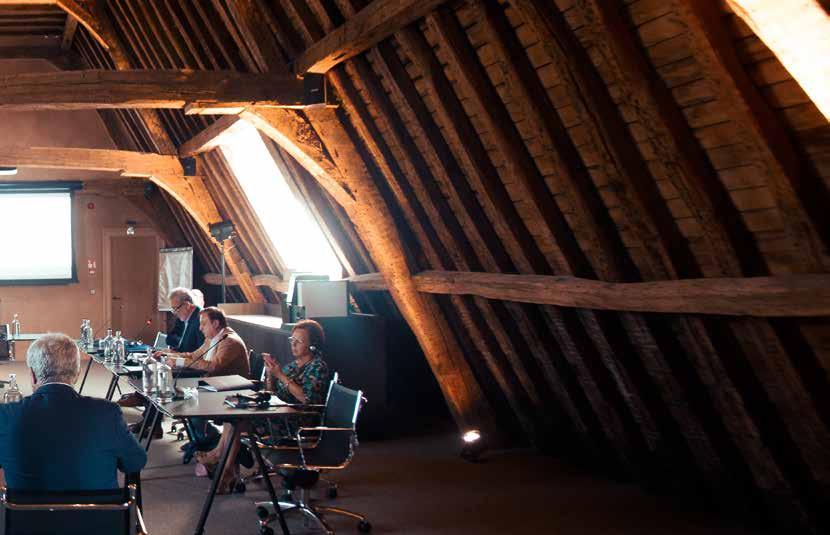
5. Is tegen de oprichting van een Europees leger.
6. Verwerpt de wijze waarop de Europese Unie de grenzen van Europa steeds verder doet vervagen met een beheer van migratierechten in plaats van de geogra sche grenzen van het continent waar de eigen Europese burgers bewaakt en beschermd worden.
7. Blijft zich uitsluitend inzetten voor een Europese samenwerking waarin alle lidstaten en volkeren hun rechten behouden. De nadruk moet liggen op het teruggeven van de macht aan de lidstaten.
8. Roept op tot een intense samenwerking tussen alle patriottische en/of conservatieve krachten met het oog op de Europese verkiezingen van 2024.
Gerolf Annemans, president of the Identity and Democracy party: “Ideas bind us, but friendship, trust and our common struggle against the establishment bind us further still.”
As master of ceremonies, Gerolf Annemans introduced an evening marked by European cooperation between the patriotic parties “for whom culture and the nation take precedence over all else”.
e President of the ID Party made a point of mentioning that these polit-
Als trotse gastheer leidde Gerolf Annemans een avond in die in het teken stond van Europese samenwerking tussen patriottische partijen «voor wie cultuur en natie voorrang hebben op al de rest».
De voorzitter van de ID Partij herinnerde eraan dat deze politieke forma-

ical formations are gaining more and more ground in an increasing number of European countries, each party being stimulated by the electoral victory of the other.
From the outset, Gerolf Annemans sets the record straight on concepts that are sometimes confused: “A very clear distinction must be made and respected between, on the one hand,
ties in een toenemend aantal landen van het Europese continent steeds meer ruimte krijgen, waarbij elke partij wordt gestimuleerd door de verkiezingsoverwinning van de andere.
Gerolf Annemans schepte meteen duidelijkheid over begrippen die vaak verward worden: «Er moet een zeer duidelijk onderscheid gemaakt en gerespecteerd worden tussen enerzijds

Europe (the civilisation we have inherited from our parents, and of which we are proud) and, on the other hand, the European Union (a legal organisation and power hub that is spiralling out of control).”
While ideas bind each of the parties represented in Antwerp, friendship, trust and the common ght against the establishment bind us further still,
Europa, de beschaving die we van onze ouders geërfd hebben en waarop we trots zijn en anderzijds de Europese Unie, een juridische organisatie en machtsconcentratie die volledig onbeheersbaar wordt.»
Binden de ideeën elk van de partijen die in Antwerpen vertegenwoordigd zijn, dan doen vriendschap, vertrouwen en de gezamenlijke strijd tegen

according to Gerolf Annemans, who calls on “all patriotic and conservative forces to work together more than ever before in the run-up to the European elections in 2024. Failing which, the European Union will force the member states to govern against their own people, as we know only too well here in Flanders. Together we are the strength of the future, and we must therefore work together whenever and wherever we can. at is why we want to inject new impetus into this important initiative today, because it is necessary.”
is joint force of patriotic parties now seems essential to in uence the political line of the greatest Europhiles, namely Emmanuel Macron, who were badly shaken by the presidential and legislative elections which, less than a week before the meeting, had propelled an impressive number of RN MEPs to the Assembly. Gerolf Annemans wryly predicted Macron’s “di cult, yes di cult, really di cult” life after the electoral blow he had just su ered because “something happened that would have been unthinkable in the context of the totally unfair French electoral system: a popular rebellion and a record number of absolute majorities in many constituencies put our friends from the Rassemblement National where they belong: at the very heart of every political attention.”
Elsewhere in Europe, patriotic forces are already in power, notably in Hungary, where Judit Varga, Minister of Justice, a young married mother of three and lawyer initially specialised
het establishment dat volgens Gerolf Annemans des te meer: hij riep alle patriottische en conservatieve krachten op “om meer dan ooit samen te werken in de aanloop naar de Europese verkiezingen van 2024, anders zal de Europese Unie de lidstaten dwingen tegen hun eigen volk te regeren, zoals we hier in Vlaanderen maar al te goed weten. Samen zijn we de kracht van de toekomst en daarom moeten we samenwerken waar we kunnen. Daarom willen we dit belangrijke initiatief vandaag een nieuwe impuls geven want het is noodzakelijk.»
Deze gemeenschappelijke kracht van patriottische partijen lijkt vandaag essentieel om de politieke lijn van de grootste euro elen om te buigen, meer bepaald van Emmanuel Macron, die ‘zwaar geschokt’ was door de presidents- en parlementsverkiezingen die minder dan een week vóór de bijeenkomst een indrukwekkend aantal RN-afgevaardigden in het Franse parlement gekatapulteerd hebben. Het was met enige ironie dat Gerolf Annemans zich vlot het “moeilijke, ja moeilijke, echt moeilijke” leven van Macron na de electorale klap voor de geest kon halen want “er was iets wat ondenkbaar was in de context van het volstrekt oneerlijke Franse kiesstelsel maar toch gebeurde: een volksopstand en een recordaantal absolute meerderheden in veel kiesdistricten zetten onze vrienden van het Rassemblement waar ze horen: in het centrum van alle politieke aandacht.”
een voorbeeld voor ons allen
Elders in Europa zijn de patriottische
in European politics, but gradually involved in the political breakthrough of an incredibly powerful patriotic movement for her native country, represented the country at the big meeting.
Present that day in Brussels for a European summit, she was welcomed on stage by Gerolf Annemans himself, who stressed how very proud he was to welcome a high-level representative who symbolises the struggle underway, and is showing us how to develop further European cooperation between conservative and patriotic forces: “I have always greatly appreciated all her speeches describing and defending the conservative values of our civilisation and cultural identity. I also appreciate her style of government. She too is an example for us all. When the interests of her own people are at stake, she turns into a hard-headed woman with one single line of conduct: our people rst. Or, in her own words: the fatherland rst!”
krachten al aan de macht, met name in Hongarije, dat op de grote bijeenkomst vertegenwoordigd was door Judit Varga, minister van Justitie, een jonge vrouw, getrouwd en moeder van drie, advocate en aanvankelijk gespecialiseerd in Europese politiek. Gaandeweg raakte ze betrokken bij de politieke doorbraak van een ongeloo ijk krachtige patriottische beweging voor haar geboorteland en de partij die dat symboliseert: Fidesz.
Ze was die dag aanwezig geweest in Brussel voor een Europese top en werd op het podium verwelkomd door Gerolf Annemans, die zei erg trots te zijn een vertegenwoordiger op hoog niveau als gast te hebben die symbool staat voor de strijd die gevoerd wordt en die toont hoe belangrijk het is om de Europese samenwerking tussen conservatieve en patriottische krachten verder te ontwikkelen: «Ik heb al haar toespraken waarin ze de conservatieve waarden van onze beschaving en culturele identiteit beschrijft en verdedigt, altijd erg gewaardeerd. Ik waardeer ook haar stijl van regeren. Ook zij is een voorbeeld voor ons allen. Als de belangen van haar eigen volk op het spel staan, verandert ze in een harde tante die maar één koers volgt: ons volk eerst. Of, in haar eigen woorden: Het vaderland eerst!»
e Hungarian Minister of Justice Judit Varga was the guest of honour at the Identity and Democracy party’s grand meeting. Her country is often the object of attacks from the European Union, which did not hesitate to activate the conditionality regulation against it, linking the granting of European funds to the observance of the rule of law... the de nition of this principle being left to the discretion of the most Europeist among them.
In reality, the European Union intends to sti e, by all means possible, the expression of a di erent vision of European cooperation. For Judit Varga, “the European Union is building a hegemony of opinion. In Hungary we are in favour of a plurality of opinions, which I also feel to be the case here. We naturally believe we should be entitled to represent our own interests.”
Satis ed that her country is not alone in cultivating this vision, and that more and more people are realising that we do not need such a liberal delusion, the Hungarian minister reiterated that
De Hongaarse minister van Justitie Judit Varga was dus de eregast op de grote bijeenkomst van de partij Identiteit en Democratie. Haar land is vaak het voorwerp van aanvallen van de Europese Unie, die niet geaarzeld heeft om het conditionaliteitsmechanisme tegen haar in werking te stellen, waarbij de toekenning van Europese fondsen gekoppeld wordt aan de eerbiediging van de rechtsstaat... de de nitie van dit beginsel wordt overgelaten aan de grootste europeanisten.
In werkelijkheid wil de Europese Unie met alle middelen de uitdrukking van een andere visie op Europese samenwerking in de kiem smoren. Voor Judit Varga «bouwt de Europese Unie aan een hegemonie van een mening. Wij zijn voorstander van een pluraliteit van meningen in Hongarije, wat ik ook hier voel. We vinden het vanzelfsprekend dat we onze belangen kunnen behartigen.”
De Hongaarse minister – tevreden dat haar land niet het enige is met deze visie en dat steeds meer mensen be-
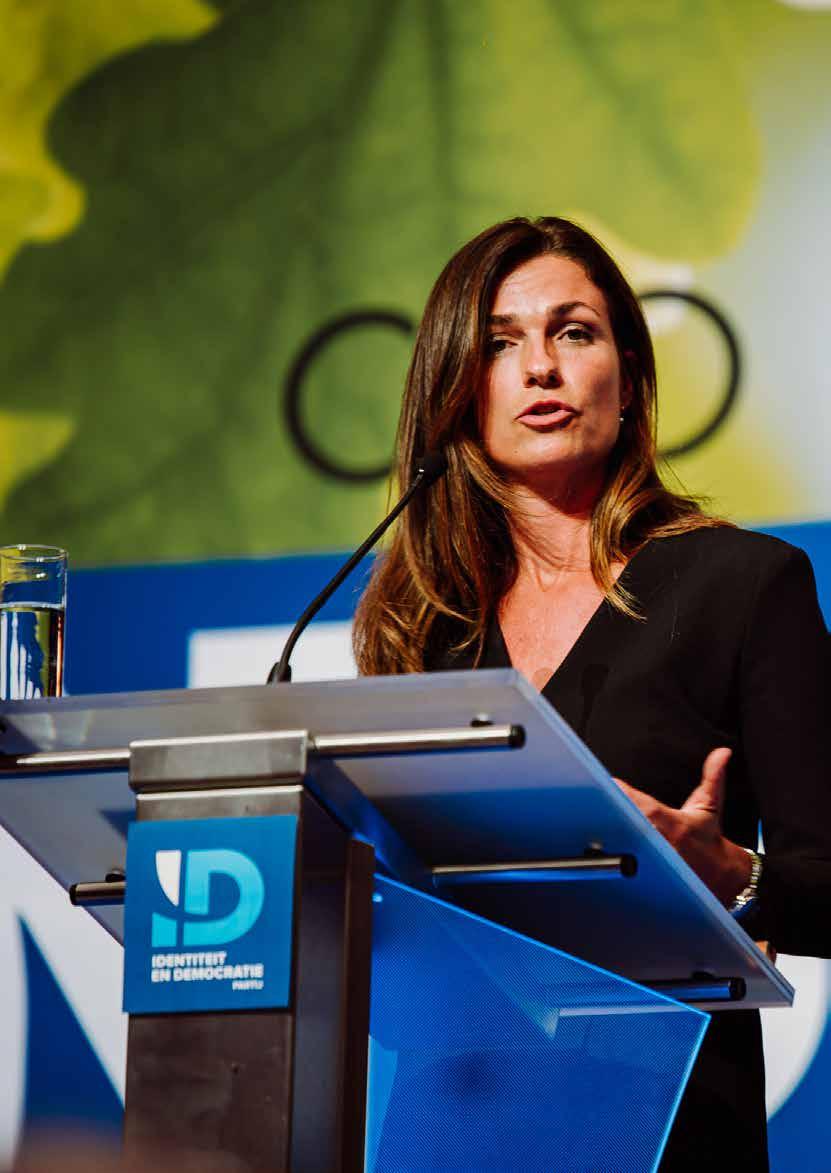
the future of the European Union lies in its ability to structure its cooperation with di erent countries, nations, cultures and societies: “We may have di erent views on the policies to be pursued, but we all share the idea that the Union must be founded on strong nations grounded in their JudeoChristian roots. We all want a Europe that is proud of its historical and cultural heritage.”
Europe is facing a crucial moment in history, and is confronted with major challenges enumerated by Judit Varga: massive illegal immigration, a di cult economic situation that is a ecting the daily lives of citizens, the declining birth rate, the health crisis and the war
se en dat we de liberale illusie niet nodig hebben – herinnerde eraan dat de toekomst van de Europese Unie ligt in haar vermogen om samenwerking tussen verschillende landen, naties, culturen en samenlevingen te organiseren: “We mogen dan al verschillende opvattingen hebben over het te voeren beleid, we delen allemaal de gedachte dat de Unie gestoeld moet zijn op sterke naties, gebaseerd op haar joods-christelijke wortels. We willen allemaal een Europa dat trots is op zijn historisch en cultureel erfgoed.”
Europa staat voor een belangrijke historische periode en wordt geconfronteerd met grote uitdagingen. Judit

on Europe’s borders, all of which are aggravated by the destructive ideology of the left-wing and the liberals who have lost their core values.
In the face of liberal forces, it is important to unite our patriotic forces. To do so, she added, “we need strong parties in each of the nation states, and we need to prioritise the ght for the well-being of our people, and the real issues they are facing.”
Judit Varga did not hesitate to reiterate the foundations of her country’s constitution, based on the rule of law, and the history of her people, and insisted on the strength of the Hungarian model, marked in
Varga somde ze op: massale illegale immigratie, een economie die in zo’n zwaar weer is terechtgekomen dat het dagelijkse leven van de burgers eronder lijdt, het dalende geboortecijfer, de gezondheidscrisis en de oorlog aan de Europese grenzen. Al deze problemen zijn verergerd door de destructieve ideologie van links en van de liberalen die hun authentieke waarden zijn kwijtgeraakt.
In de strijd tegen liberale krachten is het belangrijk om de patriottische krachten te verenigen. Om dat te doen, zo voegde ze eraan toe, “hebben we partijen nodig die sterk zijn in elk van de natiestaten, met als prioriteit de strijd voor het welzijn en de echte
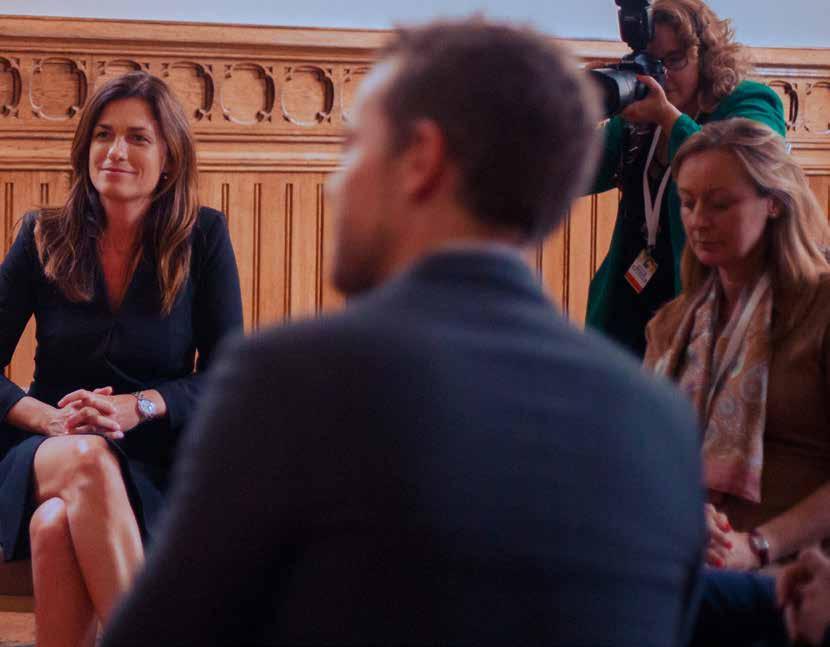
particular by pluralism in the media, in debates and in public life. Moreover, she urged the participants to take note of her advice on how to deal with political opponents. She called this the “Hungarian recipe” with a list of twelve ingredients:
1. We must act according to our own rules: the only way to win is to refuse the solutions put forward by others, because we are certain to lose when we accept to play according to the rules of our opponents.
2. When issues and topics are important, people do not favour left-wing policies. We need to shed light on the debate by exposing leftwing policies that are out of touch with reality.
3. In matters of foreign policy we must act in favour of national interests. Progressives believe that foreign policy is an ideological battle between good and evil.
4. It is important for us to have our own media, seeing as left-wing ideas are generally prevalent in the media.
5. We must overcome the taboos, and this is our most di cult task. In Hungary, we have always exposed what the left-wing party intends to achieve before it takes action.
6. Economics, economics and economics: we must only pursue policies that bene t the greatest number of citizens; at the end of the day, people want jobs and
problemen van de mensen”.
Judit Varga aarzelde niet te herinneren aan de grondslagen van de grondwet van haar land, gebaseerd op de rechtsstaat, en aan de geschiedenis van haar volk. Ze benadrukte de kracht van het Hongaarse model, dat met name gekenmerkt wordt door pluralisme in de media, in debatten en in het openbare leven. Bovendien drong ze er bij de deelnemers op aan om nota te nemen van enkele adviezen over de omgang met politieke tegenstanders. Ze noemde dit het “Hongaarse recept”, opgesplitst in twaalf punten:
1. We moeten handelen volgens onze eigen regels: de enige manier om te winnen, is de ‘oplossingen’ die anderen voorstellen te weigeren omdat men zeker verliest als men ermee instemt te spelen volgens de spelregels van de tegenstander.
2. Wanneer de inzet en onderwerpen belangrijk worden, houden mensen niet van het beleid van links. We moeten licht brengen in het debat door het beleid van links dat ver van alle realiteit staat aan de kaak te stellen.
3. In het buitenlands beleid moeten we handelen volgens de nationale belangen. Progressieven geloven dat buitenlands beleid een ideologische strijd is tussen goed en kwaad.
4. Het is belangrijk om eigen media te hebben, omdat we vaststellen dat linkse ideeën daarin meestal oververtegenwoordigd zijn.
a better life for themselves and their children, not economic theories.
7. We must not be drawn to extremes!
8. All leaders should have solid foundations and be well prepared. A conservative should read up on a daily basis. We need to devote time to understanding this increasingly complex world.
9. We must have faith! ose who don’t believe that they will be accountable before God will assume that they can do whatever they like.
10.We must make friends and discover what unites us rather than what divides us at every level.
11. e fewer communities there are, and the more isolated people are, the more votes will go to the Liberals. e more communities there are, the more votes we will get!
12.We must build an institution that has the potential to renew both ideas and politicians.
5. We moeten taboes doorbreken, wat de moeilijkste taak is. In Hongarije hebben we altijd vooraf onthuld wat links wil bereiken voordat ze actie ondernemen.
6. Economie, economie en economie: zet alleen beleidslijnen uit die de meerderheid van de burgers ten goede komen; uiteindelijk willen mensen banen en een beter leven voor zichzelf en hun kinderen, geen economische theorieën.
7. Laat je nooit tot extremen leiden!
8.
Alle leiders moeten een solide basis hebben en goed voorbereid zijn. Een conservatieve politicus moet elke dag presteren. We moeten tijd uittrekken om de steeds complexere wereld te begrijpen.
9. Heb vertrouwen! Als je niet gelooft dat je verantwoording moet a eggen aan God, zul je denken dat je alles mag doen.
10.Maak vrienden en kijk - op alle niveaus - wat ons samenbrengt in plaats van wat ons verdeelt.
11.Hoe minder gemeenschapsgevoel er is en hoe meer mensen geïsoleerd zijn, hoe meer stemmen er naar de liberalen zullen gaan; hoe meer gemeenschappelijkheid er is, hoe meer stemmen wij zullen krijgen!
12.We moeten een instelling opbouwen die het potentieel heeft om zowel ideeën als het politieke personeel te vernieuwen.
Geert Wilders, president of the Partij voor de Vrijheid party: “We choose enlightenment in the face of obscurantism.”
In Antwerp, where, according to Geert Wilders, some streets now look more like Afghanistan than Flanders, he introduced his speech with the words of the Vlaamse Leeuw, the Flemish anthem. Does he still feel welcome in this city?
“I always feel at home here with you. You are far more than friends. We are a family. It is also fantastic to see that our party, with its emphasis on identity, is getting stronger and stronger.
is international cooperation of patriotic parties is what we desperately need, because many people, that is to say patriots, love their country. But the harsh reality is that we are losing our countries to immigrants, Islam and EU bureaucrats.
Geert Wilders gebruikte de tekst van de Vlaamse Leeuw om zijn toespraak in te leiden in Antwerpen, waar volgens hem sommige straten nu meer op Afghanistan dan op Vlaanderen lijken. Maar voelt hij zich nog steeds welkom in deze stad?
«Ik voel me altijd thuis bij jullie. Jullie zijn meer dan vrienden. We zijn een familie. Het is ook geweldig om te zien dat onze partij, met haar nadruk op identiteit, steeds sterker wordt. Deze internationale samenwerking van patriottische partijen is wat we hard nodig hebben want er zijn veel mensen die van hun land houden: patriotten. Maar de harde realiteit is dat we onze landen verliezen en overlaten aan immigranten, de islam en EU-bureaucraten.
Not only Antwerp, but large swathes of many Western European cities have become chunks of foreign countries. Neighbourhoods are di cult to recognise with their black veils, burqas, mosques, Islamic schools and halal butcher’ shops. Muslim girls and women are subjected to genital mutilation on a large scale. In the Netherlands alone, 41,000 girls and women are concerned by this.
Terror is creeping into our cities. e ideology of unfreedom and oppression is growing everywhere because for decades we have been ruled by politicians who do not care about our culture. ey believe that we are being discriminatory when we say that our culture is based on the Judeo-Christian values of freedom and equality, and that Islam is not part of that.”
In so doing, Geert Wilders went on to challenge an elite of soulless politicians who are destroying countries in the name of their open borders and mass immigration policy, the same ones who, according to him, are increasing the fact that we are becoming or have already become a minority in our own streets, neighbourhoods and cities, while masses of nancially-assisted asylum seekers ood our territory.
Meanwhile, ‘ordinary’ citizens are struggling to pay their bills or do their shopping: for the president of the Partij voor de Vrijheid party, this is living proof that people have had enough, and that they want to preserve their own country and their own identity: “With this massive rally, we are ghting back and saying to the
Niet alleen Antwerpen, maar grote delen van vele West-Europese steden zijn stukjes buitenland geworden. Wijken worden onherkenbaar met zwarte sluiers, boerka’s, moskeeën, islamitische scholen en halal-slachthuizen. Moslimmeisjes en -vrouwen worden op grote schaal onderworpen aan genitale verminking. In Nederland alleen al gaat het om 41.000 gevallen.
Terreur neemt bezit van onze steden. De ideologie van onvrijheid en onderdrukking groeit overal. Omdat we al tientallen jaren geregeerd worden door politici die niets om onze cultuur geven. Zij denken dat wij discrimineren als we zeggen dat onze cultuur gebaseerd is op joods-christelijke waarden van vrijheid en gelijkheid en dat de islam daar geen deel van uitmaakt.»
Geert Wilders liet dus niet na de elite van zielloze politici uit te dagen die in naam van hun open grenzen en massa-immigratiebeleid landen verwoesten. Diezelfde politici zijn er volgens hem voor verantwoordelijk dat wij in onze eigen straten, wijken en steden een minderheid worden of al zijn geworden, terwijl massa’s asielzoekers voor wie alles wordt betaald ons grondgebied binnenkomen.
Ondertussen hebben ‘gewone’ burgers de grootste moeite om hun rekeningen te betalen of boodschappen te doen: voor de voorzitter van de Partij voor de Vrijheid zijn zij het levende bewijs dat mensen die er genoeg van hebben, blijk geven van gezond verstand door hun eigen land en eigen identiteit te willen behouden: “Met
unscrupulous observers: this is our country! Flanders is ours. Belgium is ours. e Netherlands is ours. France is ours. Italy is ours. Austria is ours. e Czech Republic is ours. Estonia is ours. Portugal is ours.”
Just as Gerolf Annemans had said in his introduction that Guy Verhofstadt is even more of a Europeist than Emmanuel Macron, Geert Wilders did not shy away from criticising

deze massale bijeenkomst vechten we terug en zeggen we tegen de gewetenloze waarnemers: dit is ons land! Vlaanderen is van ons! Nederland is van ons! Frankrijk is van ons! Italië is van ons! Oostenrijk is van ons! Tsjechië is van ons! Estland is van ons! Portugal is van ons!”
In navolging van Gerolf Annemans, die in zijn inleiding had gezegd dat er in de persoon van Guy Verhofstadt
the liberal politician: “Do you hear me clearly, Sheikh Guy Verhofstadt? Europe is not yours, but ours. I know, Mister Guy, that you and the unelected bureaucrats of the European Commission would rather erase our countries from the map. at you want to sacri ce our sovereignty, reduce our rights of veto, take our money, just to give even more power to this wretched European Union. I also know that you want to ood
nog meer europeanist schuilt dan in Emmanuel Macron, aarzelde ook Geert Wilders niet om de liberale politicus te bekritiseren: «Luister goed, sjeik Guy Verhofstadt? Europa is niet van jullie, maar van ons! Ik weet, mijnheer Guy, dat u en de ongekozen bureaucraten van de Europese Commissie onze landen liever zouden afscha en. Dat u onze soevereiniteit wilt opo eren, onze vetorechten wilt beperken, ons geld wilt afpakken, alleen maar om
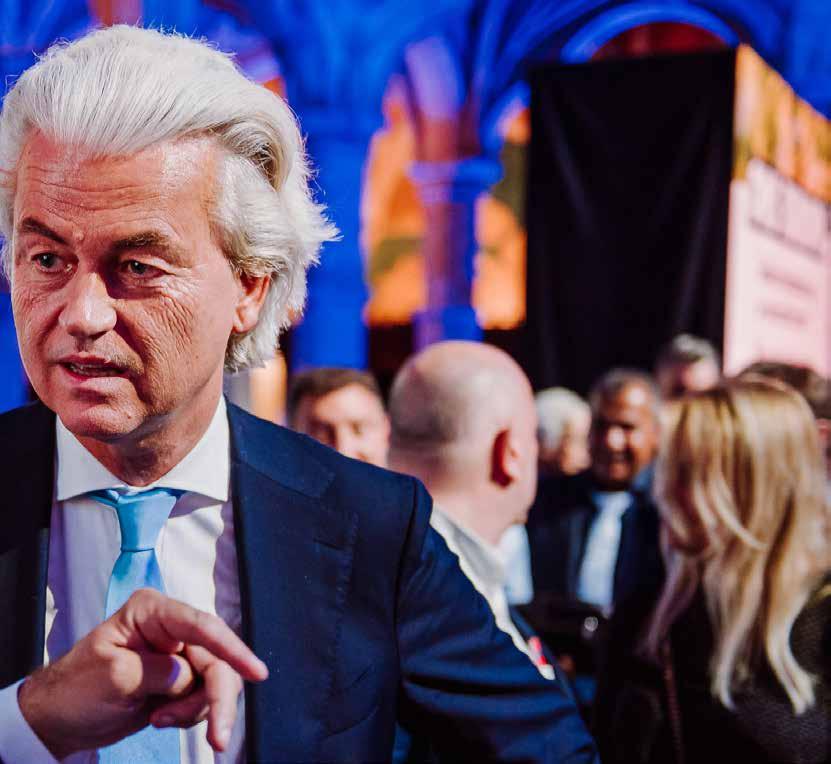
Europe with even more non-Western migrants although we are already overpopulated and full to the brim. I know that you choose to relinquish our culture because the only identity you cherish is narrow nihilism and cultural relativism,” before concluding: “You won’t succeed! We do not want your European Union. Because we believe in true democracy. And true democracy requires strong, sovereign and independent nation states!”
One month before the meeting, Geert
deze ellendige Europese Unie nog meer macht te geven. Ik weet ook dat u Europa wilt overspoelen met nog meer niet-westerse migranten terwijl we al overbevolkt en verzadigd zijn. Ik weet dat u onze cultuur wilt opgeven omdat de enige identiteit die u koestert eng nihilisme en cultureel relativisme is.» En hij voegde eraan toe: «Het zal u niet lukken! Wij willen uw Europese Unie niet. Omdat we geloven in echte democratie. En echte democratie vereist sterke, soevereine en onafhankelijke natiestaten!»
“We choose enlightenment. We are for security, for sovereignty, for freedom. We opt for our Judeo-Christian civilisation.”
Wilders had been banned from entering the municipalities of Molenbeek and Anderlecht in Brussels, although “terrorists are allowed in”. is time, he was given a warm welcome at the Handelsbeurs in Antwerp, where he did not fail to remind those present of the importance of concerted action between patriots, in the face of forces hostile to the notion of identity: “Everywhere we see the leftist-liberal elite preaching the gospel of wokeism while brandishing the rainbow ag. is ugly dictatorship of woke, with its sti ing and coercive identity policy, is
Een maand vóór de bijeenkomst was Geert Wilders de toegang tot de Brusselse gemeenten Molenbeek en Anderlecht ontzegd terwijl «terroristen wel worden toegelaten». Deze keer werd hij goed ontvangen op de Handelsbeurs in Antwerpen, waar hij niet naliet te herinneren aan het belang van een gezamenlijk optreden van patriotten tegen krachten die vijandig staan tegenover het begrip identiteit: «Overal zien we de links-liberale elite het evangelie van het wokisme prediken, zwaaiend met de regenboogvlag.
“kiezen wij voor de Verlichting; wij zijn voor veiligheid, voor soevereiniteit, voor vrijheid; wij kiezen voor onze joods-christelijke beschaving.”
reminiscent of the worst totalitarian regimes. In this respect, wokeism and Islam are very similar. ey both want to take the upper hand and impose their will on us. Nothing is tolerated and everyone has to bow down. And if you resist, you are a victim of cancel culture. But I will not bow down (...) We will not bow down. We speak the truth.”
e Dutch leader naturally reiterated the foundations of our identity, the desire to preserve traditions, family, culture, the refusal to be replaced. In the face of obscurantism “we choose enlightenment. We are for security, for sovereignty, for freedom. We opt for our Judeo-Christian civilisation.” And he ended with a heartfelt declaration of love for “a civilisation that we can be proud of, and can be passed on to future generations. We want to live in strong, independent and proud sovereign nations, and this is why we must continue to ght with all the democratic means at our disposal. As former US President Ronald Reagan once said, when you can’t make them see the light, make them feel the heat. And that is exactly what we are doing. To oppose the power merchants of the European Union, to oppose the Islamisation of our countries, and to defend our freedom.”
Deze lelijke dictatuur van de woke, met haar verstikkende en dwingende identiteitspolitiek, doet denken aan de ergste totalitaire regimes. In dit opzicht lijken het wokisme en de islam erg op elkaar. Ze willen allebei domineren en ons hun wil opleggen. Niets mag en iedereen moet buigen. En als je je verzet, ben je een slachto er van de «cancelcultuur». Maar ik buig niet (...) Wij buigen niet. Wij benoemen de realiteit.»
Natuurlijk herinnerde de Nederlandse leider aan de fundamenten van onze identiteit, de wens om tradities, het gezin, de cultuur te bewaren, de eis om niet vervangen te worden. Tegenover het obscurantisme «kiezen wij voor de Verlichting; wij zijn voor veiligheid, voor soevereiniteit, voor vrijheid; wij kiezen voor onze joods-christelijke beschaving». En hij eindigde met een liefdesverklaring voor «een beschaving waarop we trots kunnen zijn en die we kunnen doorgeven aan toekomstige generaties». Wij willen leven in sterke, onafhankelijke en trotse soevereine naties. Daarom moeten we blijven vechten met alle democratische middelen die ons ter beschikking staan. Zoals de voormalige Amerikaanse president Ronald Reagan ooit zei: “Als je ze het licht niet kunt laten zien, laat hen dan de hitte voelen.” En dat is precies wat we doen. Om ons te verzetten tegen de machtswellustelingen van de Europese Unie, om ons te verzetten tegen de islamisering van onze landen en om onze vrijheid te verdedigen. «
Delighted with the energy generated by the gathering and the large number of supporters, Tom Van Grieken also thinks that it makes opponents nervous as they have to fall back on half-truths and lies in order to exist. In so doing, he echoes the articles in the press about the great patriotic event.
Once and for all, the president of Vlaams Belang took the opportunity to reject the ‘extreme right-wing’ label: “Are we extreme because we want a policy that people nally vote for? Or are they extreme because their policies are extremely di erent from what the average European wants? Are we extreme because we in Europe have been warning people for years about the consequences of open borders and mass immigration? Or are
Tom van Grieken was blij met het enthousiasme van de zaal en de energie van de massaal opgedaagde sympathisanten. Zulks maakt volgens hem de tegenstanders ook nerveus. Om te kunnen blijven bestaan, moeten ze terugvallen op halve waarheden en leugens. Hij zinspeelde hiermee op de artikelen die in de pers zijn verschenen over de grote patriottische meeting.
De voorzitter van het Vlaams Belang maakte van de gelegenheid gebruik om voor eens en altijd komaf te maken met het etiket extreemrechts: «Zijn wij extreem omdat we een beleid willen waar mensen uiteindelijk voor stemmen? Of zijn zij extreem omdat hun beleid sterk afwijkt van wat de gemiddelde Europeaan wil? Zijn wij extreem omdat we in Europa al jaren waar-
Tom Van Grieken, president of Vlaams Belang: “We are the remedy against globalism and multiculturalism.”

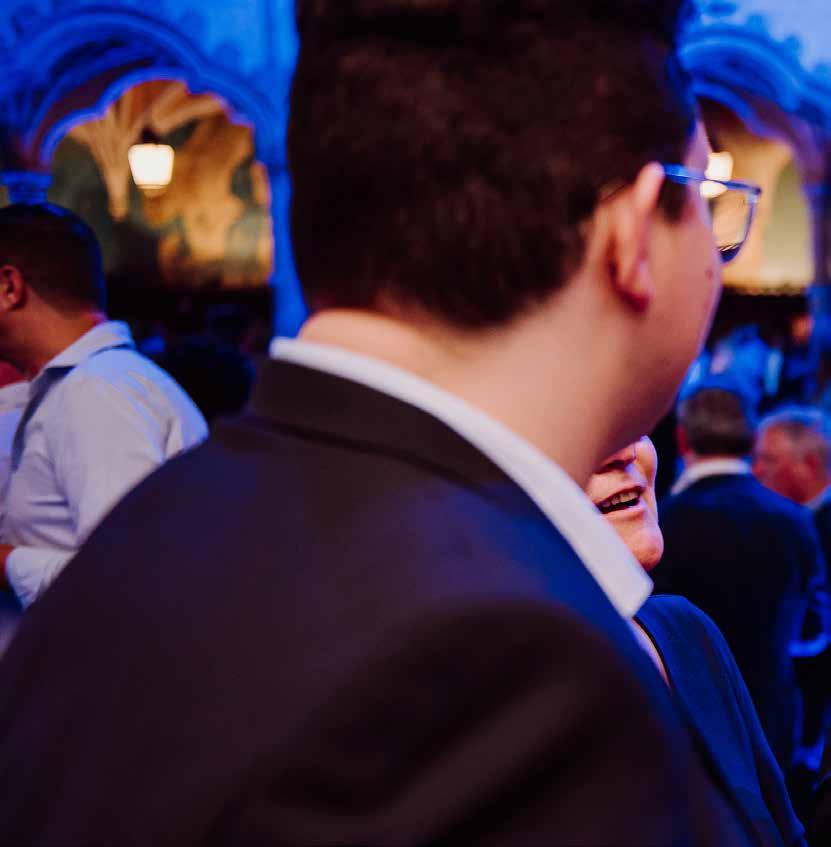
they extreme because, against their will, they have created this situation through multicultural dogmatism or cowardly complicity?”
For Tom Van Grieken “Nationalism is not about hating other people but about truly loving one’s nearest and dearest.
schuwen voor de gevolgen van open grenzen en massa-immigratie? Of zijn zij extreem omdat ze tegen hun gezond verstand in deze situatie hebben gecreëerd door multicultureel dogmatisme of la e medeplichtigheid?»
Voor Tom Van Grieken is «nationalis-
Just as a mother loves her children, we love our respective peoples.” And to respect them, there is nothing like a Europe of independent nation states, where identity, sovereignty, values and standards are observed. In short, a Europe made up of diversity, “not in the leftist and globalist sense,
me geen haat jegens anderen, maar pure liefde voor de eigen mensen. Zoals een moeder van haar kinderen houdt, zo houden wij van onze respectieve volkeren. En om die te respecteren, gaat er niets boven een Europa van onafhankelijke natiestaten, waar identiteit, soevereiniteit, waarden en

but in the nationalist sense: Hungary must remain Hungarian, France must remain French, the Netherlands must remain Dutch, and of course our Flanders must remain Flemish!”
De ning patriots as freedom ghters seeking to protect Europe, he sees them as the parties of the future, in contrast to the old parties “from the last century with old outdated ideas and failed recipes” and politicians who are no longer in touch with reality, such as Belgian Prime Minister Alexander De Croo: “Not only do these personalities systematically sacri ce our interests in exchange for a top job, they also export the Belgian disease to the rest of the EU. ey are greatly contributing to making the EU into another Belgium.” Before De Croo, Luxembourg’s Jean-Claude Juncker had already said, “Most people don’t understand how things are decided in the EU. And if nobody makes a fuss, we will continue step by step until there is no turning back.”
e objective of the European Union is clear: more power, more centralisation, more EU and less sovereignty for individual nation states. Yet this has never been the solution, according to Tom Van Grieken: “ ey had no solution to the nancial crisis, they had no solution to the immigration crisis, they had no solution to the health crisis and now they have no solution to the energy crisis. e EU in its current form is not the solution but the problem!”
He believes the solution lies in a cooperation of sovereign states: “Ask
normen gerespecteerd worden. Kortom, een Europa van verscheidenheid, niet in de linkse en globalistische zin, maar in de nationalistische zin: Hongarije moet Hongaars blijven, Frankrijk Frans, Nederland Nederlands en natuurlijk moet ons Vlaanderen Vlaams blijven!»
Hij de nieert patriotten als vrijheidsstrijders die Europa willen beschermen en ziet ze als de partijen van de toekomst, in tegenstelling tot de oude partijen «uit de vorige eeuw met oude, achterhaalde ideeën en mislukte recepten» en politici die geen voeling meer hebben met de realiteit, zoals de Belgische premier Alexander De Croo: «Deze guren verkopen niet alleen systematisch onze belangen in ruil voor een post met verantwoordelijkheid, ze exporteren de Belgische ziekte ook naar de rest van de EU. Ze dragen er in hoge mate toe bij dat de EU wordt zoals België.» Vóór De Croo had de Luxemburgse Jean-Claude Juncker al gezegd: «De meeste mensen begrijpen niet hoe zaken in de EU besloten worden. En als niemand ophef maakt, gaan we stap voor stap verder tot er geen weg meer terug is.»
Het doel van de Europese Unie is duidelijk: meer macht, meer centralisatie, meer EU en minder soevereiniteit voor de afzonderlijke natiestaten. Volgens Tom Van Grieken is dat echter nooit de oplossing geweest: «Ze hadden geen oplossing voor de nanciële crisis, ze hadden geen oplossing voor de immigratiecrisis, ze hadden geen oplossing voor de gezondheidscrisis en nu hebben ze geen oplossing voor de energiecrisis. De EU in haar huidi-
yourself what was the darkest period for our continent? When attempts were made to unite Europe by force, against the will of the people, when the globalists denied the unique identity of the European peoples and destroyed national sovereignty, whether it was Nazi Germany, Soviet Russia or the EU today. And when did Europe prosper? When proud and free nations respected each other’s identity and sovereignty, when we had healthy economic competitiveness with mutual respect. e globalist concept of ‘one size ts all’ has never worked for Europe and never will.”
e worldview cannot, according to Tom Van Grieken, be derived from a purely economic perspective, such as that of the Marxists, imperialists and globalists who “believe in the absolute social engineering of society, and aim to destroy societies and traditions that have been organically formed throughout history.”
Seeing as Christmas markets must now be called winter markets and the bogeyman must no longer be described as black, and everything must be torn down, “nationalists are the antidote”: “We are the remedy against globalism and multiculturalism.”
ge vorm is niet de oplossing maar het probleem!»
De oplossing ligt in een samenwerking van soevereine staten: «Vraag jezelf af wanneer ons continent de donkerste periode heeft doorgemaakt? Toen geprobeerd werd om Europa met geweld te verenigen, tegen de wil van het volk, toen globalisten de unieke identiteit van de Europese volkeren ontkenden en de nationale soevereiniteit vernietigden, of het nu ging om nazi-Duitsland, Sovjet-Rusland of de huidige EU. En wanneer bloeide Europa? Toen trotse en vrije naties elkaars identiteit en soevereiniteit respecteerden, toen we een gezonde economische concurrentie hadden met wederzijds respect. Het globalistische concept van ‘one size ts all’ heeft nooit gewerkt voor Europa en zal nooit werken voor Europa.»
Volgens Tom Van Grieken kan het wereldbeeld niet afgeleid worden uit een zuiver economische visie, zoals die van de marxisten, imperialisten en globalisten “die geloven in de absolute maakbaarheid van de maatschappij en die samenlevingen en tradities die in de loop van de geschiedenis organisch zijn gevormd, willen vernietigen”.
In een tijd waarin kerstmarkten ‘wintermarkten’ genoemd worden en Zwarte Piet niet langer zwart mag zijn, in een tijd waarin alles kapotgemaakt moet worden, zijn nationalisten ‘het tegengif’. «Wij zijn de remedie tegen globalisme en multiculturalisme» besloot Tom Van Grieken.
Although the Flemish public did not know him very well when he took the oor, André Ventura had not trouble captivating the attention of his audience. After a spirited speech marked by rounds of applause, that evening in Antwerp he came close to matching the popularity of Tom Van Grieken and Geert Wilders.
is Lisboan speaker reminded the audience that he “comes from a country where people say that the European Union is inevitable, and that nothing can be done about massive immigration and the abuse of the asylum procedure. But we are here to prove that we can, and that we also have the faith and the energy to do so. We are going to protect our borders, and we are going to prevent our people from being replaced. I come from a country where, in some cities, people say that the Sharia law should be applied and accepted. We are here to insist that Muslims should
Hoewel het Vlaamse publiek hem nog niet goed kende toen hij het woord nam, kreeg André Ventura de toehoorders op zijn hand. Na een toespraak vol verve en gekenmerkt door uitbarstingen van applaus was hij die avond niet ver verwijderd van de populariteit van Tom Van Grieken en Geert Wilders in Antwerpen.
De inwoner van Lissabon herinnerde eraan dat hij «uit een land komt waar gezegd wordt dat de Europese Unie onvermijdelijk is en er niets kan ondernomen worden tegen de massale immigratie en het misbruik van de asielprocedure. Maar wij zijn hier om te bewijzen dat we dat wel kunnen en dat we het geloof en de energie hebben om het te doen. We gaan onze grenzen beschermen en voorkomen dat onze mensen vervangen worden. Ik kom uit een land waar gezegd wordt dat de sharia in sommige steden toegepast kan worden en dat we dat moeten accepteren. Wij zijn hier om mensen
André Ventura, President of Chega!: “We must be proud of our past, of our countries, of our continent.”
not impose their law on our public opinion and in our countries.”
According to Chega’s spirited president, who reminded listeners of the importance of fundamental rights, there is no question of immigrants in Europe claiming that women have no rights, or that girls can be married o at the age of thirteen or fourteen.

In actual fact, there is no fatality because Europe does not “belong to George Soros or Bill Gates”, but to its taxpaying citizens. “Most of the people here come from countries where you can’t talk about family values, or di erentiate between boys and girls”, where you can’t talk about certain subjects without “being accused of homophobia, racism or sexism. is European narrative is destroying everything we believe in.”
Given the di cult times in which we are now living, there are two possibilities, according to André Ventura: “the path paved by the European Union, which welcomes everyone from Syria or Iraq, or the path that we embody, which is based on defending our workers, our companies, our values, and our families. ere can be no doubt about the model we are aiming for. Above all, we want to defend our people from all those who would destroy them. We must be proud to defend our national interests, proud of our past, our countries and our continent.”
eraan te herinneren dat moslims hun wet niet mogen opleggen aan onze publieke opinie en aan onze landen.”
Voor de uitbundige voorzitter van Chega, die herinnerde aan het belang van de grondrechten, is er geen sprake van immigranten in Europa die beweren dat vrouwen geen rechten hebben of dat meisjes op hun dertiende of veertiende kunnen trouwen.
In werkelijkheid is er geen noodlot want Europa “is niet van George Soros of Bill Gates”, maar van de burgers die hun belastingen betalen. “De meeste mensen hier komen uit landen waar je niet over familie kunt praten, waar je niet over jongens en meisjes kunt praten, waar je over bepaalde onderwerpen niet kunt praten zonder weggezet te worden als homofoob, racistisch of seksistisch. Dat Europese verhaal vernietigt waar wij in geloven.”
Volgens André Ventura zijn er in deze moeilijke tijden twee mogelijkheden: “ofwel volgt men de weg van de Europese Unie, die iedereen uitnodigt om te komen, uit Syrië of Irak, ofwel volgt men de weg die wij belichamen: het verdedigen van onze werknemers, het verdedigen van onze bedrijven, het verdedigen van onze waarden, het verdedigen van onze gezinnen. Er bestaat geen twijfel over het model dat wij willen. We willen ons volk boven alles verdedigen tegen iedereen die het wil vernietigen. We moeten er trots op zijn dat we onze nationale belangen verdedigen. We moeten trots zijn op ons verleden, op onze landen, op ons continent.”
AndréVentura, voorzitter van Chega, lid van de ID Partij.
Marco Campomenosi, MEP and member of the Lega: “Freedom of expression is under threat.”

Originally from Genoa, Marco Campomenosi underlined the many historical connections of his northern Italian city with, among others, Antwerp and Bruges, a successful model, he believes, of what Europe is all about.
Going back over the origins of the contacts between di erent European patriot parties, the MEP insists on the
Marco Campomenosi, afkomstig uit de stad Genua, herinnerde aan de vele historische banden van zijn Noord-Italiaanse stad met onder meer Antwerpen en Brugge, volgens hem een geslaagd voorbeeld van wat Europa is.
De Europarlementariër herinnerde aan het ontstaan van de contacten tussen verschillende Europese patri-
importance of acting together, even if “the paths we choose di er on certain issues from time to time. e very fact that we are together is a problem for the bureaucrats.”
Regretting that the political agenda is too often dictated by the left, and denouncing the “crazy texts” that are put to the vote in Brussels and Strasbourg, Marco Campomenosi rejoices in the victories of patriotic parties opposed to the system, the latter being manifested in particular by its tendency to state that “every time it fails, it is because it needs more power.”
e MP is therefore optimistic that the patriots are “on the right track”, marked by their desire “to bring power closer to the people.”
He believes the need to defend the Poles or Hungarians against the European institutions is a natural choice: “ If Matteo Salvini comes to power in the next elections, the next ones to come under attack will be the Italians. And it will be the same in France if Marine Le Pen wins the elections.”
In truth, there is an even more pressing struggle: “ ey want to control freedom of expression on social media. ey will follow the Chinese model, using the excuse of a pandemic or any other emergency.”
ottenpartijen en benadrukte het belang van gezamenlijk optreden, ook al «lopen de wegen die over bepaalde kwesties bewandeld worden soms uiteen», doch «het feit dat we samen zijn, is een probleem voor de bureaucraten».
Marco Campomenosi betreurde dat de politieke agenda te vaak door links gedicteerd wordt, hekelde de «gekke teksten» die in Brussel en Straatsburg ter stemming gebracht worden en verheugde zich over de overwinningen van de patriottische partijen in de strijd tegen het systeem. Het systeem dat steeds meer macht wil als het goed gaat, maar dat “ook steeds meer macht wil wanneer het slecht gaat”.
Het parlementslid stelde dan ook met optimisme vast dat de patriotten «op de goede weg zijn», gekenmerkt door hun wens «de macht dichter bij het volk te brengen».
Het belang dat hij hecht aan het verdedigen van Polen of Hongaren tegen de Europese instellingen lijkt vanzelfsprekend: «Als Matteo Salvini bij de volgende verkiezingen aan de macht komt, zullen de Italianen de volgende zijn die aangevallen worden. Hetzelfde zal gebeuren in Frankrijk als Marine Le Pen de verkiezingen wint.»
Marco Campomenosi stipte nog een belangrijke strijd aan: «Ze willen de vrijheid van meningsuiting, op sociale media, controleren. Ze zullen het Chinese model volgen, onder het voorwendsel van een pandemie of een andere noodsituatie.»
Martin Helme, from the Eesti Konservatiivne Rahvaerakond party: “In the EU, as in the USSR, democracy is a sham. e will of the people is never truly respected by the ruling class.”
e Estonian Martin Helme remembers a totalitarian state: “It was called the USSR. Nothing worked, everything was less available and more expensive by the day, everything was badly managed. But worse than the economy were the endless lies. Nothing the politicians said could be taken seriously. Nothing that was printed in the newspapers could be regarded as credible. Everything was a lie, every day.”
Having been disappointed by the European Union, the president of Eesti Konservatiivne Rahvaerakond now draws a parallel between the two regimes, a situation he says has been made worse by the health crisis: “In the EU as in the USSR, democracy is a sham. e will of the people is nev-
De Est Martin Helme herinnert zich een totalitaire staat: «Die heette de USSR. Niets werkte, alles was minder beschikbaar en werd duurder met de dag, alles werd slecht beheerd. Maar erger dan de economie waren de eindeloze leugens. Niets van wat de politici zeiden, kon serieus genomen worden. Niets wat de kranten schreven, kon als geloofwaardig beschouwd worden. Het waren allemaal leugens, elke dag.»
Teleurgesteld in de Europese Unie, trekt de voorzitter van Eesti Konservatiivne Rahvaerakond (EKRE) nu een parallel tussen de twee regimes, een situatie die volgens hem verergerd wordt door de gezondheidscrisis: «In de EU is er net als in de USSR een
“In de EU is er, net als in de USSR, sprake van een schijndemocratie. De wil van het volk wordt nooit echt gerespecteerd door de heersende klasse”
er truly respected by the ruling class. And the situation is rapidly getting worse. Both the Covid pandemic and the war in Ukraine have been used to strengthen the grip on the people, to transfer power from the citizens to the government, from the private sector to the public administration, from the nation states to the globalist entities. And the climate crisis is clearly being used in the same way. Money and power are being taken away from you and put into the hands of governments and globalist entities.”
In order to avoid a “new era of feudalism” Martin Helme is counting on patriotic parties to remind us that power belongs only to the people. is is actually a rallying cry that proves that he is convinced of winning: “We are gathered here in friendship to defend the culture and identity of our respective homelands. We are defending the values of this great continent and of our countries, which are not the current values of the EU. We stand for freedom, democracy and self-determination!”
He closes with the keys to success: “Maintaining peace, freedom and prosperity for as many Europeans as possible. Defending democracy, Western values, freedom and diversity, such are our common goals. Europe needs greater self-con dence and independence, and must respect the diversity of its states and peoples.”
schijndemocratie. De wil van het volk wordt nooit echt gerespecteerd door de heersende klasse. En de situatie wordt snel erger. Zowel de covid-pandemie als de oorlog in Oekraïne zijn gebruikt om de wurggreep op het volk te versterken, om de macht over te dragen van de burgers naar de regering, van de particuliere sector naar het openbaar bestuur, van de natiestaten naar de globalistische entiteiten. We zien hoe de klimaatcrisis op dezelfde manier gebruikt wordt. Geld en macht ontglippen jullie en komen in handen van regeringen en globalistische entiteiten.»
Om een «nieuw feodaal tijdperk» te voorkomen, rekent Martin Helme op de patriottische partijen om ons eraan te herinneren dat de macht alleen aan het volk toebehoort. Overtuigd van de overwinning, doet hij zelfs een oproep: «Wij zijn hier in vriendschap bijeen om de cultuur en de identiteit van onze respectieve thuislanden te verdedigen. Wij komen op voor de waarden van dit grote continent en van onze landen, die niet de huidige waarden van de EU zijn. Wij staan voor vrijheid, democratie en zelfbeschikking!»
En hij besloot zijn toespraak met de sleutels tot succes: «Handhaving van vrede, vrijheid en welvaart voor zoveel mogelijk Europeanen. Het verdedigen van democratie, westerse waarden, vrijheid en diversiteit zijn onze gemeenschappelijke doelen. Europa heeft zelfvertrouwen en onafhankelijkheid nodig en moet de diversiteit van zijn staten en volkeren respecteren.»
From 13 to 15 April 2022, young people from the Identity and Democracy member parties met in Lisbon to discuss the future of Europe and the nations as a major democratic framework.
e tone was directly set by Catherine Griset, member of the European Parliament, who came to Lisbon to open the debates: “If we want a Europe that is capable of dealing with future challenges, my opinion is that we must not count on the EU! Not without in-depth reform, at any rate.”
From the outset, Catherine Griset was keen to clarify the situation: “ e European Union is not Europe: Europe is 3,000 years old while the EU is barely 60. And you are all well aware that not all European countries belong to the EU. And the EU itself is not a bloc: within it, Poland, the Czech Republic, Slovakia and Hungary are members of the Višegrad group.”
Challenging the notion that “the EU is about peace”, because she believes
Van 13 tot 15 april 2022 kwamen jongeren van de partijen die lid zijn van de partij Identiteit en Democratie in Lissabon bijeen om te discussiëren over de toekomst van Europa en de naties als belangrijk democratisch kader.
De toon werd meteen gezet door Catherine Griset, lid van het Europees Parlement, die naar Lissabon was gekomen om de debatten in te leiden: «Als we een Europa willen dat opgewassen is tegen de uitdagingen van morgen, zou ik zeggen dat we daarvoor vooral niet op de EU moeten rekenen! Toch niet zonder diepgaande hervorming.»
Catherine Griset wilde van meet af aan duidelijk maken: «De Europese Unie is niet Europa: Europa is 3000 jaar oud, terwijl de EU amper 60 jaar oud is. En ik vertel u niets nieuws als ik zeg dat niet alle landen van Europa tot de EU behoren. En de EU zelf is geen blok: daarbinnen vormen Polen, Tsjechië, Slowakije en Hongarije de Višegrad-groep.»
that “it was peace that made the EU, and peace is mainly guaranteed by the Americans,” she sought to deconstruct the myth embodied in the “construction of Europe”: “in order to build the EU, the sovereignties of the states have been severed one after the other, and this is still underway. Sovereignty is being transferred, some would say hijacked, due to the renunciation of our governments and by means of slogans. e EU is seizing every opportunity to increase its power at the expense of the states.”
Her struggle within Parliament is a tough one: “ e largest groups are cast in the same mould and, with the exception of secondary aspects, they vote hand in hand. With each new term of o ce, we are witnessing the arrival of MEPs who are very idealistic in matters of European construction. But after a few years, some of them come to understand that they are just cogs in a big machine that generates a lot of hot air. Unfortunately, far too many of them continue to be gullible.”
Ze bestreed het idee dat «de EU vrede is» omdat het volgens haar «de vrede is die de EU gemaakt heeft en het zijn vooral de Amerikanen die voor deze vrede hebben gezorgd». Vervolgens probeerde ze de mythe van de ‘opbouw van Europa’ te ontleden: «om de EU op te bouwen, heeft men de soevereiniteit van de staten stelselmatig ontmanteld en dat gaat nog steeds door. Het is een overdracht van soevereiniteit, sommigen zouden zeggen een ‘hold-up’, mogelijk gemaakt door de onthechting van onze regeringen en door slogans. De EU grijpt elke gelegenheid aan om haar macht te vergroten ten koste van de staten.»
De strijd die zij binnen het Parlement voert, is fel: «De grootste fracties komen uit dezelfde mal en stemmen – secundaire aspecten uitgezonderd –hand in hand. Bij elke nieuwe zittingsperiode zien we veel parlementsleden die zeer idealistisch zijn over de Europese integratie. Maar na een paar jaar begrijpen sommigen dat ze slechts ra-

Catherine Griset concluded her introduction by reminding participants that there is no such thing as fate. To this end, young patriots must follow in their elders’ footsteps. e Study Days were dedicated to the next generation, for the bene t of a new and di erent Europe.
Most of the young speakers reiterated the importance of maintaining national identities sometimes undermined by the vagaries of history. “Slovakia has always been conquered, by the Tatars, then by the Turks, who were replaced by the Bulgarians, who were themselves replaced by the Hungarians, then the Germans, and nally the Soviets. Today we are under the yoke of corporations and banks, but Slovaks have always had the rm belief that they were part of a nation,” stated Sme Rodina’s youth representative Dominika Goga.
Concerns were also expressed regarding today’s prevailing trends. “We are witnessing a lack of respect for our own history, and subject to strange behaviour induced by political correctness. Today, some people who call themselves social vigilantes want to be as ‘woke’ as possible, to the point of having to rewrite our histories. Such is the present situation in the European Union,” according to FPÖ youth president Maximilian Krauss.
Manon Bouquin, a young member of the French Rassemblement National, went back over the basics: “We have a common legacy of civilisation to defend, similar values and hopes.
dertjes zijn in een grote machine die veel wind produceert. Helaas blijven te veel mensen naïef. «
Ter afsluiting van haar inleiding herinnerde Catherine Griset eraan dat er geen fataliteit is. Daarom is er een patriottische jeugd nodig om de aflossing te verzekeren. Om die reden stonden de studiedagen in het teken van de nieuwe generatie, ten behoeve van een ander Europa.
De meeste jongeren bevestigden opnieuw het belang van het behoud van de nationale identiteit, die soms door de grillen van de geschiedenis is aangetast. «Slowakije is altijd veroverd geworden, door de Tataren, dan door de Turken, die vervangen werden door de Bulgaren, die op hun beurt vervangen werden door de Hongaren, dan door de Duitsers, en ten slotte door de Sovjets. Tegenwoordig leven we onder het juk van bedrijven en banken, maar Slowaken hebben altijd het geloof gehad dat ze een natie waren», aldus Dominika Goga, een vertegenwoordiger van de jongeren van Sme Rodina.
Er werd ook bezorgdheid geuit over de heersende trends van de tijd. «We worden geconfronteerd met een gebrek aan respect voor onze eigen geschiedenis en worden onderworpen aan rariteiten die veroorzaakt zijn door politieke correctheid. Tegenwoordig willen sommige mensen zo ‘woke’ mogelijk zijn en zich opwerpen als bestrijders van sociaal onrecht, tot het punt dat onze geschiedenis herschreven moet worden. Dit is waar we zijn aanbeland in de Europese Unie», aldus Maximilian Krauss, voorzitter
Our power is growing throughout Europe. We, the young people, are the spearhead of the nations in the 21st century.”
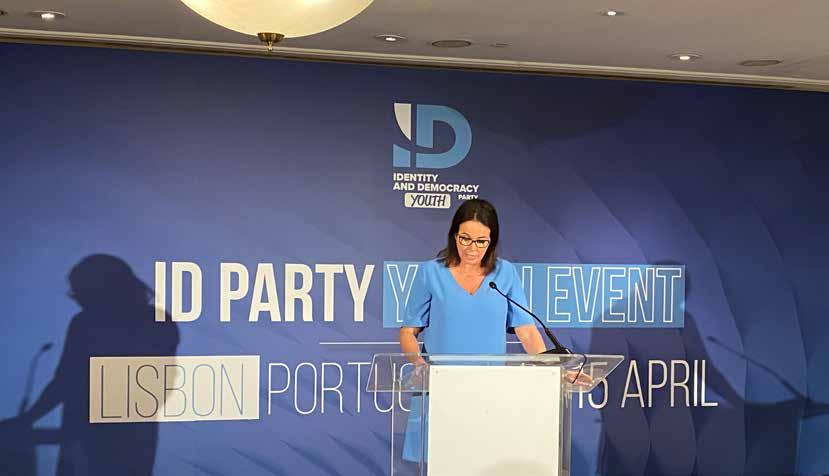
e young people from the ID party’s member parties are certainly not lacking in talent, as illustrated by the fact that Rita Matias, who spoke during the rst meeting of the Young Patriots in October 2021 in Strasbourg, has since become a member of the Portuguese Assembly, which she showed to the visiting delegation. In this respect, the Portuguese Parliament is a testimony to the greatness of Portugal’s history, far from the cold con nes of the European Parliament.
van de FPÖ-jongeren.
Manon Bouquin, een jong Frans lid van Rassemblement National, ging terug naar de basis: «We hebben een gemeenschappelijk beschavingserfgoed te verdedigen, vergelijkbare waarden, verwachtingen te vervullen. Overal in Europa worden we steeds machtiger. Wij, de jongeren, zijn het speerpunt van de naties in de 21ste eeuw.”
Duidelijk bewijs dat het de jongeren die zijn aangesloten bij ID Partij niet aan kwaliteit ontbreekt, is het feit dat Rita Matias, die in oktober 2021 in Straatsburg het woord voerde op de eerste bijeenkomst van de jonge patriotten, inmiddels lid is geworden van het Portugese parlement, waar ze de aanwezige delegatie rondleidde. Ze toonde het Portugese parlement dat getuigt van de grootsheid van de Portugese geschiedenis, een schril contrast met de kille omgeving van het Europees Parlement.
According to Filip Brusselmans, a young Flemish parliamentarian, there is no doubt that Western society is in decline: “ is decline has been slow in recent years, but it is gradually gaining momentum. Our nation states are rapidly losing their sovereignty. Look at the collective debt at European level or the Black Lives Matter demonstrations, which are in fact iconoclastic and an attack on our tangible and intangible heritage.”
Questioning how to tackle this decline in his speech, Filip Brusselmans, who was born in 1997, which makes him a millennial, targeted young leftwingers, describing them as noisy and fast becoming the thought police of political correctness. He cited as examples “the American youths who
Voor Filip Brusselmans, een jong lid van het Vlaams Parlement, bestaat er geen twijfel over dat de westerse samenleving in verval is: «Dit verval is de laatste jaren langzaam geweest, maar het neemt geleidelijk toe in omvang. Onze nationale staten verliezen snel hun soevereiniteit, kijk bijvoorbeeld naar de collectieve schuld op Europees niveau of de Black Lives Matter-demonstraties, die in feite deel uitmaken van de beeldenstorm en de aanval op ons materieel en immaterieel erfgoed.»
Filip Brusselmans, geboren in 1997 en dus een millennial, vroeg zich af hoe het verval bestreden moest worden en richtte zich in zijn toespraak tot de jonge linksen, die hij omschreef als ‘luidruchtig’ en tot de gedachtenpolitie
Filip Brusselmans (Flanders): “ e only way to save the West from its downfall is to take a good hard look at ourselves!”
naar onszelf te kijken! «
Belang Jongeren», op de jongeren-bijeenkomst van de ID Partij
advocate safe spaces, or the British National Union of Students which is primarily concerned with denouncing Islamophobia.”
e young man appeals to the silent majority of his generation, which tends to be more right-wing than most people think, especially in Europe, citing polls such as those showing that the Rassemblement National is the most popular party among 18 to 30-year-old voters, or those that show that 40% of young men aged 14 to 24 intend to vote for his party, the Vlaams Belang.

e Flemish MEP is calling for an awakening: “ e only way to save the West from its downfall is to take a long hard look at ourselves, and to restore the strength and vitality of our own civilisation. Stop immigration, integrate Muslims, crack down on crime, but above all restore our own dignity, which is the cornerstone of Europe’s greatness. is change of mentality is the task facing right-wing youths.”
van de politieke correctheid. Hij nam als voorbeeld de Amerikaanse jongeren die pleiten voor veilige zones of de Britse National Union of Students die zich vooral bezighoudt met het veroordelen van islamofobie.
Het jonge parlementslid deed een beroep op de zwijgende meerderheid van zijn generatie, die rechtser is dan de meeste mensen denken, vooral in Europa, en haalde peilingen aan zoals die waaruit blijkt dat Rassemblement National de populairste partij is onder kiezers van 18 tot 30 jaar, of die waaruit blijkt dat 40% van de jonge mannen tussen 14 en 24 jaar overweegt om te stemmen op zijn partij, het Vlaams Belang.
Hij riep op tot een nieuwe start: «De enige manier om het Westen van zijn ondergang te redden is naar onszelf te kijken en onze eigen beschaving haar kracht en vitaliteit terug te geven. Immigratie stoppen, moslims integreren, misdaad hard aanpakken, maar vooral onze eigen waardigheid herstellen waarmee we Europa groot hebben gemaakt. Deze mentaliteitsverandering is de taak van de rechtse jeugd.”
samenleving beschouwd kan worden».
Martin Malasek (Czech Republic): “I am convinced that a society that engages in censorship and limits freedom of expression cannot be seen as a democratic society.”
Martin Malasek says he is saddened by what has happened in Europe in recent years, and admits to being amazed at the direction in which we are slowly but surely being led by unelected liberal leaders and members of the European Commission, as well as by some heads of state.
Martin Malasek zegt bedroefd te zijn over wat er de afgelopen jaren in Europa is gebeurd en is verbaasd over de richting waarin we langzaam maar zeker gestuurd worden door ongekozen liberale leiders en leden van de Europese Commissie, alsmede door sommige staatshoofden.
Martin Malasek (Tsjechische Republiek):
«Ik ben ervan overtuigd dat een samenleving die censuur toepast en de vrijheid van meningsuiting beperkt, niet als een democratische
Martin Malasek, voorzitter van de Svoboda a prímá demokracie
jeugdafdeling, op de jongerenbijeenkomst van de ID Partij

e youth leader of Svoboda a Prima Demokracie says “We have seen how sovereignty, history and national identities have been trampled on. is trend is clearly growing in the United States, and various associations, such as BLM and political correctness have made it illegal to teach children about certain historical gures and events. You can already see such practices emerging in some European countries. is is the madness surrounding the Green Deal. I am even tempted to call it sheer fanaticism on the part of political leaders and activists of all kinds.”
e restriction of freedom of expression and the introduction of censorship on social media are of great concern to this young man, who believes that “a society that engages in censorship and limits freedom of expression cannot be seen as a democratic society.”
However, Martin Malasek will not be intimidated and intends to ght for the survival of his identity by tackling the roots of the problem: “Due to the illegal immigration of people from the Middle East and Africa, our culture, traditions and customs are under attack. I have nothing against people who come to an EU country, become integrated, start working and paying taxes. ey adapt to their new country. What I do not like is the in ux of illegal immigrants from countries that are culturally and religiously incompatible with the Judeo-Christian culture on which the whole of Europe is still based.”
is Czech citizen believes it is impor-
Voor de leider van de jongeren van het Tsjechische Svoboda a Prima Demokracie (SPD) «hebben we gezien hoe soevereiniteit, geschiedenis en nationale identiteiten met de voeten zijn getreden. We zien deze trend in steeds sterkere vorm overwaaien uit de VS. Verschillende verenigingen, zoals BLM, en de politieke correctheid hebben het illegaal gemaakt om bepaalde historische guren en gebeurtenissen te onderwijzen. Ook in sommige Europese landen zie je dergelijke praktijken al. We zijn getuige van de waanzin rond de Green Deal. Ik zou deze waanzin zelfs regelrecht willen omschrijven als fanatisme van politieke leiders en activisten van allerlei slag. «
De beperking van de vrijheid van meningsuiting en de invoering van censuur bij sociale media baren de jongerenvoorzitter zorgen. Hij is van mening dat «een samenleving die censuur toepast en de vrijheid van meningsuiting beperkt niet als een democratische samenleving beschouwd kan worden».
Martin Malasek is echter niet onder de indruk en wil vechten voor het voortbestaan van zijn identiteit door de wortels van het probleem aan te pakken: «Door de illegale immigratie zien we dat onze cultuur, tradities en gebruiken aangevallen worden vanuit het Midden-Oosten en Afrika. Ik heb niets tegen mensen die naar een EUland komen, integreren, gaan werken en belastingen betalen. Ze passen zich aan hun nieuwe land aan. Wat mij echter niet bevalt, is de toestroom van illegale immigranten uit landen die
tant to defend countries under attack by the European Union: “You may remember that the European Union prosecuted countries like Hungary simply because it was protecting its borders against the in ux of illegal immigration by building a fence on its borders. Or, for example, that Matteo Salvini was taken to court simply because he refused to let a boat full of illegal immigrants into an Italian port. e results of this welcoming policy implemented by Europe’s top leaders can be seen, for example, in France, where several Christian churches have already been burned down.”
cultureel en religieus onverenigbaar zijn met de joods-christelijke cultuur waarop heel Europa nog steeds gebaseerd is. «
Voor de Tsjech is het belangrijk om landen te verdedigen die door de Europese Unie aangevallen worden: «U herinnert zich wellicht dat de Europese Unie achter landen als Hongarije aanging omdat het land zijn grenzen beschermde tegen de toestroom van illegale immigranten. Ze bouwden een hek aan hun grenzen. Of neem Matteo Salvini die voor de rechter wordt gedaagd omdat hij een bootlading illegale immigranten niet in een Italiaanse haven had toegelaten. De resultaten van dit gastvrije beleid van de Europese leiders zijn bijvoorbeeld te zien in Frankrijk, waar al verschillende christelijke kerken in brand zijn gestoken.»
All eyes are now on Ukraine and Russia, but we cannot forget China’s growing power and its willingness to use it. China is ready to play the longterm game and will not stop until it is the world’s leading superpower. Jaak Madison MEP, a board member of the Identity and Democracy party, chose to shed some light on the Chinese regime, and how it views the world around it.
In order to raise awareness on the subject, he organised a conference in the presence of Peter Kofod, Danish member of the European Parliament, to present the latest study by Dr Märt Läänemets, one of Estonia’s leading experts on China. He focused on China’s strategic narratives, the history behind them, and the manner in which the Chinese state uses its soft power to achieve its goals.
e evidence seems straightforward: China is a growing threat to the
Momenteel zijn alle ogen gericht op Oekraïne en Rusland, maar we mogen de groeiende macht van China en zijn bereidheid die te gebruiken niet vergeten. China is klaar om het lange spel te spelen en zal niet stoppen totdat het ‘s werelds leidende supermacht is. Europees parlementslid Jaak Madison, lid van het bureau van de partij Identiteit en Democratie, wilde enig licht werpen op het Chinese regime en hoe het de wereld om zich heen ziet.
Om dit onderwerp meer onder de aandacht te brengen, organiseerde hij in aanwezigheid van Peter Kofod, Deens lid van het Europees Parlement, een conferentie waar de meest recente studie van een van Estlands meest vooraanstaande China-deskundigen, Dr. Märt Läänemets, gepresenteerd werd. Hij richtte zich op China’s strategische verhalen, de geschiedenis erachter en hoe de Chinese staat haar soft power gebruikt om haar doelen te
stability of the world and is trying to use soft power to achieve its objectives. e suggested answer is as follows: it is up to us to determine what China’s strategic narratives and stories are, and what it wants the world to believe.
With a growing military force and more ‘friends’ at global level, the situation could undergo a radical change in the future. It would have the capacity to take its plans to the next level, just by biding its time. When that day comes, the author of the study says it is important to be ready: “ e best time to act against China was yesterday, the second-best time is today. For this to happen, more people need to understand the Chinese mentality.”

bereiken.
Het punt is duidelijk: China is een groeiende bedreiging voor de stabiliteit van de wereld en probeert soft power te gebruiken. Het voorgestelde antwoord is: het is aan ons om te zien wat China’s relaas en strategische verhalen zijn en wat het de wereld wil doen geloven.
Met een groeiende militaire macht en meer ‘vrienden’ op wereldniveau zou de situatie in de toekomst een radicale wending kunnen nemen. China zou de capaciteit hebben om zijn plannen naar een hoger niveau te tillen – gewoon wachtend op het juiste moment. Wanneer die dag aanbreekt, is het volgens de auteur van de studie belangrijk om er klaar voor te zijn: «De beste tijd om tegen China op te treden was gisteren, de tweede beste tijd is vandaag. Daarvoor moeten meer mensen de Chinese mentaliteit begrijpen.”
Opening of the parliamentary session in Montpellier: is the European Union moving from federalism to imperialism?
Under the late summer sun in Montpellier in Occitanie, the French Members of the European Parliament of the Identity and Democracy party met at the instigation of JeanPaul Garraud, leader of the French delegation of the ID group.
e focus was on the policy pursued by the European Union authorities and led by the Commission, and the clear desire to complete the transition from a federal Europe to an imperial one. Is this an overly provocative presentation? Certainly not, if we are to believe the various speakers.
e news over the past two years has even been used as a pretext to
Het was onder een late zomerzon dat de Franse leden van het Europees Parlement van de partij Identiteit en Democratie op aansporing van Jean-Paul Garraud, leider van de Franse delegatie van de ID-fractie, bijeenkwamen in Montpellier, in de regio Occitanië.
In het vizier ligt het beleid van de instellingen van de Europese Unie, onder leiding van de Commissie, en de duidelijke wens om de transformatie van een federaal Europa tot een imperiaal Europa voort te zetten. Is dit een provocerende titel? Zeker niet, als we de verschillende sprekers mogen geloven.
“De Europese Unie, van federalisme naar imperialisme?”
Gilles Lebreton, Frans lid van het Europees Parlement, lid van de ID Partij

Dominique Bilde, Frans
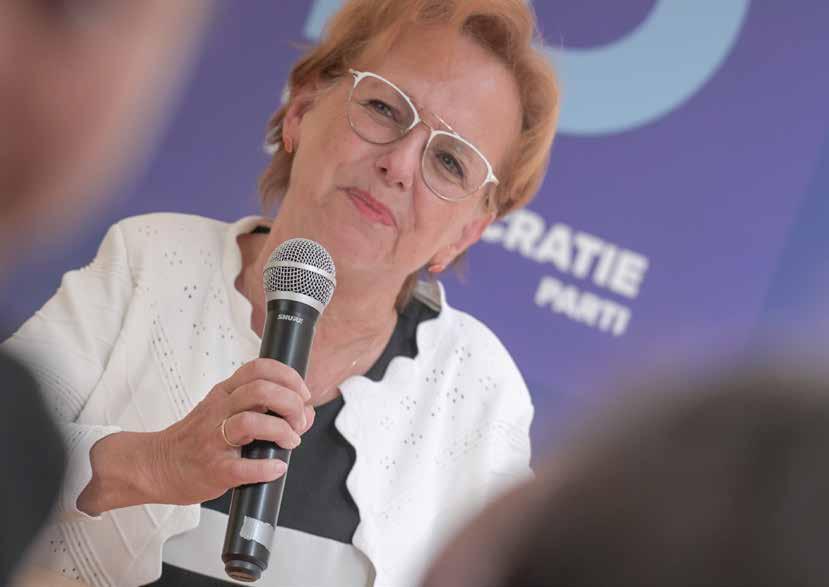
lid van het
Europees
Parlement, lid
van de ID Partij
further the pro-European agenda, as Jean-Paul Garraud pointed out in his introduction: “ e EU has used the health crisis then the war in Ukraine to assert its power over the member states. e people of these nations must resist or they will be driven out of existence!”


Having reminded his audience that Jean Tulard de ned the empire by its desire for expansion, a centralising system of organisation, peoples framed by a common political and scal framework and the belief in a ‘superiority of essence’ (a common destiny and ideology), the MEP believes that the European Union has all of the above.
For Jean-Paul Garraud, “the EU has changed since it laid down its rst treaties and gone on to adopt a totalitarian style, as evidenced by its attitude towards Hungary, which is now spearheading the resistance. is abuse of power goes a long way as the EU does not hesitate to work towards changing people’s mindsets to impose its ideology. is central issue must be addressed in order to prevent the EU from gaining control over the sovereignty of member states.”
De actualiteit van de afgelopen twee jaar was zelfs een voorwendsel om de pro-Europese agenda te bevorderen, zoals Jean-Paul Garraud in zijn inleiding opmerkte: «De EU heeft de gezondheidscrisis en vervolgens de oorlog in Oekraïne gebruikt om haar macht over de lidstaten te laten gelden. De volkeren moeten zich verzetten als ze niet willen verdwijnen! «
Het Europees parlementslid herinnert eraan dat Jean Tulard het keizerrijk gede nieerd heeft aan de hand van zijn expansionistische wil, een centraliserende organisatie, volkeren die omkaderd worden door een gemeenschappelijk politiek en scaal kader en het geloof in een superioriteit van soort (in een gemeenschappelijke bestemming, in een ideologie), en meent dat de Europese Unie deze elementen inderdaad combineert.
Volgens Jean-Paul Garraud «is de EU sinds de eerste verdragen geëvolueerd en heeft zij een totalitaire stijl aangenomen, zoals blijkt uit haar houding tegenover Hongarije, dat nu het voortouw neemt in het verzet. Dit machtsmisbruik gaat ver want de EU aarzelt niet om mensen op andere gedachten te brengen zodat ze haar ideologie kan opleggen. Deze
Jean-Paul Garraud en Marie Dauchy, Franse leden van de ID Partij Philippe Olivier, Frans lid van het Europees Parlement, lid van de ID PartijContinuing the discussion on the objectives of the EU, Gilles Lebreton, French Member of the European Parliament and member of the Identity and Democracy party, used a comparison to remind listeners that “American-style federalism is a system of shared sovereignty. is is not the EU’s project, which is why the concept of imperialism is better suited to what the EU wants.”
For Philippe Olivier, an elected European member of the ID party, “the European Union is a new form of empire dominated by an omnipotent oligarchy (...) e USSR fell after 72 years. e European Union is now 70 years old. We must work to awaken national consciences.”
And perhaps, as political science professor and writer Yves-Marie Adeline predicts, the EU will collapse: “ e European Union cannot be a state, and this is a source of real frustration for it. An empire cannot endure when it is supplanted by a nation. Every empire has collapsed, and the EU certainly will too.”
prangende kwestie moet daarom aangepakt worden om te voorkomen dat de EU de soevereiniteit van de lidstaten overneemt.»

Met betrekking tot de doelstellingen van de EU wees Europees parlementslid Gilles Lebreton er aan de hand van een vergelijking op dat “federalisme naar Amerikaans model een systeem van gedeelde soevereiniteit is. Dit is niet het project van de EU en daarom is het begrip ‘imperialisme’ beter geschikt voor wat de EU nastreeft.”
Voor Philippe Olivier, eveneens Europees verkozene van de ID Partij, “is de Europese Unie een nieuw soort keizerrijk dat gedomineerd wordt door een almachtige oligarchie (...). De USSR viel na 72 jaar uiteen. De Europese Unie bestaat nu 70 jaar. We moeten het nationale geweten wakker schudden.”
En misschien, zoals professor politieke wetenschappen en schrijver Yves-Marie Adeline voorspelt, zal de EU instorten: “De Europese Unie is niet in staat een staat te zijn. Dat is een grote frustratie voor haar. Het keizerrijk kan niet blijven bestaan als de natie het overneemt. Alle keizerrijken zijn ingestort, de EU zal dat zeker doen.»

nationale consensus bestaat».
In the words of Miklos Szantho, Executive Director of the Center for Fundamental Rights: “Hungary is being punished for standing rm on a core set of traditional and common-sense values around which there is a broad national consensus”.
«Hongarije wordt gestraft omdat het blijft vasthouden aan een reeks traditionele waarden en gezond verstand waarover een brede
Speaking at the opening of the parliamentary session in Montpellier, Miklos Szantho, director-general of the Hungarian think tank Center for Fundamental Rights, went into greater detail on the links between his country and the European Union, going straight to the heart of the matter: “ e spirit of civilised debate has practically disappeared in the European institutions that seek to federalise the EU. A new kind of harebrained imperialism has taken root, embodied by people like Manfred Weber, Guy Verhofstadt, and the other radicals in the European Parliament and EU bodies.”
For this dedicated patriot, the way the EU and Hungary are handling mass migration, the Covid pandemic, the security challenges and their subsequent consequences, the energy crisis caused by ill-advised and illconsidered sanctions, are the opposite. e European elites are therefore believed to be driven by a postmodern ideology, while Hungary, on the other hand, acts in a reasoned way, always focusing on practical solutions: “ e progressives then use their almost absolute control over the mainstream media to give the impression that they are acting on the most pressing issues, such as male pregnancy for instance, while ignoring the real interests of Europe and Europeans, like having enough energy to heat our homes and run our industry.”
Going back to the principle of conditionality, that is the procedure of Article 7 activated against Hungary and Poland, Miklos Szantho believes that it is an excellent example of what has gone wrong with the progressive liberal current: “It is obvious to all that targeting conservative Christian governments in Europe is a political action poorly disguised as a legal action.
Miklos Szantho, algemeen directeur van het Center for Fundamental Rights, een Hongaarse denktank, ging dieper in op de banden tussen zijn land en de Europese Unie en kwam daarbij direct tot de kern van de zaak: «De geest van het beschaafde debat is praktisch verdwenen in de Europese instellingen die de EU willen federaliseren. Daar heeft een nieuw achterlijk imperialisme wortel geschoten, belichaamd door mensen als Manfred Weber, Guy Verhofstadt en de andere radicalen in het Europees Parlement en de EU-organen.»
Voor deze overtuigde patriot staat de manier waarop de EU omgaat met massamigratie, de covid-pandemie, de veiligheidsuitdagingen en de energiecrisis en de gevolgen daarvan volledig haaks op wat er zou moeten gebeuren. De Europese elites worden gedreven door een postmoderne ideologie, terwijl Hongarije juist bedachtzaam handelt en zich altijd richt op praktische oplossingen: «De progressieven gebruiken vervolgens hun bijna absolute controle over de mainstream media om de indruk te wekken dat ze iets doen aan de meest ‘urgente’ kwesties, zoals zwangerschap van mannen, terwijl ze de echte belangen van Europa en de Europeanen negeren, zoals voldoende energie hebben om onze huizen te verwarmen en onze industrie te laten draaien.»
Terugkomend op het conditionaliteitsbeginsel, ofwel de procedure van artikel 7 die is ingeroepen tegen Hongarije en Polen, meent Miklos Szantho dat dit een uitstekend voorbeeld is van wat er mis is gegaan met de progressieve liberale beweging: «Het is voor iedereen duidelijk dat het aanpakken van conservatieve christelijke regeringen in Europa een politieke daad is, slecht vermomd als een juridische
Miklos Szantho, uitvoerend directeur van het Centrum voor de grondrechten, Hongaarse denktank

e rule of law is usually described as a neutral element of European values, but in recent years the rule of law or democracy has acquired an ideological meaning: broadly speaking, a democracy must be liberal or nothing. In this sense, it is used as a bludgeon to conduct a witch hunt against those who dare to step out of the liberal line.”
For the director general of the Hungarian think tank, the EU is o cially working towards an “increasingly narrow Union”, which in practice “merely accelerates its disintegration”. is European Union has changed since Hungary joined, he says, disillusioned: “After living under Communist oppression for 40 years, we are conscious of Europe’s value, of the importance of returning to Europe, and we will work tirelessly to restore our continent’s true values, to revitalise the community’s faith, culture and civilisation (...) A strong Europe requires strong member states, not an all-powerful Brussels.”
daad. De rechtsstaat wordt gewoonlijk beschreven als een neutraal element van de Europese waarden, maar de laatste jaren is gebleken dat de rechtsstaat of de democratie een ideologische inhoud heeft: in feite moet een democratie ultraliberaal zijn, anders is het helemaal geen democratie. In die zin wordt ze misbruikt als een knuppel om een heksenjacht te voeren tegen degenen die uit de liberale lijn durven te stappen.”
Voor de algemeen directeur van de Hongaarse denktank werkt de EU o cieel aan een «steeds hechtere Unie», die in de praktijk «de desintegratie alleen maar versnelt». Deze Europese Unie is niet de Unie waartoe Hongarije is toegetreden, zegt hij gedesillusioneerd: «Na 40 jaar onder communistische onderdrukking te hebben geleefd, kennen wij de waarde van Europa, van de terugkeer naar Europa, en wij zullen ons onvermoeibaar inzetten om ons continent zijn ware waarden terug te geven, om deze gemeenschap van geloof, cultuur en beschaving nieuw leven in te blazen (...) Een sterk Europa heeft sterke lidstaten nodig, geen almachtig Brussel».
Markus Buchheit, Duits lid van het Europees Parlement
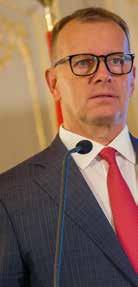
Jordan Bardella, Frans lid van het Europees Parlement, lid van het bureau van de ID Partij
On the 25 October, the Identity and Democracy party held a special seminar on rising energy prices at the prestigious Maison des Polytechniciens in Paris.


While introducing the discussions, Mathilde Androuët, member of the European Parliament’s Committee on the Environment, Public Health and Food Safety, recalled the importance of independence in this respect: “In the energy crisis, as in the environmental crisis, only one tool is valid, and that is sovereignty. e countries that come out on top are those that are deeply committed to defending their sovereignty.”
For Fabien Bouglé, author of books on the subject of wind and nuclear power, there is no doubt that “the energy crisis and rising prices precede the war in Ukraine”. In fact, the war has merely worsened a situation caused
De partij Identiteit en Democratie heeft op 25 oktober ll. in het prestigieuze Maison des Polytechniciens in Parijs een speciaal seminarie gehouden over de stijgende energieprijzen.
In haar inleiding tot het debat herinnerde Mathilde Androuët, lid van de commissie milieubeheer, volksgezondheid en voedselveiligheid van het Europees Parlement, aan het belang van onafhankelijkheid op dit gebied: «In de energiecrisis, net als in de milieucrisis, geldt slechts één instrument: dat van de soevereiniteit. De landen die als winnaar uit de bus komen, zijn de landen die hun soevereiniteit met hart en ziel verdedigen.”
Voor Fabien Bouglé, auteur van boeken over windenergie en kernenergie, lijdt het geen twijfel dat «de energiecrisis en de stijgende prijzen zijn voorafgegaan aan de oorlog in Oekraïne». In feite
by the energy choices made by the European Union and governments.
Among them, the German government is in the ring line because of Angela Merkel’s choice to close nuclear power plants, making Germans dependent on… Russian gas.
Boris Kollar, President of the Slovak National Council and leader of Sme Rodina, a member of the ID party, was a special guest at the conference and spoke of solutions adopted by the government to curb the crisis for the bene t of the working classes.
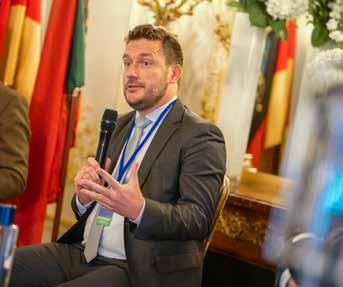

While bringing the seminar to a close, Jordan Bardella returned to the energy blunders made by the French governments and the European Union, entangled in their ideological certainties: “ rough their failure to act and their useless chatter, European leaders are directly responsible for the industrial evisceration of the continent, which will lead to the economic collapse of our countries and the social decline of our peoples.”
heeft de oorlog een situatie die het gevolg is van de energiekeuzes van de Europese Unie en haar regeringen alleen maar verergerd.
Een van de regeringen die in het vizier komt, is de Duitse, met Angela Merkels keuze om kerncentrales te sluiten, waardoor Duitsers afhankelijk worden van... Russisch gas.
Boris Kollar, voorzitter van de Slowaakse Nationale Raad en sterke man van Sme Rodina, lid van de ID Partij, was een speciale gast op de conferentie en sprak over de maatregelen die de Slowaakse regering heeft genomen om de crisis te beteugelen, ten gunste van de arbeidersklasse.
Ter afsluiting van het seminarie kwam Jordan Bardella terug op de energiedooltochten van de Franse regering en de Europese Unie, verstrikt in hun ideologische zekerheden: «Door hun passiviteit en nutteloos gepraat zijn de Europese leiders rechtstreeks verantwoordelijk voor de industriële vernietiging die het continent treft en die zal leiden tot de economische ineenstorting van onze landen en de sociale achteruitgang van onze volkeren.”

Tijdschrift uitgegeven door de partij Identiteit en Democratie
Identité et Democratie Parti
75 Boulevard Haussmann - 75008 Parijs - Frankrijk
SIRET-nummer: 82340044500024
Intracommunautaire BTW: FR26823400445
info@id-party.eu
Voorzitter van de partij Identiteit en Democratie: Gerolf Annemans
De partij Identiteit en Democratie wordt gedeeltelijk ge nancierd door het Europees Parlement en is als enige verantwoordelijk voor deze publicatie.
Deze publicatie is niet bestemd voor de verkoop.